#the layers of meta of it all ...
Explore tagged Tumblr posts
Text
Falin who cares too much and too little - analysis
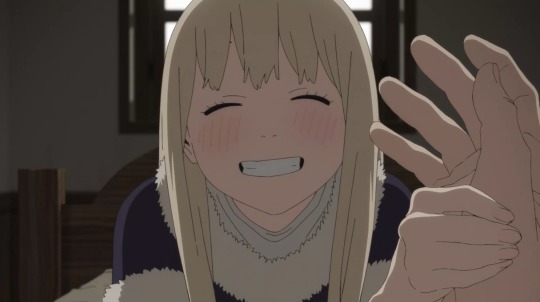
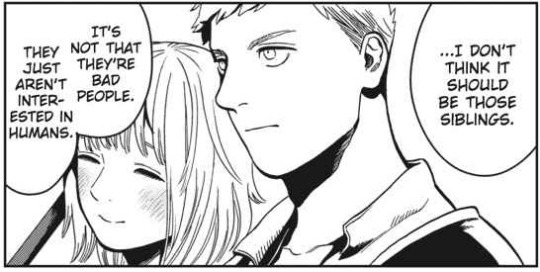
Been stewing on Falin thoughts for a while, I know I have an interpetation on her that differs from many but I’m jumping into the fray. I think there’s a lot to be said about what we do see of Falin. This shorter Falin analysis I made is heavily encouraged prior reading. This analysis mainly explores her complex relationship with caring and so it’s sort of structured in two halves, with Faligon at the crux of it all.
Falin cares too little :
A lot of people assign Falin a people pleasing mindset and I… Don’t agree. We never see her care at all about people in her town or at the academy not liking her.
We do see her worrying about what people think of her… ONCE. And Laios comforted her, told her they didn’t matter and she should be proud of herself. She latched onto that hard. That’s why this scene was so important to be included during the dragon fight, relationship-defining; it’s always been them against the world. She grew to not care what others thought, to only focus on her close loved ones. No one else matters.
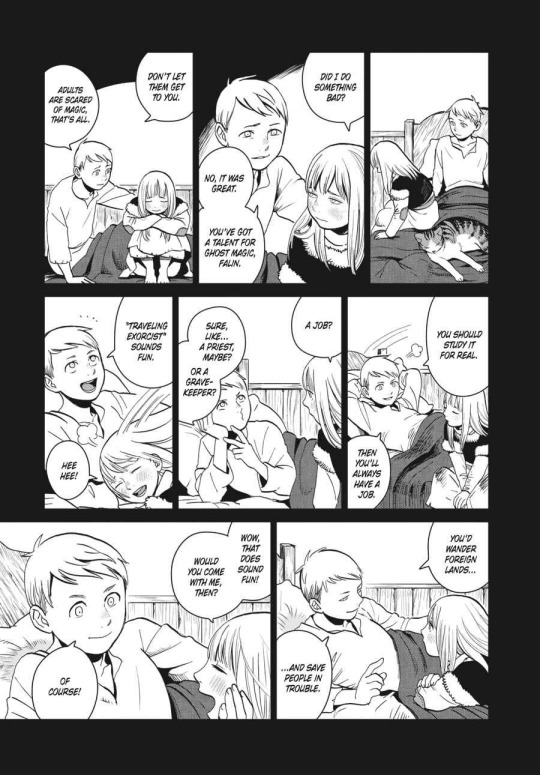
Laios’ words were her world. Her older brother who taught her how to feel comfortable with herself, who told her, you’re great, others are the ones in the wrong to not see that, I’ll always be with you, always be there for you. Older brother who always made great plans, who always knew more, who was better at wrestling to name the dogs, who she has always idolized. Laios who always spoke of traveling the world, to which she always said she wanted to follow. And she would, she’d follow him even if it meant leaving the academy and all she knew behind, she’d follow him to the ends of the world, and that’s what she did.
She didn’t care about showing to her classes or keeping up such appearances, she doesn’t even think of toning down her jumping into bushes when Marcille recoils, etc. She acts like an obedient pawn often, to her parent’s directives and then following Laios around no matter what he decides to do, but I don’t think the motivation is people pleasing, rather it’s being with & caring for her loved ones, and her go-with-the-flow attitude enhances the impression. Not that it’s as simple as that, mind you, but let’s talk about this for now.
Falin is perceived as selfless because we, the audience, have our perspectives revolving around the main people in her life (Laios, Marcille). They’re the ones she’s devoted to and people who care about her back a lot too, but to people like her classmates or the towspeople she probably must have seemed like someone who didn’t care about the people around her or her surroundings a lot, who just went on alone and did her own thing.
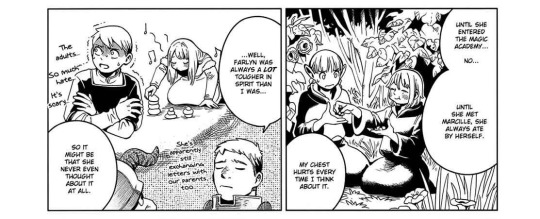
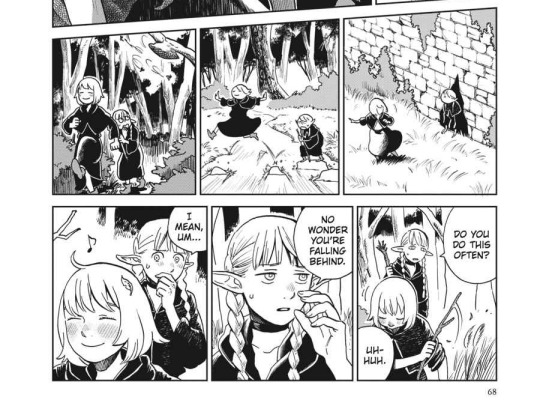
What matters to Falin? From what place does her kindness come from? Is a part of her keeping up appearances? And I think that’s the point, the horror of Faligon as well, that we can’t tell just how in control Falin the person is as the chimera (because we are shown that she’s in there, we just don’t know at what degree), that we don’t know her enough to be able to tell when she’s at her most genuine, her most raw. That even if you do settle on none of her being present as Faligon, we have to at least consider it, consider that she may be able to do something like this and have a part in it, brutal and uncaring. That even the lenses we see her through, the people who love her, may be unreliable.
And this is what’s very interesting about her too, she truly is so idealized by people around her as a saint. She’s so good and kind and caring to everyone etc etc etc. Laios, Toshiro and Marcille all see her as the paragon of goodness in the world. More cynical characters like Namari and Chilchuck have more layered opinions on her, the latter finding her somewhat unnerving because he can’t read her well. But then with that one flashback scene we see that… Her priorities are intensely focused on Laios and Marcille, she doesn’t care all that deeply about anyone other than them (+ maybe her parents). The rest of the party is in the same danger here but only Laios and Marcille who she’s speaking to get the special ,ention, and if they don’t cross her mind then of course she’d be ready to sacrifice strangers through a risky teleportation. That doesn’t make her not kind or caring!! Just that greater good isn’t exactly her priority. Any means is alright if the end result is her loved ones safe, it usually takes the form of healing and caring, but we see she’s ready to fight and make dangerous calls too. To me there’s this aspect to her that she isn’t as pure and magnanimous as everyone thinks she is, both in-world and interestingly enough meta wise as well, and there’s something interesting to that.
People pleasing implies a need to be liked, needs for the motivation to be that. A yes-man, etc. But if we analyze Falin, her general kind, smiling demeanor is more a matter of passivity I yhonk. Conflict avoidance is easier, so she’s friendly and hopefully things’ll be smooth sailing. It’s easy to be kind to classmates even if they act wary and rude if you don’t care about what they think either way. Of course she prefers good things happening to people over bad things, she is genuinely kind, but I think people tend to assign her a very grand altruistic way of life when to her the motivation is pretty self-centered. She doesn’t do what she does because she loves them, but because she loves them.
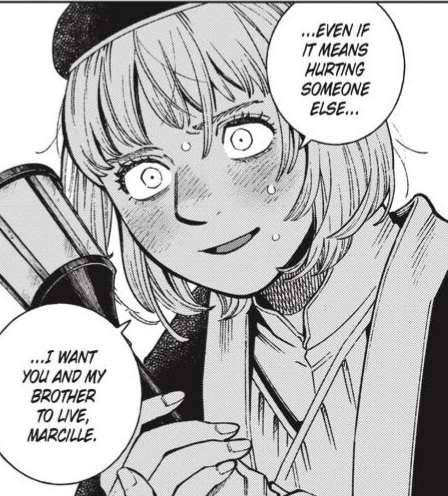
One situation that’s interesting to dig into for her way of thinking, and what I’m trying to get at, is Shuro’s proposal to her. I’ve seen people saying she hesitated because she didn’t feel comfortable saying no even though she wanted to, "I can’t say no, I don’t want to hurt him", something that sounds sensible and familiar, but it’s actually canon in the Adventurer’s Bible that the reverse was the case, that she didn’t feel comfortable saying yes. Because the offer was tempting, but it’d have been a loveless agreement on her end. And it makes sense she’d want to say yes too, like we see with the Toudens, marriage is very much a political strategical economical thing in their village, there’s even a bit on it on Laios’ Adventurer’s Bible profile about dowries, and both siblings were engaged very early. They lived poorly for a long time, it’s an enticing idea to marry rich, to have not only yours but your brother’s needs met forevermore easily, which at one point in their careers was their main worry and goal. Why shouldn’t she accept a life of leisure and wealth handed to her by a lovely friend?
So her hesitance was "yeah that’s convenient for me, but where it’s everything to him and heartfelt I’m able to be detached because I don’t care about it that much… Can I do that? I’m not reciprocating, not saying yes in the way that matters. Can I do that to him?" Very caring even though it’s not what you’d expect, isn’t it?
And central to my analysis, where I’m going with this is, I feel like that’s the thing with her character, that she doesn’t feel as strongly as she "should" sometimes, or feels a different way than she "should", or at least that she feels that way and others say she does. She didn’t mind suddenly leaving the academy, leaving Marcille behind and not seeing her for 4 years. She acted like it was no big deal that she sacrificed herself after getting resurrected after the red dragon fight. And in both those cases it upset the people around her greatly that she didn’t seem to get why it was such a big deal, didn’t seem to care about how they’d experienced her choices.
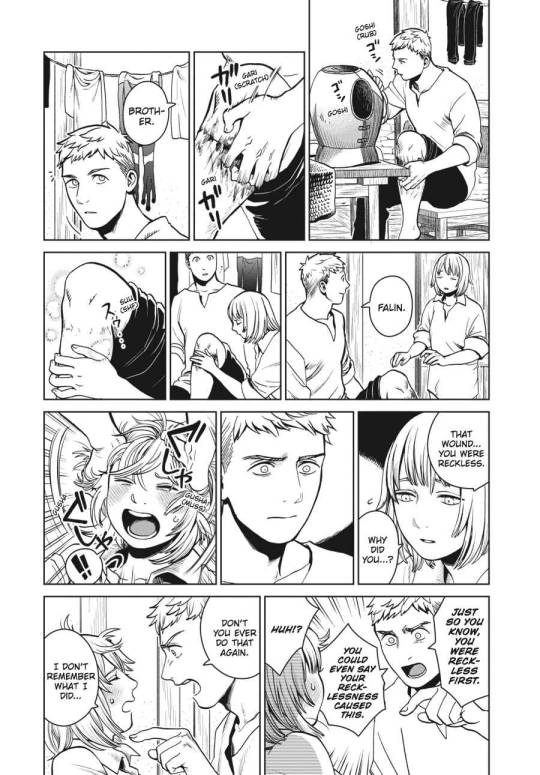
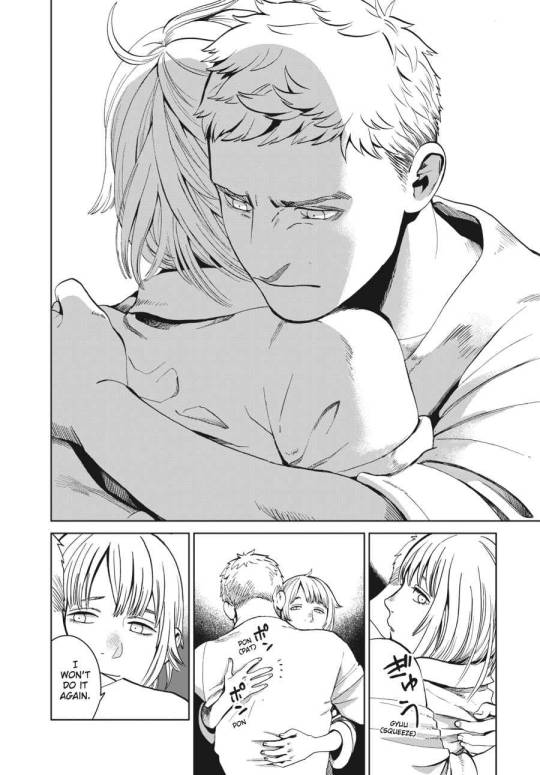
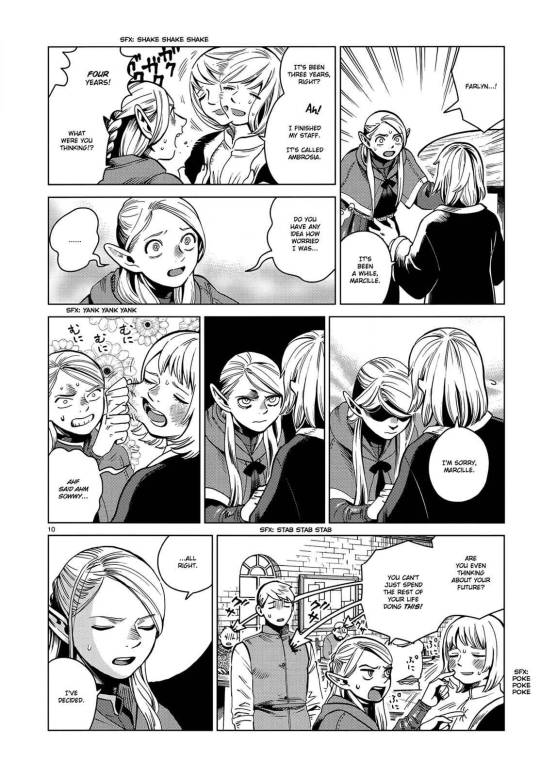
So it’s a tendency… And it’s not that she doesn’t care, it’s just that the way she measures what’s good for the ones she loves isn’t the same as what they themselves think it is (like Laios and Marcille not wanting to be apart from her). It’s an overt but quiet kind of care, it’s doing things like following them around and making sure they bathe and have a meal, even if that means she has to be dragged into misery too.
So yes she probably would know "not caring enough/the right way" is one of her perceived flaws, and that informs how she tries to handle her response to Shuro’s proposal. Her not wanting to accept like her first gut instinct, is because she’s thinking about reciprocity, about if it’d be right to go into this knowing that they have different priorities and she might not be able to keep up with the type and amount of emotions he wants/expects from her. And that’s a big part of her character isn’t it, having expectations pushed onto her. Her trying her best, but in her own way that may seem odd or even unfeeling. Not unlike when she exorcised the ghost as a kid too, unblinking and matter-of-factly, and not seeming to understand why people stared the way they did.
Even though she answered his proposal only post-canon, she’d been pondering it for a while even pre-canon and the Adventurer’s Bible explanation was released midstory, so I’m hesitant to assign her much growth about her hesitation and what I went on above, since she still didn’t react "right" with Laios after the red dragon fight (even if she apparently doesn’t remember sacrificing herself) and put herself in that situation in the first place. She hasn’t finished her arc on that flaw of hers is what I’m saying, she for sure still has it, but I certainly think her thoughts on Shuro’s proposal shows awareness, both of herself and social.
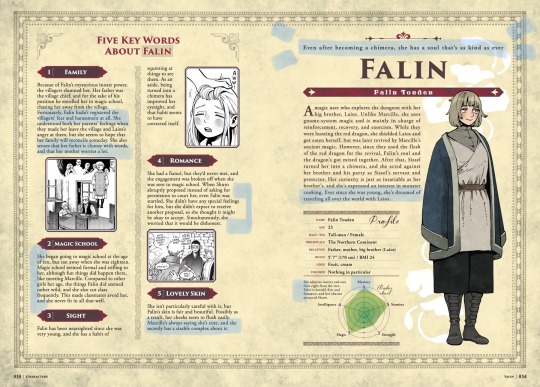
And awareness is a big analysis key word with Falin, especially here it can be hard not to conflate not caring with not knowing. How socially aware is she? It’s rather layered, because canonically she wasn’t aware of her ostracization in her hometown at all, and we’re not sure if she knew Shuro was interested in her before he proposed, but she generally seems more socially aware than Laios. She tags along on his caravan job to make sure he isn’t being mistreated (though doesn’t ask he get a salary), she catches social faux-pas more easily like in the genderbend magic mirror omake with Shuro, and interestingly enough she’s very good at empathizing with her parents and understanding their perspective. We see when she’s worried about Marcille coming that she does know about propriety and how appearances shape impressions. Being a chief’s daughter must at least have taught her a thing or two on that front.
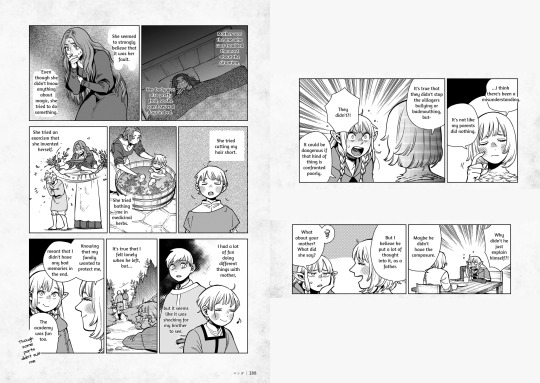
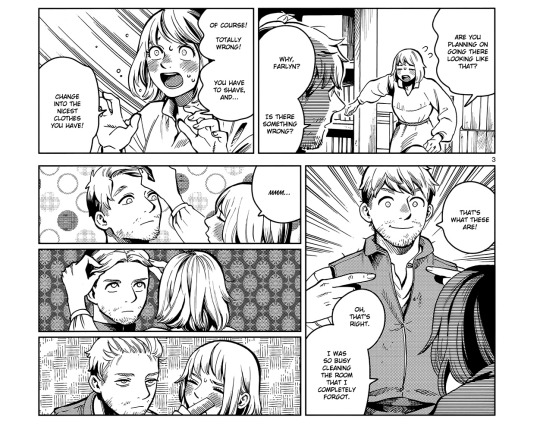
She never stands up for herself, but when it comes to defending others she worries, strategizes and explains.
And this sort of understanding is part of why I think she’d notice the expectations pushed onto her like I was saying earlier, notice how she makes people feel when she’s careless. But if she changes anything about herself in response to noticing is for her to choose, and generally I think it’s a sort of inbetween of yes and no: that she becomes more complacent but also more reserved, complying but by hiding more of herself passively. She’s not sure wether to accept or reject Shuro’s proposal, doesn’t want to lead him on? She’ll just be taking a while to silently consider it, try to keep things as they are for the time being. The third, less conflicting option. She doesn’t feel heard by Marcille who keeps infantilizing her? Just bear with it. Retract yourself emotionally. Settle for it.
We see that when she was young she had a tendency to not read a room, and I think that’s here too. She doesn’t get why her nonchalance upset others but that doesn’t change that she doesn’t want them upset or hurt, so she tries, albeit in maybe a roundabout way. She always had a hard time deeply connecting with people, often keeping herself some amount of emotionally distant: erasing herself from the equation, from the two-way trade that relationships are and making it a onesided thing instead, where all their needs and emotions are directed towards her but she only lets out a bit of her own show. She takes everything upon her and deals with it and tries not to give others this same burden, though not on a conscious level, it’s just that she’s learned growing up that she doesn’t have much agency.
Like I went into with my analysis linked at the beginning, I think Falin is used to just taking what she can get and not asking for more, when it comes to social bonds. She’ll take spending time with her mother no matter what it is they do, she’ll follow Laios to the graveyards and stick by him even when he’s pushing her away (because he doesn’t want her borrowing his book or "No copying!" or such). Her father was always distant, cold and uncommunicative, her mother was considered sick from anxiety and the exorcism attempts were the main way they spent time together, at dinner tables there were only her and Laios. The dogs picked on her too even if she loved them— And so did the townspeople, maybe that being normal to her at home is why she didn’t notice the ostracization she suffered.
She’s always been the last to be asked about decisions or what she wants, never asked to play with at recess, neither her father or Laios asked before sending her to the academy or leaving the village. At home, in the hierarchy she was considered to be below the dogs by the dogs themselves, as someone they can disrespect. Dogs learn from example and behavior, so this means Falin must have been pushed around a lot, and that the family didn’t try hard to rectify the dogs’ misconception, likely worsened by Laios regularly wrestling with her as a competition.
So for example when Falin showed Marcille food, it was her way to implicitly ask to have lunch with her without voicing that question, without daring to take up space. Someone’s presence isn’t something you ask for, it’s something that’s bestowed upon you, you can follow them around but you can’t ask them to stay or to come with.
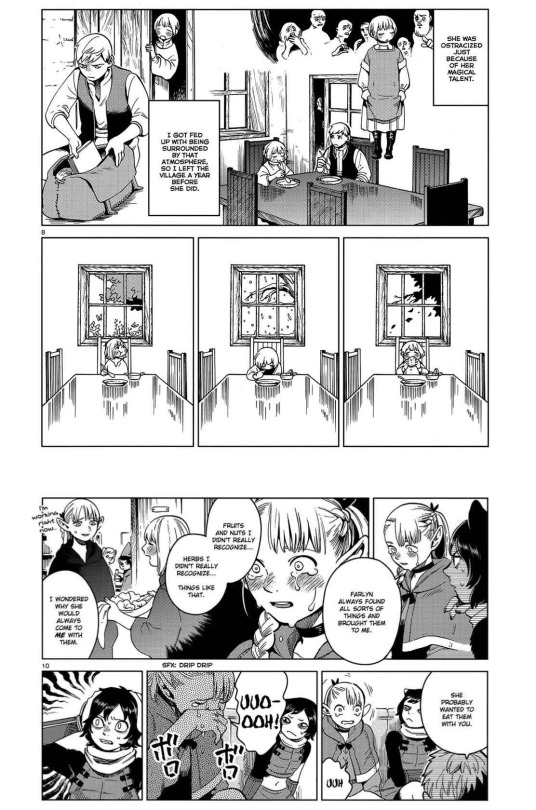
She’s used to her needs and wants not being listened to, so she’s learned to have less wants. Caring less about herself, caring less about other people beyond her safe zone, was a defense mechanism in part. She has a sense of learned helplessness too, like how when Marcille came to take her away from Laios, even though she didn’t want to leave with Marcille it felt so determined and unshakable to her that whatever Marcille decided Falin would have to comply with.
And still, it’s the "marrying you would be awfully convenient if it wasn’t that I’d feel guilty for not loving you back, the way you wanted me to when you proposed to me" and the "I don’t regret leaving the academy and leaving you behind without goodbyes but I’m sorry that you’re so much more upset about it than me". It’s the guilt of not loving people back the way they want to be, with the same intensity or fervor.
It’s the autism it’s the aroace of it all, it’s the emotional stunting and confusion but the pit in your stomach telling you you did something wrong again. The no object permanence even for people you love even for 4 years, it’s the feeling like you’re somehow at fault for someone having fallen for you and not knowing what to do with any of it. I’m not joking btw it isn’t uncommon for autistic people to not see their close friends for a long while, not having missed them all that much and for that to be really hurtful for the other if they notice/ask about it. "Hiii bestie! Oh umm you’re uh more emotional about this than I expected, hopefully you won’t feel alienated by me not feeling as intensely about it…"
So… Yeah. I think she thinks of things and relationships in a different way than most people, and beyond "good things happening to people is good" I don’t think she actually cares about people all that much. I’d argue that Laios shows more desire to connect with others and make relationships. And just like with Laios and his own issues with humans, that doesn’t mean her kindness is a lie or ungenuine or worthless! It just means that like, well it’s pretty straightforward really, she’s not all that social and doesn’t see casual bonds as meaning all that much and whatnot. She does want to see people happy, but it’s not as much like… A conviction or goal. She’s too laser focused on a select few people. "It’s not that they’re bad people, they just aren’t interested in humans."
And sometimes it feels like people get defensive about Falin in a meta way too, like if you ever so much as imply Marcille isn’t her whole world or that she isn’t the kindest soul out there then you’re saying she doesn’t care at all or she’s evil. And that’s actualy exactly the sort of vibe I wanted to get through with my analysis above here actually haha, that she does care and she is kind but it’s not in a way that’s quantified or understood in a way that makes people feel comfortable. In a way, that makes people feel insecure because they don’t have the same logic as her, don’t show love the same. And I think this is another stellar depiction of autism, of parts of it that feels unpalatable to many, if I’m making sense. The fandom idealizes her as well, which isn’t uncommon or surprising for the character embodying the trope of the perfect beloved to rescue.
And disclaimer, as I said in the tags I feel like the details of Falin are pretty vibe based when it comes to analysis, there’s absolutely a valid angle where she does super care about everyone always, feel free to disagree with me on the overarching angle of my analysis. There’s enough supporting evidence to tip the balance either way I think, and the reason I’ve chosen this angle is I feel it’s more compelling for the themes in Dunmeshi of idealization and being different, of desires vs wants, and because I think it neatly ties up Falin’s character arc as I’ll go over throughout the next section…
So.
Not feeling as much as she should. And……. Is this not Faligon pushed to the max?
You can’t tie down a dragon. As the chimera, she gets to just not care about everyone else and be on her merry way.
Part of it I think is finding comfort and freedom in the mindlessness, in not having the burden of feelings and connections and a consciousness (despite still ending up seeking those in a stranger, Thistle). Like when she’s dead in the purgatory as well, she gets to just… Hang around and do whatever. Similarly to when she played in the forest instead of going to class in her academy days. That’s what freedom and peace of mind looks like to her. Why she decides to roam post-canon, if only now with the goal to find herself instead, with her mind in tow and somewhere to go back home to.
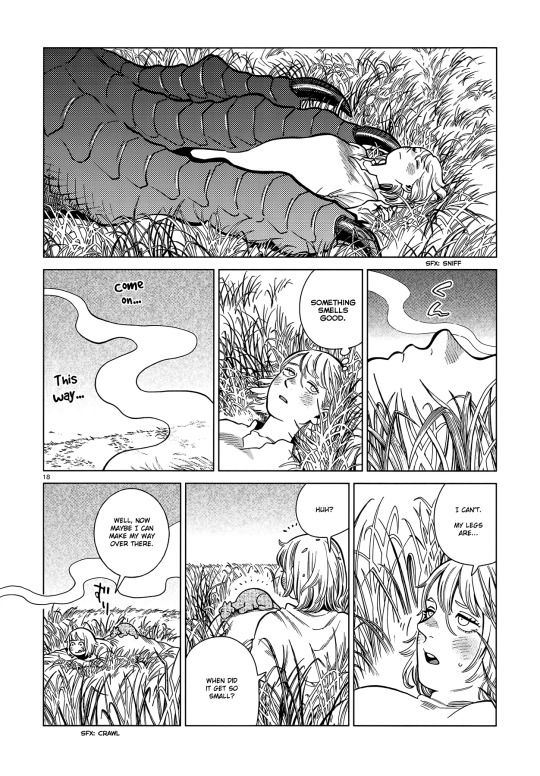
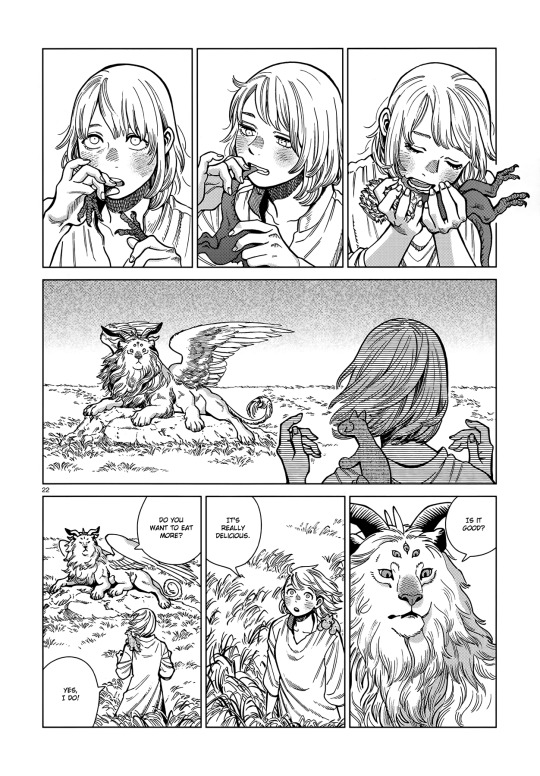
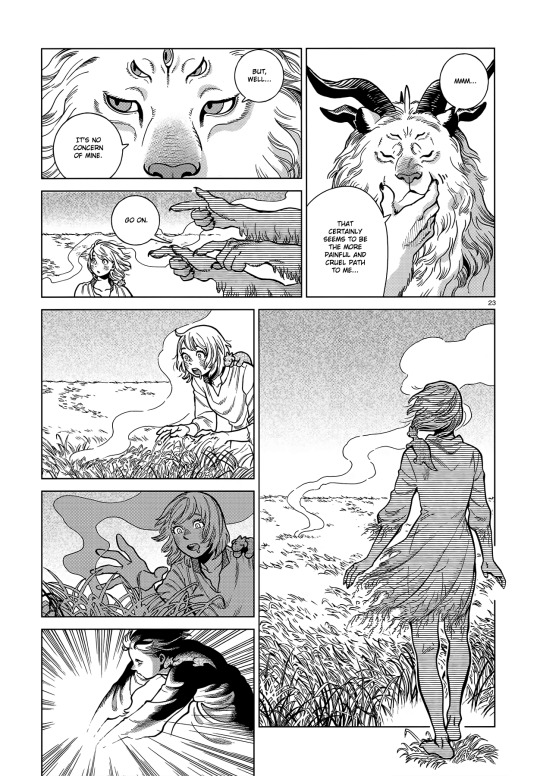
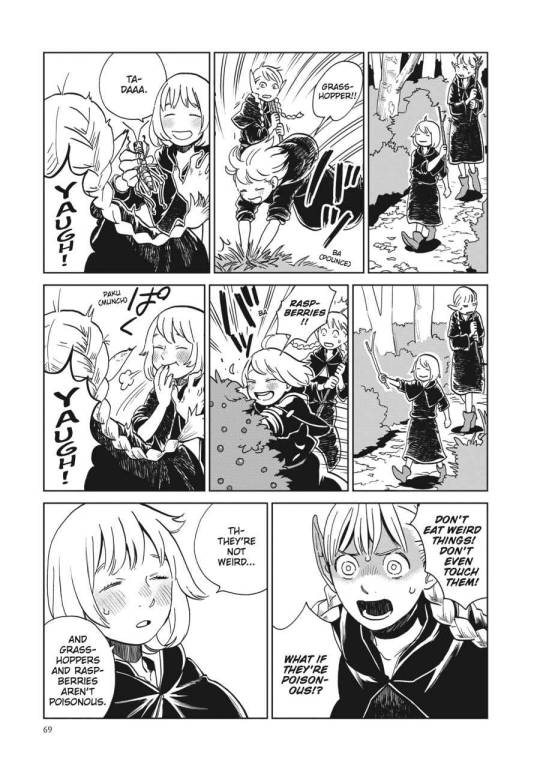
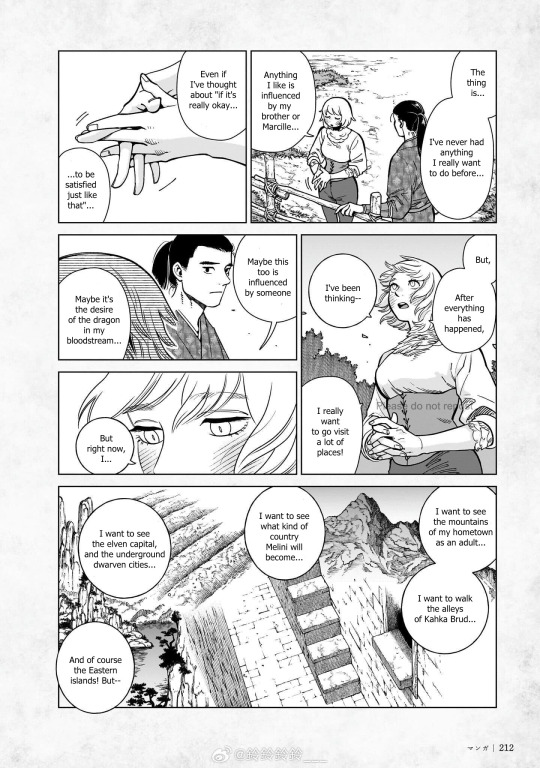
There’s excellent analytic framing out there about how of course, Dungeon Meshi has a big theme of grief and letting go, and… Falin was always a symbol narratively, idealized by characters and often underconsidered by them despite their love. It was Falin’s choice to sacrifice herself for Laios, she thought it was worth it, knowing that it would be her end. Her resurrection and the process of it intertwining her soul with a dragon’s wasn’t done with her consent, and the subsequent opening it gave her to become a chimera puppet. She’s stripped of her agency consistently, and so… It’s very noteworthy that the final choice, of wether to go back to life or to stay dead, in that purgatory scene, was up to her. And she chooses life, but I do think about her in those fields and how at home she seemed there. Peaceful, by herself in a vast calm expanse she could explore, free.
Personally, I think freedom is Falin’s own subconscious selfish desire. And though to us becoming the chimera is obviously a shackle, I think it felt like freedom to her somewhat, too.
And if you think I’m going wildly off the rails here I want to talk about Laios’ wish of becoming a monster. And to be clear before getting into it, being mentally a monster is absolutely a big part of the appeal for Laios, it’s something that’s consistently referred to, something especially pointed out in the werewolf monster tidbit with Lycion. Right panel is from that, but left panel is from the extra with Izutsumi where Lycion talks about suppressing souls in a beastkin body, the human or the beast soul.
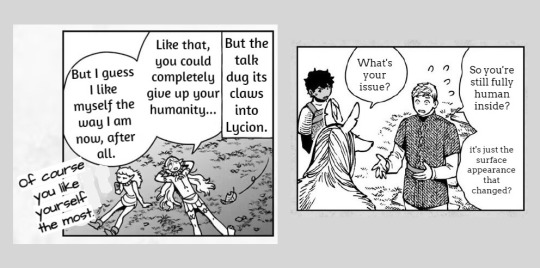
Finding comfort and freedom in being mindless, less sentient, less aware? While being unaware in her hometown might have saved Falin a lot of heartache although perhaps stunted her emotional growth, it’s always been Laios’ curse.
Actively, through his choices, he seeks to grow closer to people, to form deeper bonds, to understand and be undertood, but… On a deep seated level, what he desires is to leave humanity and civilization behind. He has an irrational hatred for humans, born from the trauma of ostracization, being different, being beaten up and rejected consistently through his life. Running away from problems is easier. He wants to be free from being a social animal from a social species who has deemed him the black sheep, he thinks it’d be simpler to just leave it all behind, people and his own humanity. At its core, to Laios becoming a monster is a power fantasy, a coping daydream of "if only I could be strong enough to never be hurt again, the power to destroy anything I want, the power to go somewhere better, if only it was possible for me to never feel hurt again. If only I could be someone, something, that can never be hurt". "If there’s someone you don’t like, you can gobble ‘em up in one bite. If you could fly, you’d be able to leave this village right now." It’s a childhood fantasy, from a deep sense of being misplaced and a desire to be able to stand fearless, thinly covering up resentment that Laios represses.
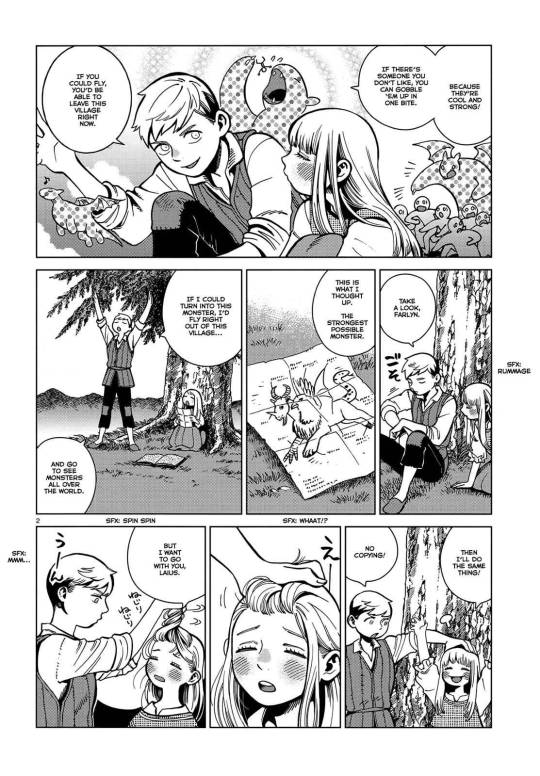
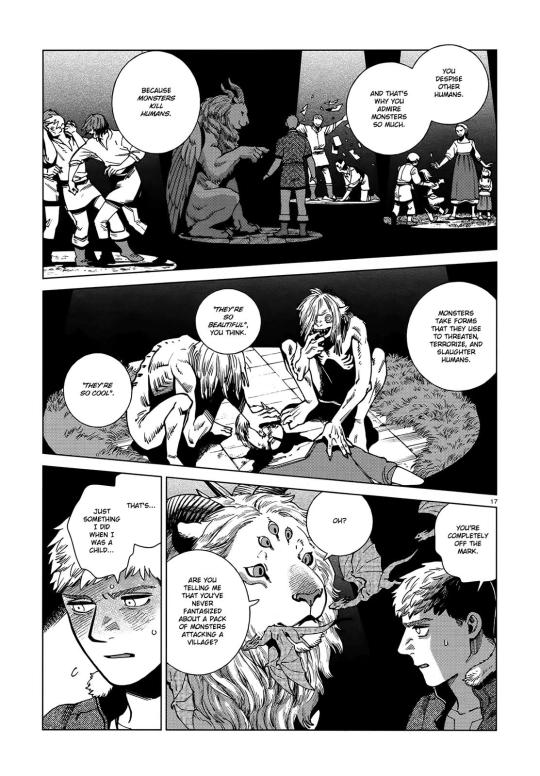
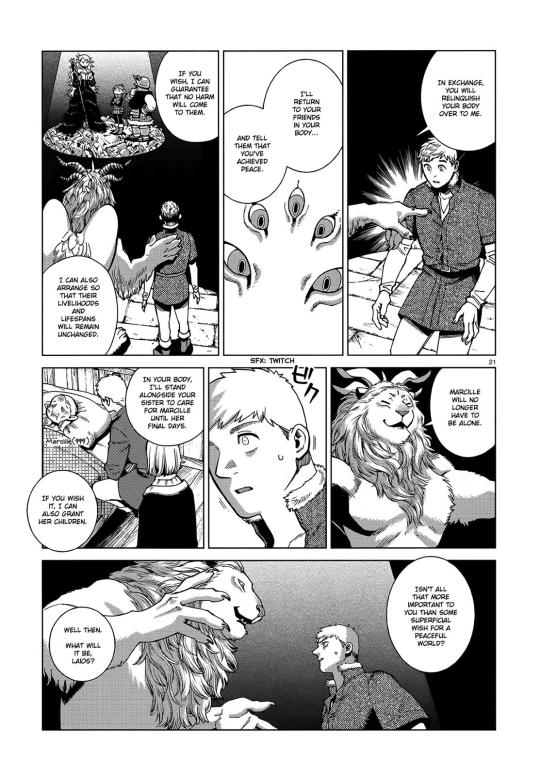
But you’ll notice, when the Winged Lion is enticing him in the last page, even now with his lifelong wish of becoming a monster on a silver plate, he still cares about his friends. He still has that sense of responsibility to his friends, doesn’t want to leave knowing they’ll be in danger and alone. The offer that his friends may be left unharmed is already good, but Laios also visibly flinches when the Winged Lion offers to specifically care after Marcille and rid her of her biggest fear. Laios’ care runs that deep. Not unlike with the succubus, he resists temptation until he gets reassured that everyone will be okay. But see, what he desires isn’t to stand alongside Marcille until her last days, it isn’t to stay and see how well his friends will live, it’s to go. It’s to leave. It’s to fly away, a monster both in body and mind. He wants to be free from caring here, wants to not have to worry about his friends, wants to just go do his own thing, but for that he needs to feel safe in the belief that said friends will be safe even without him being there to see it, because despite everything else he cares, he does. It’s again that dichotomy about caring and wishing you didn’t, or not caring and wishing you did.
In the end, it’s Falin who achieves that wish. Both by becoming a chimera during canon, and by going traveling post-canon. In the latter, being both free of human relationships as something chaining you while still being uplifted by them, by the knowledge that there are people out there you love and that love you. It’s a theme that can also be connected with Marcille, because she gets anxious over people she loves getting out of her sight, worrying they’ll get themselves killed, that time is passing while they’re away from her. But before she can get to the point where she can both have her freedom and being uplifted by her social bonds, regaining both her individuality and her connections, she has to get a taste of just one at a time. Before they can find balance in her life, she has to see what it’s like to have what she’s never had on its own. Unapologetic freedom, and power.
No one can blame you for not caring enough or caring right if you’re a fricking dragon!!!! You make the rules when you’re a beast and you can just… Fly away. From anywhere, from anything. And if a dog bites you you can just crush it. Instead of being pushed around by the dogs because you’re at the bottom of the hierarchy, you’re now at the top, the one with the power to be heard and do what you want without consequences.
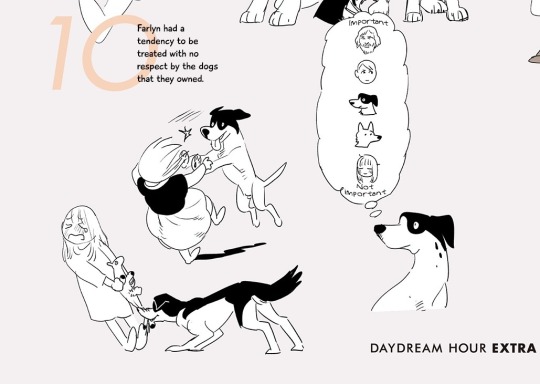
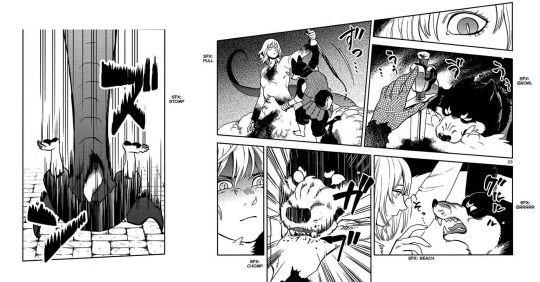
I think she’s on autopilot. I think she’s on autopilot a lot of the time, even before being a chimera, and it’s partly why her will is so weak compared to regular dragons. (Again, read my shorter analysis.) It’s familiar to slip back into the role of following someone around unquestioningly. And that’s what is weaponized when she’s a chimera, that instinct she’s been nursing all her life to unconditionally support, defend and follow someone. Only now, that someone doesn’t matter in itself, only the symbol of it. She doesn’t mind, either way is fine. Her will is weak after all, because she’s trained it to take as little place as it could.
Falin cares too much
She spends all her time caring for Laios and Marcille alternating that none of her care and emotional energy is left for others, including herself. So she had to get relieved of all of that for a bit, becoming the chimera so she could reset and recenter and remember that she, too, indeed, is there and an important part of her own life.
So you’re probably seeing the duality I’m talking about here, Falin is very self-sacrificial but for specific people in ways that they often don’t recognize or appreciate. She cares but selectively, both in people, putting all her eggs in the same baskets, and in the ways she cares after them. She doesn’t care a lot, but when she does she cares a lot. Falin doesn't have a lot of earthly attachments, but when she does, they're her world.
In canon her arc, especially post-canon, is to grow beyond Marcille and Laios. Her caring for her close loved ones held her back from looking after her own self-fulfillment needs. And this is what I mean when I say she cares too much; she could gain from caring more about the world besides Laios and Marcille, both lands wise and people wise. She cares too little, but her arc centers her flaw around caring too much instead. Her pitfalls that Kui highlight over the course of the story, while of course her selflessness is appreciated for how she saved Laios and everyone, on a personal level is shown to be self-effacing and damaging. She’s undermined by Marcille, without the courage to voice her thoughts and wants, she would dedicate her whole life to Laios. And I mean, it’s text, in the response to Shuro’s proposal extra no less. And she’s so laser focused on her most loved people that she’s fine with being callous and risking others’ lives, even.
Post-canon, she needs to leave to find herself, away from them.
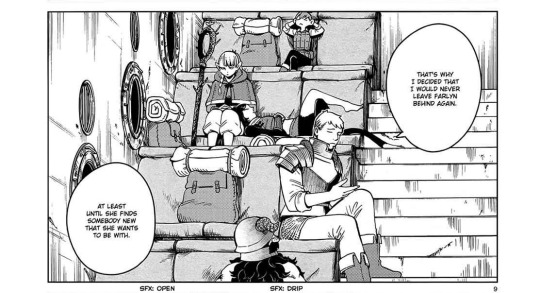
Herself. What if she wants to just be with herself for a while.
And this is me reaching but I feel like, not unlike Izutsumi who learns to feel this sense of never being alone, always having someone on your side what with having two souls, the dragon in her would make her consider herself more. She finds it easier to care after other people after all, and in the purgatory fields sequence she takes care to bring the bit of dragon left with her… Not unlike with Izutsumi, having two souls forces you to think about your identity and figure yourself out. Besides being this sort of duo now, where if she wants to care after herself she can channel it to that other side of her too… In meta dragons are symbols of greed, and I think the bit of dragon would push her to want more and listen more to her desires, primal and self-serving as they might be. The dragon soul which warped her human body with feathers and draconic features, her image of perfection marred, her weirdness externalized in a way that’s not palatable. But she doesn’t care, about if her appearance is palatable for most people, she hasn’t for a while now, and that’s great.
Notes & nuance
I’m struggling with the structure of this post, making my points organized, concise and strong at once. It’s difficult to make any statement without going "things are generally like this, but there’s this time that this contradicting thing happened too" or "it’s ambiguous enough that you should just follow my interpretation for the time of this analysis" haha, so this is the pit where I put all the stuff that wouldn’t fit well in other places but are interesting for Falin’s character. This section is pretty separate from the main thesis of the post, it’s just more Falin observations. The post has reached the 30 pics limit so I can’t just pull it up whenever it’s relevant but I really encourage scrolling up to read the stuff I highlighted in her Adventurer’s Bible profile if you haven’t already.
I think with the shy-looking loner type autistic kid archetype, and knowing she didn’t seem to mind others ostracizing her, it’s easy to lose sight of how she was by no means an unemotional child. In all the bits we see of her as a kid she’s bursting with energy and emotions. Canon confirms Laios leaving the village did affect her and make her lonely and she cried a lot, too. She may not be social in the traditional sense, but she was clingy with her brother, and she also never was all that shy about who she was, wearing her heart on her sleeve.And okay. Okay okay okay. Speaking of appearances. About what I said of her not caring about what people think of her, even seeming defiant with the caravan leader… There’s one istanxe of her caring actually, and it’s about how her face blushes easily. I remembered it as being because Laios’ said it and as I rambled Laios’ words are her world, but actually it’s ambiguous. It’s only Marcille imagining up this scenario where Laios says Falin looks weird because of it, there’s no evidence Laios said or thought that at any point. And on the other hand…
Her Adventurer’s Bible says: "5, Lovely Skin. She isn't particularly careful with it, but Falin's skin is fair and beautiful. Possibly as a result, her cheeks seem to flush easily. Marcille's always saying she's cute, and she secretly has a sizable complex about it." The phrasing makes me think the complex she has over her blushing might have developed because of Marcille more than Laios. "Marcille's always saying she's cute, and she secretly has a sizable complex about it." It could be related to how Marcille gets swept away and infantilizes her, calling her cute wanting her to wear cute feminine outfits etc. Again this feels like it relates to Falin’s struggle to be seen for who she is and what she wants to be seen as, her struggle to be recognized, having ideals and perspectives pushed onto her. Here Falin is insecure over her blushing implicitly because she doesn’t like being called cute over it, but that’s not how she wants people to see her. She doesn’t want Marcille to always see her as her 10 years old adorable friend. Like if your friend said you had puppy energy, it can be flattering, but it can also make you insecure.
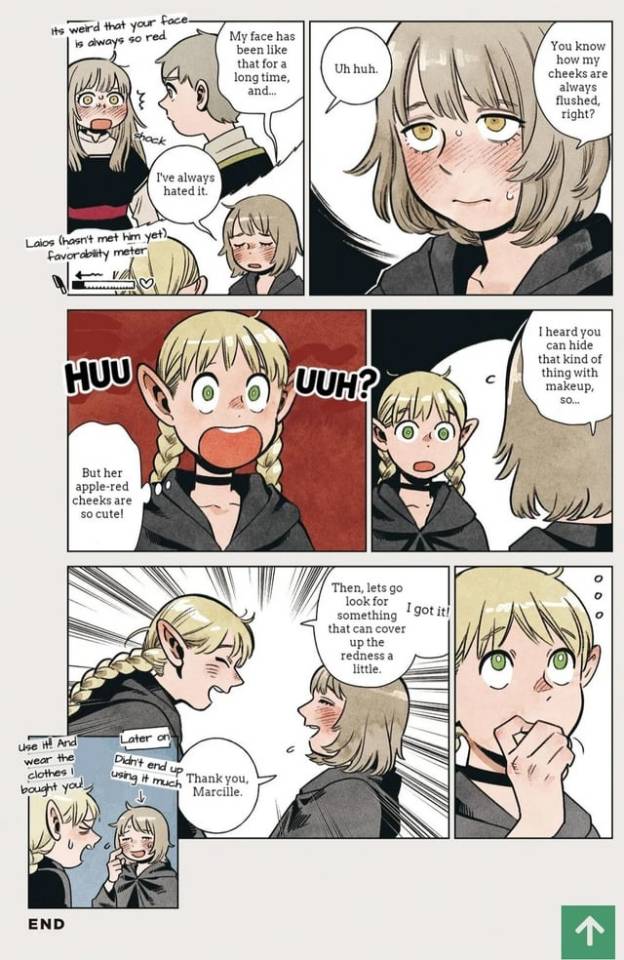
Here’s a link to what I mentioned about her being uncomfortable wearing feminine outfits. It does seem to be more about comfort than the aesthetic perse, to me. Interestingly the shirt & shorts don’t seem like they show much more skin than her beach outfit, so maybe it’s more about the shirt and shorts being tight-fitting. Like the skirts and heels they feel stifling. Again a bit with themes of freedom and not wanting an aesthetic pushed onto her. So yes just to reiterate, I think this is more about self-affirmation and how her identity and self-image gets shown to others, rather than wishing to hide parts of her body like her blushing etc for people pleasing reasons. Makeup was a way for her to appear how she wants to and feel more confident. It was a way to take control over her own image. She didn’t keep doing it, the narrator stating the process to be ‘troublesome’. Ultimately she still prioritizes her comfort, and it was a lot of recurring efforts to go through.
And on the topic of appearances… A friend once asked me: "Does she really hide herself or not? I keep thinking about "falin is herself first and foremost" (in her Adventurer’s Bible profile) it’s just so. Hmmmmmmmm... I just keep seeing people say she hides her real self from people when I feel like the issue is more about her charitable traits straying too far into becoming flaws but people around her dont realize that..."
Imo the thing is, I don’t think she hides her identity, but I do think she suppresses her individuality for others’ sakes if that makes sense. In the way that only post-canon does she allows herself to go see what the world is like, but that’s not personality wise it’s needs and wants wise. And I do feel like that’s the closest interpretation of canon, she says it herself she doesn’t know what she wants because everything she’s done was always about Laios or Marcille, but she doesn’t change her demeanor or personality for others. But she *will*, like, not ask for things she wants directly, like sharing lunches with Marcille at the academy, she suppresses her wants, doesn’t ask things from people and doesn’t hope for more, hope for better. I don’t think we ever see her actively repress her personality, except like what, being more laidback than enthusiastic but I do feel like unlike Laios with her it’s less ‘appearing stoic to fit in more’ and more ‘yeah i’ll just chill until I’m needed or something activates my enthusiasm’. To which said friend quoted: "to feel like you belong you need to be useful. when you can’t be useful the next best thing is being convenient."
And speaking of passivity… I want to speculate about Shuro’s proposal some more. Shuro and her got along well though we don’t know how much, or how often they hung out, she even saved him from a nightmare. Why did she take so long answering Shuro’s proposal? Was it an effort to preserve or was she really just that conflicted? Procrastination probably yes, but what is the core motivation of itl Considering she ended up saying no to travel the world instead, I don’t think it was as simple as ‘she wanted to say yes for convenience’. Logically it’s what would have been best, but it’s not what she wanted for herself, but it was and still is hard for her to even know what she wants. Probably, since like she states it was a great offer and she doesn’t think she’ll get proposed to again, it’s that self-effacing tendency that yes it’d be convenient and logical, and that makes her want to say yes even if her spirit isn’t in it, because if it’s convenient then that’s more important than her feelings on the matter. Man also… Obviously Marcille is very vocal about how she shouldn’t get with Shuro, but imagine how Falin’s whole perspective on marriage must have felt when her only friend ever is a Romantic with a capital R who gushes about idealized romances and grand gestures and True Love and doing things with fully pure feelings all the time.
AND speaking of passivity!!! How much Falin is "there" as the chimera, just how much she’s master of her actions, is left ambiguous and intentionally so imo, but she’s for sure there & influencing the dragon’s action to some degree. Having a dragon’s foot on her in purgatory that keeps her from moving for sure visualizes how it must have been like, but there’s Falin calling out to her brother Laios, there’s the kind attentions towards Thistle that are so Falin-like, and most explicitly there’s the Adventurer’s Bible stating "Even after becoming a chimera, she has a soul that's as kind as ever", which I honestly dislike, a fantranslation puts it as "Even as the chimera, her caring nature remains" and either way to me it feels like confirmation that it’s her giving those berries to Thistle. Now, wether or not she has the mental capacity of a chicken or something closer to human Falin, no clue, there has to at least be some kind of mind bond between monsters and the dungeon lord, compelling or forcing them to go along with orders, or calling her to him in distress like with the fight on the first floor. But yes, it’s interesting to wonder what it is that a Falin, with her kind soul but without her human mind, would willingly do. On her profile, she’s described as Thistle’s guardian and servant. The power dynamic between the two are very interesting, I already went into how it might have felt like freedom to her while being fake so I’ll reign myself in and just mention it again. She’s still at the heel of someone, only now it’s someone who doesn’t care about her back. Going from being cared for so strongly that it’s suffocating and they would defy death and the world for you, to being devoted to someone who has not one feeling about you besides your utility as a paw . She has all this care to give and to focus onto others and he has none to send back to her and I think that’s part of it. In a way, being left with only her own feelings and a void, without expectations or feelings or ideals pushed onto her, it might have been soothing in itself, and eye opening. But yes the way I think of it, her care for Thistle isn’t unlike the care she gives the ghosts.
Interestingly, the care she extends for the ghosts is sending their soul to a peaceful death, freeing them, of life and any earthly attachment. Take that as you will with the themes of freedom and burden of life and mind, immortality and becoming a warped version of who you were, and such and such.
But going back on the topic of connections and bonds for a bit, I think academy days Falin & Marcille is super interesting bc we’ve never really see Falin form a connection besides with Marcille and even that is kept pretty ambiguous. When was the point that Falin started seeing Marcille as a friend and seeking her out? When was the "I’ll lay down my life for you" point? I’m so fascinated by how she wanted to share lunches with Marcille but never truly asked, only made little "hey want this? I found it isn’t it cool?" gestures of showing things to her… It’s the only way she knows to ask, or maybe it’s the only way she feels comfortable to. In all the scenes of young Falin and Marcille Falin seems comfortable in her friendship with Marcille, but at the same time… I think we see Falin at her most insecure around Marcille, because she really does care about Marcille and what she thinks of her so much, and while Marcille is a bit of an unstoppable force tornado style (affectionate) Falin is something of a doormat. I’d usually say showing her berries was her earnest way to connect and be like "Hey bestie look at this! :]" , but there’s a real possibility that she was self-conscious and holding herself back.
Friendship and Marcille! Involving Laios into this too but, again with the autism thing of not showing you care in ways that others understand, Marcille being very overtly affectionate and clingy was so so soo important… Marcille keeping on hanging out with Falin and caring after her, and being undeterred/unbothered by Falin not always seeming like she cares all that much back in the conventional way, as in Falin acts nonchalant and a bit like she didn’t mind wether she was there with her or not during her outings to the cave dungeon. Caring and being clingy and so affectionate despite that in such a classic Marcille way is soo needed, because so often people will get discouraged by say, their friend not keeping in contact regularly/well, seeming disaffected or as happy-go-lucky as ever even if you haven’t seen each other in a while or when they’re alone, and yes there’s potential for a strong friendship there but someone like Falin won’t be committed enough to reciprocating attention the same way… I hope I’m making sense but yes this angle in particular strongly correlates to autism. And the way Marcille always initiates physical affection, both Toudens being awkward about initiating touch because they don’t know if that’s allowed, if they’re going about the social interaction the right way, if they’re allowed to ask that out of someone…
Another fun observation to make is about the 4 years Falin and Marcille spent apart. Marcille despite being of a long-lived race treated these 4 years of separation with more gravity than Falin did. Falin brushed it off very dismissively to say the least. But then you remember that the amount of time Falin and Laios didn’t see each other after he left the village was 8 years. Double the years, double the time. And that reminder makes Falin’s actions so starkingly understandable. Of course she wouldn’t see 4 years of separation as a long time if 8 years of separation with her beloved brother is her point of comparison. Of course she’d see it as worth it to leave Marcille for 4 years if it meant ending those 8 years instead, especially if she was worried about him (the reason why she followed him into his caravan job).
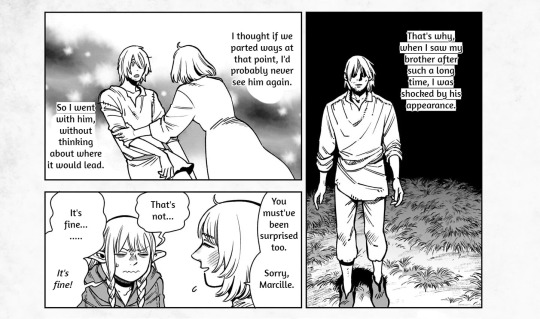
A friend always says that while Falin is the center of Marcille’s world, Laios’ is at the center of Falin’s, and I tend to agree.
It’s fun to think of how her career dreams had always been shaped by Laios, even when they were kids. Of course there’s how traveling the world began as a dream they talked about and shared, but there’s how he reassures her by listing cool jobs she could do like traveling exorcist, etc. And then of course, she gave up on her magic academy and career path to follow him and do odd jobs, etc etc.
I should go into the violence of Faligon more tbh, because I think there’s an interesting parallel to how she has no problem wacking things with a mace, wether a ghost when she was a kid or a walking mushroom as an adult. Something that often surprises fans when they remember, I don’t really want to get into the whole " Falin hates violence and hates seeing people in pain to an intense degree. ‘If you die do it somewhere where I can’t see’ style’ interpretation, it has some weight but on the whole I don’t vibe with the theory she has a particular aversion to violence, she seems to be fine resorting to it as much as any other adventurer as long as it isn’t needlessly against ghosts. And Falin’s sudden mace hits are fun to me too because it’s not her becoming a berserker when the need arises as much as her becoming active because something she cares about is threatened, and that brings her out of her passivity from 99% of the rest of the time. Thistle included. Falin always could be violent, she just dislikes senseless carnage. The Shuro party vs chimera fight is a bit ambiguous on it, because you can argue she only attached after being provoked, presumably offscreen as well while the ninjas went off to fight the harpies. Falin becomes the most active when she needs to protect someone, she has no qualms doing whatever’s needed for that, wether it be leaving the academy & Marcille without notice no matter the consequences or what her parents think, or teleporting the party, etc.
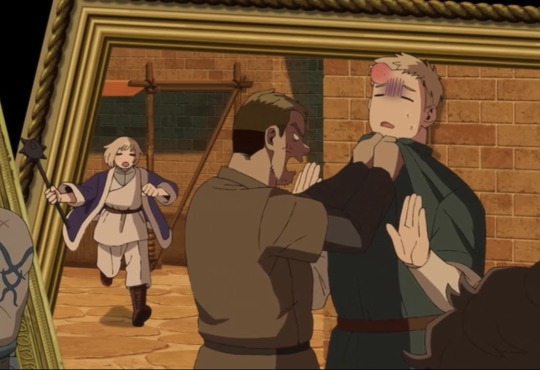
I’m working on a post specifically pointing out all the differences between Falin and Laios, but yes I think both of them selfishly desire freedom in different yet similar ways. Falin’s dark secret is "Ethics and risks are optional if it means I can protect those I love" like the teleportation, and Laios’ is "Ethics and risks are optional if I can be free of all this bullshit" aka humanity aka his wish with the winged lion.
Conclusion
Flighted birds have hollow bones. With freedom and wings there comes risks and sacrifices.
Tldr: Falin doesn’t care all that much, she’s very go with the flow. For example if someone hates her she doesn’t really care because that’d require her caring about what they think of her in the first place, and she only cares about her loved ones. She smiles, but it’s more a state of being rather than out of active goodness: she’s canonically very genuinely kind, but it’s more out of a general want for pleasantness than active care itself. She’s passive, and softspoken because that’s just how she seems, but she has no problem hopping into bushes or getting heated if something calls to her enthusiasm or calls for action and a hit of the ol’ mace. Her loved ones needing tending or protective is what makes her go from passive to active. That familiar autopilot mode of making someone the center of her world and following their every move is what made her so easy to be controlled as the chimera, even ferociously defending him with her life. Faligon is most interesting to me with the theme of freedom. She’s shackled to Thistle and out of her mind, but there’s also a sense of empowerment and freedom from expectations and society. She spends all her time caring for Laios and Marcille alternating that none of her care and emotional energy is left for others, including herself. So she had to get relieved of all of that for a bit, becoming the chimera so she could reset and recenter and remember that she, too, indeed, is there and an important part of her own life. There’s a way of caring after others that can be selfish, not unlike Marcille being overly coddling and not listening to Falin. In Falin’s case, I think it was so selfless that it ended up looping back around to erasing her sense of self. In losing sight of herself, that devotion becoming neither quite selfish or selfless but a fact of life and a state of nature, muddled by its lack of direction.
She’s sooo used to never being able to ask things out of others, you get the crumbs of affection and approval that others offer to you unprompted and that’s it don’t hope for more don’t ask for more. (Also reflected in how she follows her loved ones around without complain or personal opinions and how she’s not willing to rock the boat and affirm herself in her relationships like with Marcille during canon)
Falin cares so much, so much and so laser focused on her few loved ones that it blinds her and she loses sight of everything else, she ends up neglecting herself and the rest of the world. As Kui puts it, Falin is herself first and foremost. She just had to remember the importance of that.
-
I see her as an enneagram 9, which can be surprisingly accurate and fun to research through the lense of Falin. Excerpt below from this book, but like my god, good way to put it
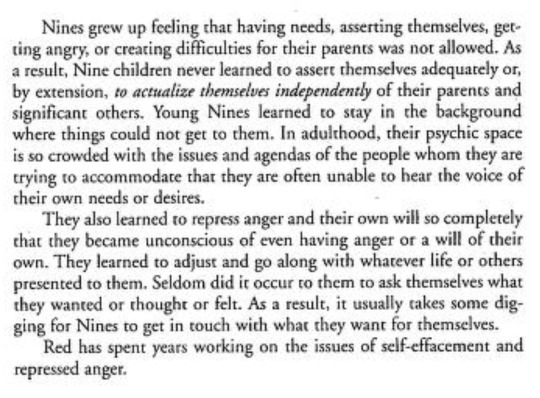
That’s it, ty for reading. Even if it’s a bit of a mess, hopefully you’ll have gained a thing or two from it. Falin is a character hard to pin down, but it is very gratifying when you find the way that the puzzle pieces fit together right for your own understanding of the story. Fantranslation of the shuro proposal comic by @/thatsmimi here.
Here’s my spotify playlist for her if you’d like
Sometimes love is about letting go, a lesson a lot of the cast needed to learn. Self-love’s important too, and just like with diets we need a healthy balance.
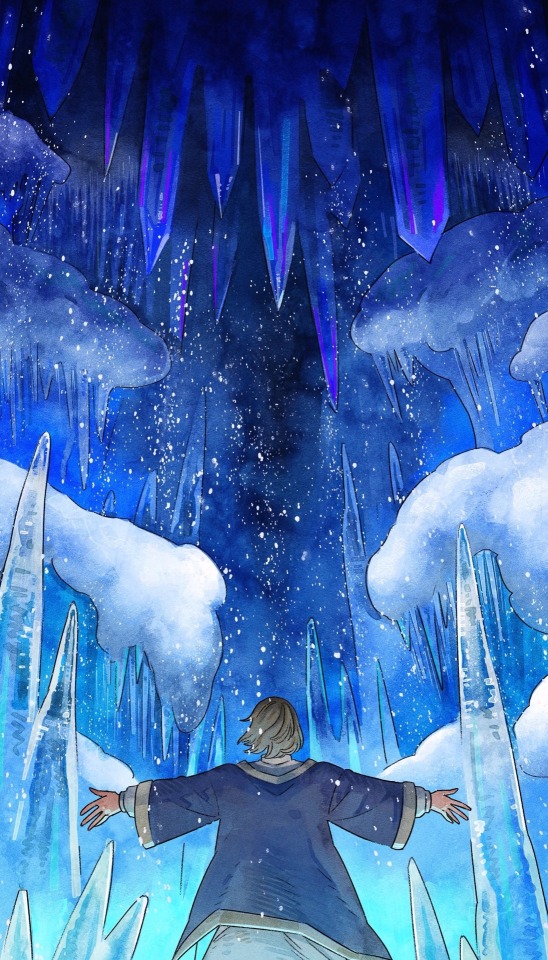
#I find it hard to express myself right on the topic of Falin. Both because the issue is pretty vibe based and because we don’t#get that many moments with her. So there’s ambiguous scenes up to interpretation addressing a layered topic and like. Save me. Save me#As always falling down the rabbithole of starting an analysis about a specific facet and then needing to explain everything else around it#I’m doomed. I’m getting lost in the sauce.#dungeon meshi#delicious in dungeon#falin touden#analysis#character analysis#meta#autistic reading#aroace reading as well. Sort of. It’s mentioned#The aroace autistic guilt of not caring back in the way/with the intensity you’re expected to#As always this is just my interpretation blablabla#Spoilers#dungeon meshi manga spoilers#She loves like a dog aka unconditionally and happy with eating scraps of affection and attention off the floor#Laios touden#he’s here too bc they are an unit#If you’re not capitalizing on the uncanny vibe autistic effect for Falin’s character u are missing an opportunity imo#Fairy’s child is written all over her. Her cryptic-ness is the point so why am I surprised she’s hard to fully pin down#Even with the graveyard scene it was Falin following Laios… Sob. Laios could feel responsible her powers were found out#I’d like to rework this at some point if i get better at structuring. I’m not satisfied by the level of clarity#Will 90% for sure edit stuff in if i find more to say.#Fumi rambles#Crazy style#I give a TLDR at the end if you’d prefer. It doesn’t have the like evidence/explanations alongside but it makes the main points i think
1K notes
·
View notes
Text
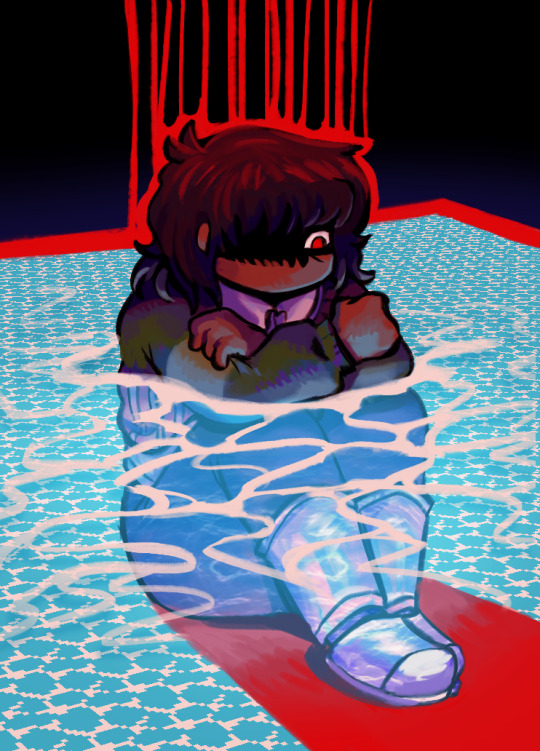
Is it fun, Kris? Playing around like this...
#my art#deltarune#deltarune spoilers#(?)#kris dreemurr#utdr#this was very inspired by the sword route. probably my favorite sequence in the whole game so far#and it has a LOT of contenders theres a lot of really good scenes in the game!!#i love the way it points out the layers of abstraction inherent to the weird route#the weird route happens in the dark world which is a place explicitly “lesser” than the light world#its consequences disappear unless you actively harm a piece of the light world (berdly)#similarly the game kris plays exists on a layer below that#doing the sword route doesnt affect the course of the dark world at all aside from minor dialogue differences#and of course on a meta level even affecting the light world of deltarune doesnt affect the real lives of the players of the game#except.. in the sword route the pixel kris leaves the game and affects the dark world. in the weird route berdly dies and is left comatose#in the light world. in real life the weird route is a fictional creation by toby fox but it still affects the way#we as fans of the characters think about kris and noelle#kris enjoys the sword route games (at least for a while)#and they similarly enjoy the weird route -- albeit in a twisted awful way#just like how the player of the route itself can enjoy it in a twisted way#its all fake but its also what you make of it.
223 notes
·
View notes
Text
Thinking about how much the front half of Dungeon Meshi gives such a very different impression of Kabru as a character than the back half. Like we joke about how he's watching Laios and Toshiro slap-fight with popcorn having a great time, and he is and it's true, but then my man focuses up REAL fucking fast the instant Canaries have boots on the ground and then it's Serious Fucking Business Kabru for the rest of the manga.
Like it's all fun and games when he's focused on trying to figure out what's going on with the Touden party. Like he's still trying to defeat the dungeon for his overall goals but his party's focus on catching "the thieves" is just more or less a distraction. A little side quest to work out a little interpersonal mystery he's been trying to figure out. He's having a fun little time putting together the pieces that didn't make any sense before.
Then the Canaries actually landing on Melini is for Kabru like the scene in Mulan where they walk into the ruined village and it abruptly stops being a musical for the whole rest of the film.
Playtime is fucking over! Kabru is the one guy who fully understands how much playtime is over the instant Canaries are involved. Shit is about to get real bad real fast. There is NO MORE TIME for goofing around. He's playing panicked defense for the entire rest of the manga.
(Side note speaking of panicked defense, it's interesting how much the scene of the illusory fish men followed by the sea serpent really establishes how Kabru reacts under pressure. He's got his shit so together during the illusions and fighting the corpse retrievers but the minute he's out of his element with the sea serpent he panics and can't give good orders, and would have gotten his whole party killed again if not for Toshiro's party.
You can see how this same dynamic plays out when his initial plan to convince the shadow lord backfires and Kabru panics and can't recover, and again when his plan to have Laios become the dungeon lord apparently backfires and he panics and has a full on breakdown. The particular nature of his trauma is such that when he loses control of a situation and something he didn't predict happens, he can't keep his head in the game, and the fact that Kui sets that up so early with the sea serpent is -chef's kiss- so good. It's a fascinating contrast with Laios, who really has a strength for thinking on his feet that enables him to succeed where Kabru's foresight and planning cannot.)
#Kabru#dungeon Meshi#dunmeshi spoilers#I'm sure this is all old news but I'm just. rewatching the anime again after rereading the back half of the manga#just cuz there's so many layers and it really needs to be done that way to unpack it all#and it was surprising seeing early Kabru immediately after end-game Kabru#no wonder the anime only fans have such a different impression of him as a character#Isan0rt meta
231 notes
·
View notes
Text
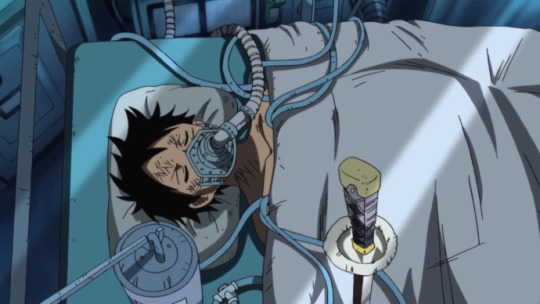
such a small detail but I cannot stop thinking about law leaving kikoku by luffy's bedside when he went out to talk with hancock and ivankov. idk it stirs up a lot of questions. like does law do this often? does law, like zoro, talk to his well-behaved cursed sword like "kikoku, sit. watch." before he leaves to go have lunch or a well deserved twenty minute post-surgery nap. is this the protective equivalent to leaving a baseball bat by the bedside? doctor's bedside manner emotional support blade? but then I also can't help but notice that it's unsheathed. which... actually, who is that sword protecting really, just sitting there? did luffy wake up more than once in the cradle of that submarine while his body was still recovering? (drugged up to the gills, entirely noncoherent, unable to be reasoned with, going in and out of consciousness, the only thought running through his mind being "ace"). probably would've been a nightmare for the heart crew
#touches the soil. what happened here#thinking about ohmilk's 'i took care of you' piece again#edit: ive been kindly informed that in japan. historically. leaving a sword in the ground was a sign of respect for the fallen.#so law was likely doing this as a sign of respect for ace. specifically since it was placed next to luffy#which is all very nice of law and heartbreaking but i still like to speculate on the layers to this action#CJ's op watch-through#one piece#op#lawlu#monkey d. luffy#straw hat luffy#monkey d luffy#trafalgar law#surgeon of death#op meta#op analysis
1K notes
·
View notes
Text
hate when people act like jayce giopara is just "jerk jayce" or "jayce talis if he was an asshole", because jayce giopara is literally just a low-empathy autistic guy who’s never struggled ever. like his bio looks you in your face and says that!!!!!
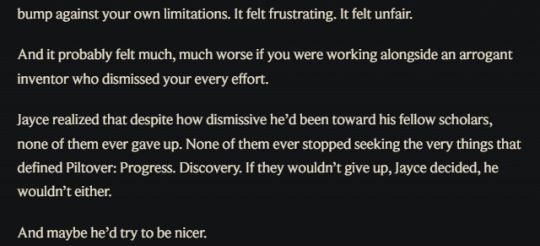
he struggled ONE TIME and immediately thought “oh my god i should be a nicer person and apologize to my ex” and you people are SO MEAN to this man. for shame.
#he learned empathy in like five seconds give him some credit#really shouldn't we all strive to live a life where struggling to do something new is a unique and unheard of experience#even in the convergence comics and quick fix short story (set after his empathy revelation and second divorce with viktor)#he's abrasive and autistic but genuinely kind and helpful after thinking about it for a bit#yes he is an asshole but he's not JUST an asshole. he's an asshole with layers and extenuating circumstances#like an onion#jayce giopara#league jayce#jayce league of legends#jayce lol#league jayvik#vikjayce#vikjayce meta#autistic jayce#jayce giopara my beloved autistic son#defender of tomorrow#jayce apologist#but the other one
130 notes
·
View notes
Text
Started thinking about Riku-Kairi parallels and symbolism wrt the ending of kh2 so please hold while i get needlessly verbose about it-
specifically it started with this gif

and ofc adhd is as adhd does and started going down the rabbit hole of connecting the dots.
The act of reaching out a hand/hand holding is a recurring thing in kh, the vast majority of which is chock full of meaning and symbolism, and this is no exception. This is the culmination of The Hero's Journey part of Sora's tale, the return home, and the heartfelt reunion between long-seperated friends. fun fact the heroine's journey follows the hero's journey for the first third or so before continuing on. kinda like how kh continued on long after things seemed to be 'resolved'. weekly plug to look up Howler's Heroine's Journey essays if you haven't yet
The angle from which I am viewing this scene right now is in regards to ofc Riku, and his own iconic pose that we see the first time in the intro to kh1 (and many, many times since)

And this is where my riku-kairi-are-inverted-parallels-to-each-other brain starts barking like a dog because oughghghghggh same pose opposite side completely different body language- AHG.
And this matches their character arcs (as well as their respective combined arcs with sora) to a T as well. Riku's pose is the first we see, way back in kh1, and his hand is as much a taunt as it is an offer. Very befitting his relationship to sora in that game, which was coloured by a forged rivalry and intense jealousy (to quote the ultimania; Complicated Feelings) of/for sora.
(it is also notable that to date this gesture has yet to be resolved. the closest they've gotten is when sora grasped Riku's hand in kh2 on finding him- albeit in Ansem's visage.
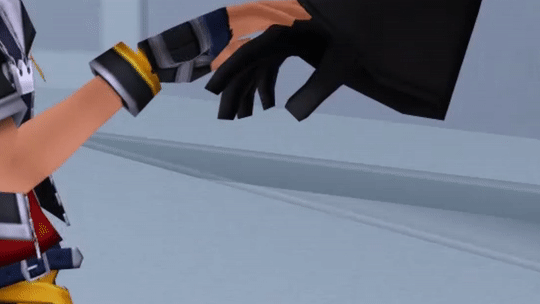
Symbolically this is Sora attempting to accept the gesture, but this time it is Riku who fails to meet him halfway, too deep in guilt and regret to feel worthy of it. his hand is turned downwards, limp and unresisting.
And again in DDD when Riku grabs sora's hand/wrist in an attempt to wake him from his nightmares, but this time sora isn't capable of reciprocating. like two ships passing in the night, always reaching but never quite meeting)
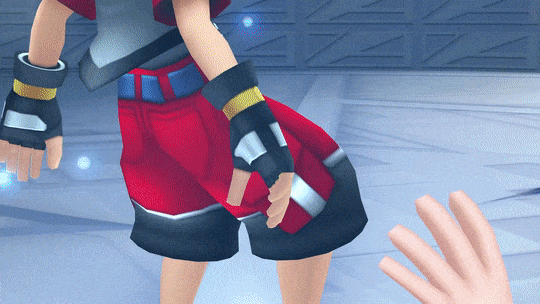
(this one isn't quite as strong in the visual symbolism specific to the Riku Pose, but i did think it bore mentioning)
to return to the first gif however, for Kairi her posture is much less stiff, leaning forward with palpable releif at Sora's return. Honestly the fact that she holds out her left hand (which as far as i know is not her dominant hand) marks this as a very deliberate choice to parallel her as opposite to riku. and much like the rest of kh2's ending, it FEELS like a culmination, a completion of their arcs.... and most certainly isnt.
Which i mean to say, it's a mid-point. And the reason I say this is because of one little thing.
The seashell charm.

There's a sort of irony here in that the charm that was meant to reunite them in this moment is also symbolically like a wedge between them. A heartfelt and meaningful gesture, don't get me wrong! i love this scene and the genuine emotions within, but i do love chewing on the way this gains a slightly different meaning in the greater context of later story beats; specifically that of kh3.
With how pointed and direct the parallel is between kairi and riku in these scenes, it did make me pause for a moment thinking about kh3. i know we've all seen a thousand and one analysis' of the paopu scene at this point, but forgive me as i must do so again under this specific lens.
'how does the paopu scene relate to the hand extended gesture at all?' i hear you ask, and on the visual surface not much. it has more to do with sora and kairi's relationship arc through the games and, of course, the lingering loose thread that was the cave drawing.
The paopu scene is a touching recreation of that cave drawing, one enacted by a pair of kids who didn't know if they would live to see another sunset. It's also probably the most symbollically dense thing in all of kh and that is saying something so I'm going to try and keep my observations limited to just what is relevant to this post- and that would be the way that the paopu scene is a direct continuation of Kairi's 'you're home' gesture in kh2.
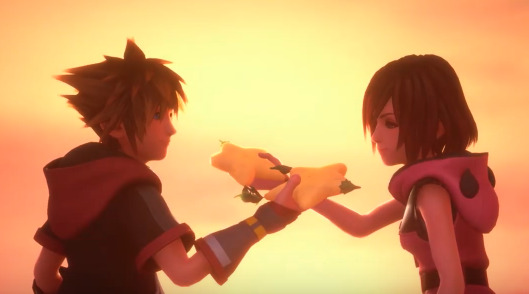
shooting stars are also a common recurring symbol in kh, and that's the symbol that ties these two scene's together. if kh1 is two disparate stars each trying to reach the other (the cave drawing, the seashell charm, the way their hands are seperated at the end of kh1), and the end of kh2 is that of the stars finally meeting (the single seashell star charm pressed between their palms), then the paopu scene is that of the stars passing each other by and beginning their own journey's anew (two stars held by crossed arms, each now holding a small piece of the other (bitten fruit) to show that their meeting may have been brief but it was meaningful)
it is in this way that kh3 quietly and tenderly closes out sora and kairi's combined arc, as two unlikely friends who then drift apart again, shining brightly for the shared experiance, Remind mostly serves to support that finality, tying up the last couple loose ends between them, and leaving the two far more comfortable with each other than they ever were while that arc was still ongoing (which i read as them no longer being uncertain as to what their relationship is; that of friends, and not whatever so many others around them had pushed and assumed)
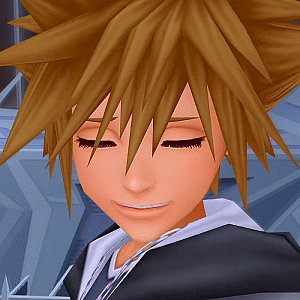
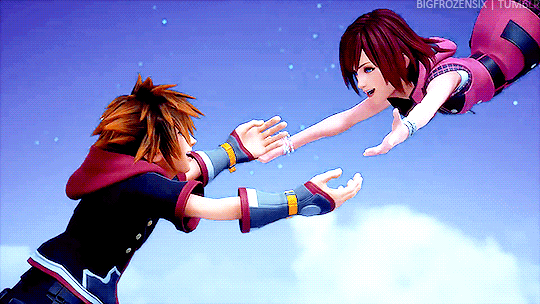
(seriously look at how much more comfortable they are with each other the second the pressure to be something they're not is off. the awkwardness is completely gone i love it)
All of this is ofc still in parallel to Riku, who boasts no such star imagery (instead he has the iconic Heart of KH itself), and in fact while he symbollically continues to reach out to sora, physically he has completely refrained from doing so at all- in fact most examples of the Gesture in kh are deliberately invoked by other characters in order to bring riku to mind in some way (and often more for the players benifit than sora's)
axel in CoM,
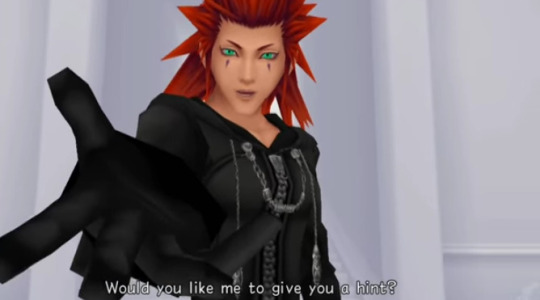
(i have given up on tumblr gif search)
YMX in DDD,
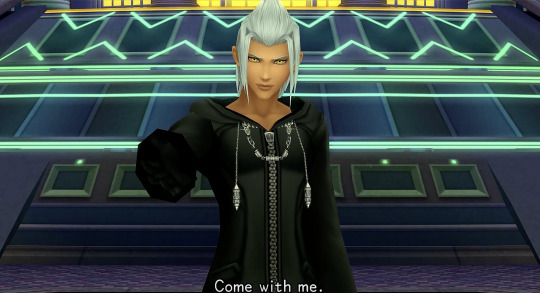
which then immidiately cuts to riku in kh1 just to make it as blatant as possible that yes the reference is intentional (i guess CoM was too subtle somehow so they had to make sure this time)
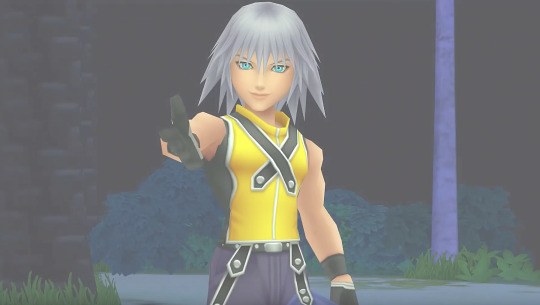
and even Riku himself to Namine at the end of kh3, representing Repliku's final wishes in a funny sort of symbolism oroboros.)
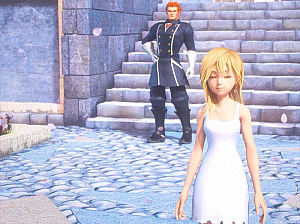
and it's not a coincidence that the completion of that connection provides definitive closure to the arcs in question; that of namine to repliku, but also a little bit to riku himself. namine still has a role to play, but that role (i think) is more or less exclusive to her relationship with sora. namine and riku's relationship arc, background as it is, is complete, and now both are connected primarily through their incomplete arcs with sora.
(which makes the way that sora and kairi's example in kh2 is a complete outlier really interesting tbh. smth smth thinking your relationship is one thing and if it was that thing then yes that would have been the end, but it wasn't that thing and thus it wasn't the end smth smth comphet metaphor smth)
which brings us back to how riku himself hasn't really reached out to sora directly since kh1, the act that set off both of their journey's. The reasons for that are many- guilt, fear, a certainty that sora will not reach back and that he doesn't deserve it anyway- but despite that the Gesture is still subtly affirmed as being Riku's over and over again, never quite letting the audience forget it... because eventually this bit of symbolism so consistently portrayed throughout the series will reach its own conclusion, starting how it began with one deuteragonist reaching out to the other, and this time the other reaching back to complete the gesture.
#i'm sure there's more layers here but i have successfully excised the hyperfixation brainworms so goodnight#and yes this is all written with full soriku endgame actually bias i freely admit#idk man i love the way kh uses symbolism#kingdom hearts#stop talking to yourself flight#flight's making things again#meta#soriku#long post
211 notes
·
View notes
Text
I really wish Gaara's arc had been a little more involved because I truly don't think the sheer horror of it all is delved into enough. In the end it's sort of like he just. Snaps out of it. But then you start thinking about it and you're like. Oh. This kid literally could not sleep for years. Oh this kid was being tormented by Ichibi 24/7. Oh this kid had everyone trying to assassinate him when he was tiny. Oh this kid trusted one single person and they tried to kill him too and then died in front of him. Oh this kid was told everyone including his family hated him and that he was a monster and should die. Oh ok. Like sure murder was not the answer but also considering the circumstances he should've been even more out of it than he was
#all the way back in 2017 when i read it the first time i was like. you're telling me this kid literally could not sleep.#i feel like even ignoring EVERYTHING ELSE. that is insane#and then you add like 5 more layers of torture#but honestly i feel like because of the way it's treated by canon. as with anything else. the reality is not addressed#when like. holy shit#type: meta#sorta#fandom: naruto#naruto#naruto shippuden#naruto shippuuden#naruto series#naruto manga#sabaku no gaara#gaara#gaara of the desert#gaara of the sand#gaara naruto#rasa naruto
290 notes
·
View notes
Text
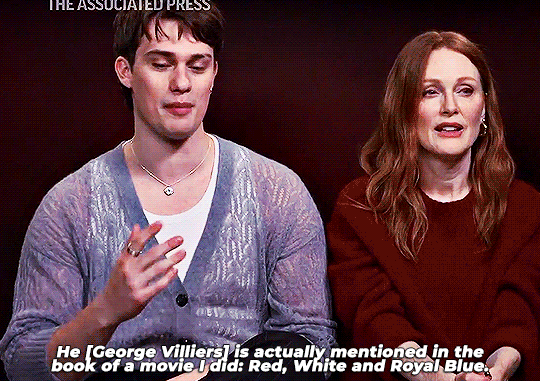


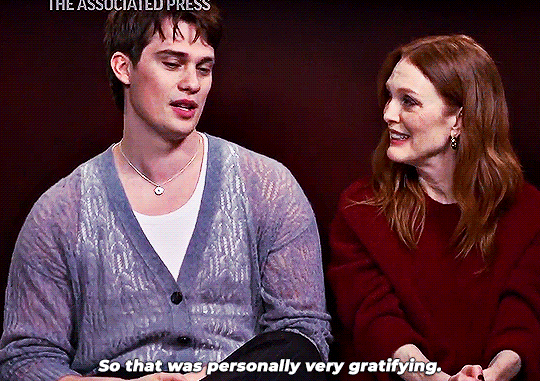
Nicholas Galitzine talking about the connection between Mary & George and Red, White & Royal Blue
#nicholas galitzine#rwrb#red white and royal blue#julianne moore#nicholasgalitzineedit#userninz#chrissiewatts#usersteen#usernuria#userclara#usergayppl#mine*#YOU'RE JOKING............................#unprovoked he said this#this is so meta#confirmation he Actually read the book lmfaosljfd#omg the layers to all of this#julianne is so invested also...#how do we get her to play catherine...............#personally very gratifying - haters stay mad.
1K notes
·
View notes
Text
my fav dynamics in atla are. not ships?? the platonic interactions are so so compelling, just as if not more compelling than the ships. i love u fire siblings tragically destroying each other. i love u water siblings torn apart by gender and brought together by love. i love u ursa being a complicated person. i love u uncle iroh possibly projecting lu ten on zuko. i love u toph’s horrible relationship with her parents. i love u aang’s conflict with the past avatars
#atla#atla meta#when u stop putting moral value on the characters and their relationships#u start seeing new layers of beautiful narrative to snack on#fire siblings#water siblings#atla iroh#iroh#atla toph#toph beifong#atla aang#aang#avatar aang#ursa#atla ursa#atla zuko#zuko#atla azula#azula#atla katara#katara#atla sokka#sokka#fire hazard siblings#water damage siblings#they are all so deeply fucked up.#i love them#the wholesomification of dynamics is a curse#100#my posts
408 notes
·
View notes
Text

a letter.
yaaaay lore time
so this is the first proper time the twins meet meta knight, they’ve met him already before, however that… did not turn out very well.
kirby may or may not have also tried to introduce the twins to meta knight shortly after that first encounter, unaware of what meta knight did. this second meeting was extremely short, due to lula grabbing luca and running away out of fear when she saw him.
a while after this happens, the twins lula gets a letter from meta knight, offering her and luca to be trained by him and his crew. is this his strange way of trying to make amends? does he see potential in the two of them? what are his motives? who knows. either way, lula panics and keeps the letter to herself, hiding it from luca so she can mull over the offer.
this does not last very long. luca notices her change in behavior, and finds the letter a few days later. the twins have a fight over it, as lula wants to take the offer and luca refusing to let her go near meta knight again. lula’s anxious but adamant about training, tired of pretending to be something she’s not. luca acknowledges this, and states that if she does it, then he will too. lula disapproves of the idea, but her brother is stubborn and does not budge from this compromise. either they both do it or neither of them do.
in the end they both agree to the offer, and start training with meta knight. it’s a very rough start, as one twin is scared of him and the other hates his guts… it takes them a very long time to warm up to him.
#I’m so glad I’m done with this I’m tired of working on it LMAO#the amount of effort [and layers] I put into this is insane. my god#‘hey why did meta knight do that in the first place-‘ he was a little sick in the head you know how it is#kirby#kirby oc#oc lula#oc luca#sunny’s art#fuck me I have to tag all of them#meta knight#sword knight#blade knight#axe knight#mace knight#javelin knight#meta knights#?????!!?
89 notes
·
View notes
Text
Marcille and Chilchuck’s interwoven character arcs: the fantasy of prince charming, idealization vs pessimism and loss
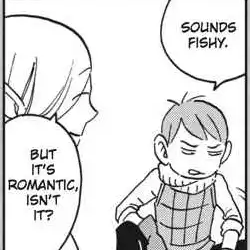
I’ve alluded to Marcille and Chilchuck being central to each other’s arcs so many times but the proper full analysis has been long overdue. I’ve made a post going into their differences and similarities and the many ways they’re foils for each other, but this is going to give more focus to a narrative rather than character angle this time around. We talk a lot about the importance of Marcille in Chilchuck’s arc, it's more obvious overall, but less so about Chilchuck’s importance in her own, so this is going to emphase on the latter. When talking about fantasy vs reality, usually optimism is associated with fantasy and pessimism with reality, but that's not the full picture either. Both situations and relationships can be layered and subtext can imply quite a lot, the reality of things can be more complex than we'd like or hard to reconcile, and that's exactly what we're talking about today and how that is a lesson both Marcille and Chilchuck needed to learn. Give this a shot and look at the manga pages alongside my reading and decide for yourself whether I’ve got a point or I’m going overboard~!
So, Marcille and Chilchuck are character foils in many many ways, and I think a particularly brilliant part of their arc is how they balanced each other out on idealization. On one hand, idealizing things means only seeing what you want to see through rose-colored glasses, on the other, being completely opposed to it usually means denouncing any optimism at all, refusing to hold any good faith or hope. These stances reflect both their backgrounds, as Chilchuck has lived through being discriminated against and taken advantage of consistently, betrayed by employers and eventually the person supposed to be closest to him, his wife, meanwhile Marcille grew up more sheltered and lonely, and books were a big way through which she experienced social situations & the ways of the world in her rural home before going to the magic academy as a researcher and getting more actual life experience herself.
I think it’s especially interesting to analyze the trope of— the idealization of— the perfect chivalrous prince on a white horse who is pure hearted and will make you swoon, in the context of their relationship and their arcs! It’s a recurring motif- you’ll just have to trust me and read further~ Obviously this contains spoilers for the whole manga, so beware! It's very long because I'm trying to cover the topic fully from the ground up, my apologies.
Table of contents:
How they start out
The Daltian Clan and its importance
Prince Charming vs Chilchuck Tims
Ideals vs desires vs wants
Deconstructing realistic romance & compromising between romanticism and reality
Princess imagery in Marcille
Conclusion
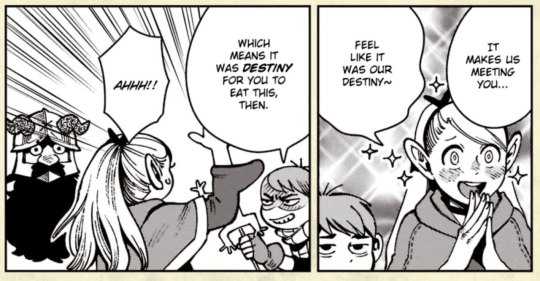
Let’s start with the beginning:
How the characters start off:
Their relationship is both familiar and strained (extra reading: analysis of their relationship pre-canon and early canon), they bounce off each other with the ease of coworkers who’ve been working together for two years and who share similar common sense. Because yes they’re both generally grounded and rational, and generally they respect each other’s input and perspective, but, they both have blind spots…
The biggest hurdle is the way Chilchuck refuses to open up. Marcille has made efforts to befriend him, and though he was open to developing a better workplace dynamic and, say, helping her out with shopping for a pouch outside of work, even if it ended up being counterproductive he’d refuse to even just say his age, let alone share anything about his family situation. Knowing he had kids and a wife would have pretty efficiently fully shut down that he was a kid, and yet he valued being closed off more. Chilchuck is often shown being pessimistic, assuming the worst intentions out of people and being wary of anything good happening, being the last person to trust something or someone, etc. (Quick summary analysis of him I made if you want here, beyond the character foil analysis I linked at the beginning.) He prefers assuming that opening up will only bring him problems to assuming that it'd bring about positive things.
Meanwhile Marcille is very… Honestly she’s hard to classify strongly. Because I could say she’s very open to people, but honestly it’s conditional? She emotes intensely but she’s not quite a befriending machine either, especially when we recall the magic academy days as well, she’s not unused to keeping people at some level of distance, herself keeping a lot of secrets too. She was very wary of Laios at first because she had misconceptions, she holds grudges and isn’t personable with everyone like Namari or Toshiro, when she’s introduced to the party she seems serious and doesn’t smile. While I don’t fully agree, there’s a good analysis not by me here showcasing what I’m talking about. Marcille’s more serious academic side often gets undermined and I think it’s an important part of her, but then the difference between her and Chilchuck comes down to theory vs practice: knowledge vs experience. I think something more fitting to say would be that she’s idealistic and easily swayed, for example the way she lights up whenever she can put a story-like twist on things, her mood can go from dread to hype and reverse in one second, like with riding a kelpie or with the conflict between Chilchuck and his wife, or again with Namari, where it becomes a sort of hero vs antagonist dynamic for her where justice and righteous thoughts should override everything else like needing money to live. She's very stubborn, like he is, but it's easier for her to come around in dramatic ways, on things big and small, mentioning for another example thinking better of orcs suddenly because they can cook well.
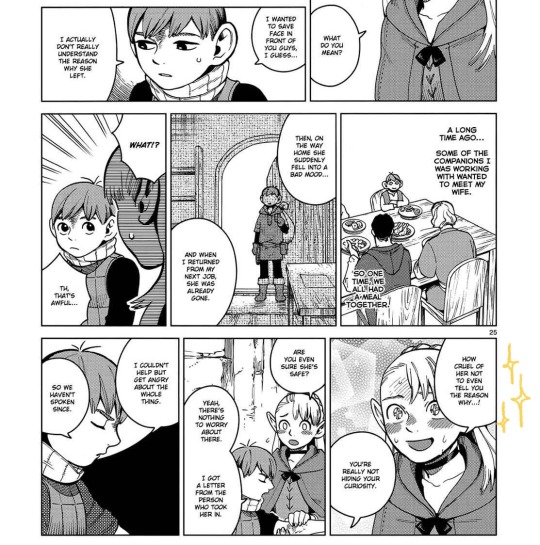
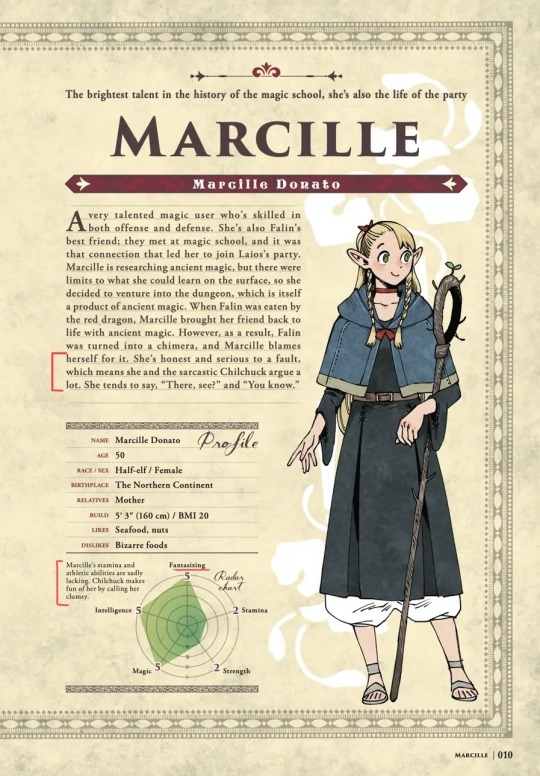
So sure on first meeting she isn’t exactly eager, but then we do see her enthusiastically trying to befriend everyone! Becoming very friendly once she’s done assessing them. She is social, and fittingly she’s very curious about people. And that said, aesthetics do matter a lot to her, and I mean this beyond just enjoying vibes, for example- and follow along the lingo I'm setting up here- if something ‘breaks’ an aesthetic like Chilchuck or Falin not being a child she’ll willfully dismiss and ignore it, if she can spin something into a story like Chilchuck’s breakup she’ll get carried away, she can get the wrong impression, be gullible for the sake of believing a narrative, such and such. I’d say she’s guarded around people at first, but then with time becomes an open book emotions wise, how she’s always loudly and unapologetically talking about her feelings and emoting. She’s not reckless, rather she’s bold and often has to make decisions quickly, like when the plan unexpectedly changed during the red dragon fight, but things like using dark magic can feel like thoughtless decisions looking from the outside, like to Chilchuck, who as per his pessimism dictates he sees all of this in a negative light, assumes the worst: that she’s just ignorant, naive and reckless. She’s easily worried and discouraged but still always perseveres.
He's biased against mages and elves because of past experiences and he projects that onto Marcille. And it makes sense because good faith is dangerous to Chilchuck- for his feelings in relationships yes, but more concretely and important for his life at work, the way an old party of his was going to sacrifice him to succubi for easy money. Like the way he constantly puts his non-work values down to the group so they don’t have high expectations of him, having high expectations for someone else is vulnerability he doesn’t want to or cannot afford. The result however is that he, too, put people into boxes to avoid having his preconceived notions challenged. He's very judgemental, which we see with Laios as well, and even with Izutsumi in the ice golem chapter, but by then he's learned to self-reflect more and be honest with his feelings due to Leed, meaning his social conflicts get resolved more often and more quickly, again like with Izutsumi in the ice golem chapter.
So in the end, there are things that stand in the way of them having true, equal respect for one another. She sees him as a kid despite everything else (being capable and mature, etc etc), and he sees her as a ticking bomb of a naive elf mage who’s gonna get herself into legal trouble if she doesn’t get them killed first.

And it takes an arc spanning the whole manga for them to get there, to truly see each other on equal footing, culminating with the bicorn chapter.
I'm going to be mentioning them a lot so in my mind, the most important Marcille & Chilchuck arc defining scenes happen in: mandrake chapter, mimic chapter, shapeshifter chapter, hypogriff soup chapter, changelings, bicorn, succubus, and Marcille dungeon lord. We're talking mostly about Marcille's discrimination and their narrative about loss here, but on the end of Chilchuck's discrimination the dark magic plot is very central so honorable mention to the red dragon chapters, the harpies chapter and the cockatrice chapter, the latter where Chilchuck airs out his beef particularly directly.
Interestingly enough, the mandrake chapter which is in VERY early manga, where characters and dynamics are still being set up, Marcille gets Chilchuck to say that she isn't a burden and that he's glad they have her and her skillset with them, so the question of "does he respect her at all" was answered before the audience could even think to ask it, and Marcille also makes statements shortly after showing she respects him in turn- more on that later. This has for a result that we do know there's a foundation of respect here, even when as said it's not complete... yet.
So let’s get into it! Early on we already get a lot instances hinting at their opposed core values of optimism vs pessimism. It’s perfectly summarized in the two panel excerpts opening this post: "Sounds romantic!" "Sounds fishy.", hope vs wariness. "Meeting you was fate!" "… Which means it’s fate for you to eat these monsters, too!", if good things happening to you is fate then you must accept that all the bad things that happen to you are fate as well. It’s "Things will work out!" vs "Things will not work out".
The issue here seems rather evident, it’s a balancing game. Compromising, adapting your judgement to the situation. Yes Marcille romanticizes things too much and it can cause her trouble, and yes Chilchuck being so closed off on himself gets him into trouble as well.
(Not telling there was a mimic nearby being maybe the most straightforward example.)
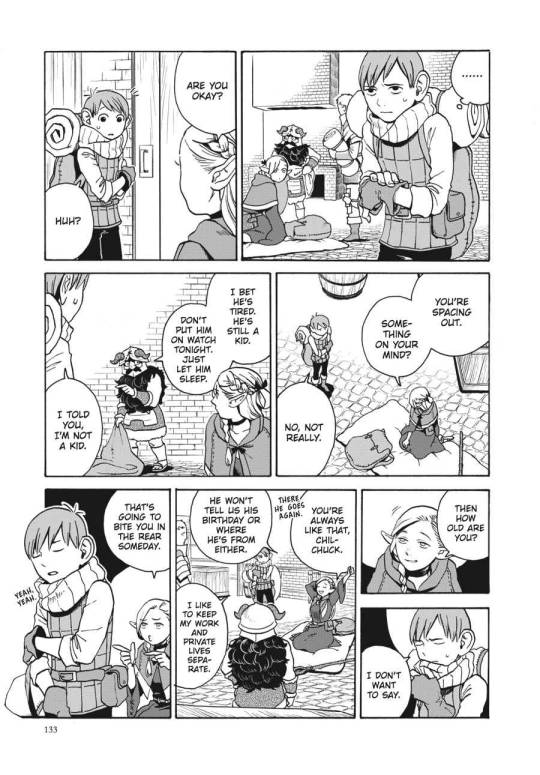
His refusal to hope for anything good happening to him ever is at the core of him not having even tried reconciling with his wife (more on that later with the bicorn chapter). Through the manga, Chilchuck influences her to be more savvy and to respect boundaries more (with himself and Namari for example), while she influences him to become more open and give things a go. It’s no coincidence that it’s Marcille that pushes him to try reconciling with his wife and gives him hope that it just might work out- that that chance even on its own means it's worth giving it a shot.
The Daltian Clan & its importance
The importance of fiction in some people's lives and their specific psychological relationship to it is a very complex human brain topic with many many studies and an infinite amount of subtleties, I can't possibly do justice to this section at its full potential but I'll go over my major points. But the complex and layered nature of this relationship is why, for example, the interpretation that Marcille is a lesbian despite her likely attraction/love for male fictional characters (if not even just simping or stanning separate from those), has legs to stand on and is a compelling angle!
The Daltian Clan, often shortened as Dalclan, is Marcille's favorite book series and is very very personally important to her. In an extra we learn that part of it is that seeing a half-elf character personally reached out to her and meant a lot. She feels seen through it. Even if it's notable that the half-elf haracter isn't her favorite, general Hagreus, but the one with black hair. It's a Cinderella type of romance & convoluted political intrigue series full with a lot of drama, reminiscent of stuff like Romeo & Juliette or Richard III.

I believe that books were developmentally very important for her, similarly as to how cartoons are important to the education and development of toddlers and kids nowadays, or how oral stories like fairytales have always been important to teach lessons. Fiction engages readers and provides emotional stimulation, which can often be a flawed substitute for actual human contact- but nonetheless a big factor in socialization. For Marcille who lived in a rather rural region surrounded by books and chickens, who couldn't fit in with kids of any age around, books were a major part of teaching her how to socialize, how people and social groups worked. This is also part of why the autistic Marcille angle can be very compelling and plausible, though personally I don't see it that way.

So yes I think that sort of upbringing shaped her a lot, and I think it's part of why Marcille has trouble not putting people into boxes... Why even though Falin assured her it wasn't like that, Marcille had made this whole narrative in her mind painting Laios as a villain that stole Falin away against her will/for nefarious purposes. Why she has trouble not thinking of/treating Falin as a kid, unwilling to process how she has grown up. Why Chilchuck has to be very young in her mind, and it was very very hard for her to reconcile the fact that he wasn't. (It's actually interesting to note that Marcille treats Falin and Chilchuck similarly in a lot of ways, overstepping boundaries, being dimissive and touchy- There's a lot to say about how the party dynamic changed a lot with during canon it becoming just Laios, Marcille and Chilchuck at first and Laios' monster interest reveal, notably that in Falin's absence that she may have latched onto Chilchuck and treats him similarly to Falin may be her finding it omforting to fall into habits or filling a hole.) I think complexity in fictional characters gets her gears turning, but there's always a film of impersonality to it right, where it's not real, there's a safe distance, if you want to form romantic narratives about how things went down and a character's angst, you can, but someone who’s real… Things are often uglier or harder to grapple with. And she doesn’t want Falin to have grown up, for her to so quickly have aged. I think applying this sort of storybook veneer onto her real life connections, pushing people into boxes, is a way for her to make social relationships more digestible. And she's a big gossip enjoyer too! Engaging in shallow retellings of people's interpersonal drama, eating it up with enthusiasm and curiosity. Part of it, like with novels, is vicariously living through others I think, experiencing making connections where she hasn't or couldn't, the way her relationship with the other girls at the academy besides Falin stayed distant and shallow despite being friendly. Gossip, like stories, are safe, distant from your own life, they're easy to judge, not unlike the irl popular interest in following others’ online drama. You’re not involved yourself, so you don’t have as much chance of getting hurt. So yes, easier to digest. Less complex, less unpleasant things and less contradictions that are hard to process. Sort of like a defense mechanism to not have your worldview challenged, dodging having to recognize these things by assigning them tropes. And I think part of it too like I implied is: she can’t experience actual loss through books and gossip. They give her emotional social stimulation she doesn’t fully allow herself to have with actual humans for fear of getting invested in a way that’s very raw and personal. Again, like how she pushes Falin away to ignore the more nuanced facets to their relationship! The intensity of what I’m speculating on here in her character is debatable but I do think it’s present at least in some amount.
In a similar way to dogs being important to Laios’ social life (I made something of an analysis on that if you're interested, but this one's not relevant to what I'm talking about in this post) books are her comfort zone. If she can compare a real situation to a story it brightens everything and, well, it does make her assume things wrongly often but it also makes her able to analyze people deeply, like the roleplay-theory-speculation about Chilchuck's wife and the way she hit bullseye on how Chilchuck felt in the aftermath. But like how Marcille only agreed to wear the frog suit when the party told her it'd look cute on her, or how thinking about riding on kelpies made her excited for what previously she saw as a tedious and dreadful journey. Special interest power blast.

And this is where comes in her coworker, a disillusioned embittered man.
A guy who knows all about how messed up the world & people can be and isn't afraid to say it how it is, who in every sphere of life has field experience rather than fictional one- with romance, work, and having dreams & ambitions. Someone flawed and real, someone who won't let her interpret him however she wants without confronting her about it & challenging her to change her perspective.
It took a looot for Marcille to fully stop seeing him as a kid, and in a way I think it was necessary for the dissonance to be both this hard to reconcile and this impossible to ignore: that he truly is a middle-aged man down to his demeanor and family background but that he looks like a teen at most to her. That she literally has to look beyond aesthetics to be able to first fathom then accept and internalize that he's an adult despite his looks. That it was so ingrained and took so long, so much that even while she recognized and said "He's usually the most mature one of us", so much that even as it's implied that she knew logically he's an adult before the changelings, as pictured earlier she still couldn't conceive it. It's like with her calling Laios and Falin's parents kids in a post-canon extra, it's not that she doesn't know it's that it's hard to wrap her head around. Necessary and important because, if Chilchuck was any less loud about being a man she could have gone on unchallenged in her assumptions. If it was an easier to dismantle misconception, something easier to digest, then her arc of coming to see him as he is would have had less impact on her character, afterwards she could continue to run with her own interpretations of people like Falin and Namari without her confidence in being able to pin down people into simple roles being so fundamentally shaken. And it's notable too, that Namari's choice to leave the party to look out for herself situation was decidedly unheroic, but it was Chilchuck who spoke to Marcille about why her decision was both reasonable and had a lot of thought behind it, making her accept that it doesn't make Namari a bad person or even a bad coworker or friend.
Chilchuck is someone who knows that sometimes, bad things happen for no reason, and it's not meaningful or part of a grand narrative, it just sucks and you have to deal with it.
As the foil to her very emotional black and white interpretations of things, Chilchuck represents nuance, and he's impossible for her to ignore.
Prince Charming vs Chilchuck Tims
Chilchuck is so obviously not a prince charming. He doesn't have the looks, the attitude nor the lifestyle. Does he have the virtues for it? Well, no... But also, yes. More on that in a bit. It's also interesting to think of the status aspect to it, because being from an impoverished oppressed class/community is so central to Chilchuck's character, something usually far removed from prince charmings and white knights, and not only status wise but on the topic of virtues... It’s an interesting thread to explore, the way one may have the means to remain chivalrous rather than becoming distrustful and embittered: sometimes optimism is a sign of privilege, being able to be or remain optimistic through life. I'm sure Marcille would be the first to jump onto the aesthetic and narrative allure of a pauper in love with a princess, of a hero of the people à la Robin Hood, but it's still interesting to think of that as another facet of the contrast Chilchuck makes. Alright, tangent done.
But obviously, despite this all they have a great work dynamic and respect for each other's capabilities. It's not like Marcille is mean to people who don't fit these fairytale high standards, no that’s only when she feels wronged or if there's injustice, rather she becomes dismissive of people’s complexity, wether they become an angel like Falin or Marcille’s shapeshifter of Chilchuck or a villain like Namari and Toshiro or Laios when they met. But my point, my point: she actually thinks very highly of him!
"He’s usually the most mature one of us" "He’s dependable, we’re counting on him" "No, chilchuck is definitely virtuous."

And I think the ways in which that shows are very interesting.

^ Ok so this happens, in the Namari chapter I keep talking about. Look at his expression in this last panel. He's always teasing her, but doesn't this here feels a bit... Suggestive? Like he's implying things, not just talking about it in a work setting but also giving her general life advice. Maybe even making an innuendo for womanizers, gentlemen who flirt without meaning a thing and have some hidden agenda. Warning her about smooth talkers that seem too good to be true. It’s honestly a very easy to overlook but defining interaction for them. It’s a quote that’s on his Adventurer’s Bible plus his anime quote keychain merch!
I love his implication that "I say what I’m about straight up, money, so you can trust me"- and isn’t that just the exact thing… Because that is what this is, he’s pitting himself against these people who help without asking for anything and he's saying he’s more trustworthy and reliable than them, driving a wedge between him and those people to prop himself up by comparison. His words tie a lot here into his general worldview too, of course here he's ✨Imparting His Wisdom✨, but it also ties into his self-image issues I'd say, where he’s hard on himself and calls himself a coward etc: if no one has positive expectations for you on an interpersonal level, then you can’t disappoint them. It only goes up from here if you start at rock bottom, can't have unpleasant surprises.
But the meaningfulness of this moment doesn't start and end there: That moment happened in chapter 20, but then this happens in chapters 36-37...
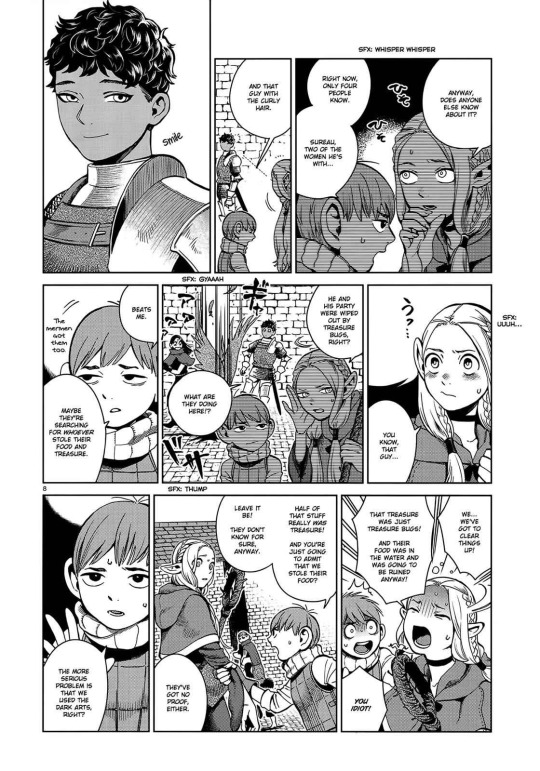
I was always puzzled by the split second interaction between Marcille and Kabru. Marcille blushing is the point, it’s in the anime too and it’s the focus of the panel. That moment of hesitation before she goes back into business mode where she looks at him back, and blushes. And idk I always felt like it was weird timing, like it was a weird beat Kui chose to put emphasis on, why the story even had them make eye contact in the first place, what point it could be making besides "Kabru is handsome and charismatic" which was already made with Hien and Benichidori below, otherwise it's not even like Marcille and Kabru ever interact. Like, maybe it's for it to be a callback when she glances at him while the canaries interrogate her at Thistle's house? Regardless, she blushes, but her expression is more akin to a "Uuhh he smiled at me why’d he smile at me like that. Oh he’s kinda pretty. Well anyways-" rather than swooning or truly checking him out. She’s frowning, even. And like I said, being very naturally charming was a point already made previously.
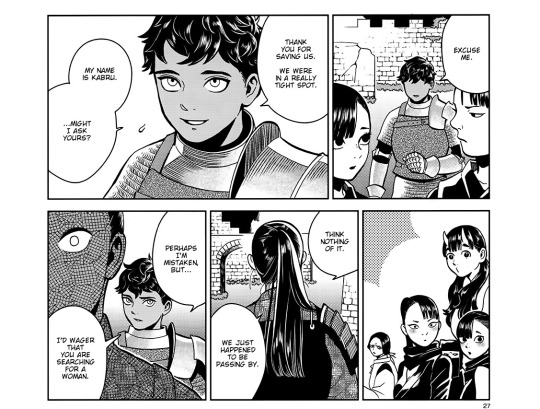
But then… This repeated reminder that Kabru is a lady killer IS the point, Marcille reacting to him in that way IS the point. Kabru is the epitome of ‘will say they help you but has hidden motives and might betray your trust if it serves their interest’ (not a diss on him tbf he has understandable goals), he is the epitome of looking noble, welcoming and chivalrous but actually being dishonest and manipulative, and what’s important here is… Marcille turns away and sticks by Chilchuck. Of course this is logical, no one would expect her to go running to Kabru lol, but I implore you to think of the thematics of it all, a princely guy, the closest character of the cast in the flesh embodying the prince charming persona, is giving her some positive attention, and it does affect her a bit but nonetheless she turns away, and strategizes with Chilchuck instead of trusting or giving good faith or getting carried away. She chooses Chilchuck. Unlike so often, she doesn’t let aesthetics sway her here, get in the way of her better judgement, distract her from the point. She chooses not to give good faith, even if he seems charming and friendly and smiles. Marcille is serious when the situation requires it that's now new, but this is in line with the lesson he instilled earlier above. And if nothing else, Marcille has a good memory, exhibit B to come later. Here we see part of why Chilchuck was afraid of Laios or Senshi but not Marcille blurting out the wrong things with Toshiro and is party, when push comes to shove they're often on the same wavelength. Marcille and Chikchuck do strategize with specifically each other regularly, they do tend to pair up a lot after all, so this isn’t especially new, but it’s the first time there’s this sense of us vs them imo. Like how earlier Chilchuck was saying that he’s better than the smooth talker type, here we see Marcille implicitly agree.
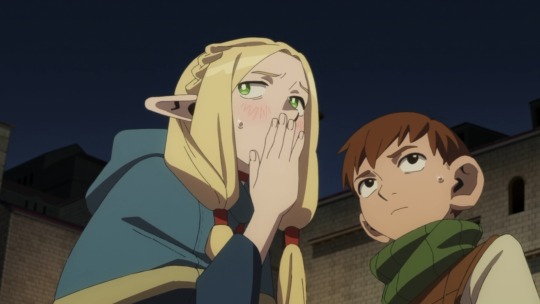
She just has a passing glance & thought for Kabru but she knows her true allies and true values, and she wants to strategize with Chilchuck. What I am saying is that if she was given the choice to think through going with a guy that seems perfect and chivalrous like her succubus, if she was logical about it she’d pick Chilchuck over that guy actually, yeah. At the end of the day, no matter the pretty smiles, she knows who her actual friends are. Whiiich on that topic, next section!
Ideals vs desires vs wants
It's succubus analysis time

Her succubus is quite direcly a prince figure, a knight on a white horse who's come to whisk her away. He calls her princess, even! She's taken the role of Daltian Clan's protagonist, essentially. He kisses her hand, nothing short of the most classic courtly romance tropes. He's even drawn in a noticeably more shoujo style, not unlike the characters' faces in the aftermath of getting their energy sucked by succubi.
I made a whole analysis on specifically Laios’ succubus but it covers some stuff that could be interesting for this analysis as well, I’ll repeat the essential stuff tho: Their succubus all show what type of social connection they desire. Izutsumi’s is familial, Marcille wants someone she can emotionally connect with, seemingly romantic, Chilchuck wants something physical and sexual so he doesn’t have to think and worry about anything deeper (betrayal, insecurities, etc, the difficulting that come with a committed romantic relationship- also likely related to his senses & stress), and Laios wants people and friends who’ll accept him and his monster interest- platonic.
But more interesting for this analysis is how succubi work. The goal isn’t to beckon, but to incapacitate. The succubus doesn't work on the basis of rationality, it’s not a factor they go for and it’s not one they need to appeal to either, as we see. (Laios is a special case -gestures to the linked analysis- but the succubus doesn’t appeal to his rationality as much as it soothes his worries, his friends judging him etc etc, and the reason Izutsumi could remain unaffected is that there is always a half of her not enthralled by the succubus because she essentially has two souls.) Neither Marcille, Chilchuck or Izutsumi could realistically expect any of the people they saw to be real and not fake succubis. They KNOW that, they were actively preparing for the succubi to jump on them and fight back, rationally they know they're monsters! But how this monster works is that it targets deep desires within you that when face to face with it'll make you hesitate, make something in you unable to fight or flight and instead do the third instinctive option: freeze. Or especially in Laios’ case, the form gives the victim just enough confliction on the matter for them to want to believe it’s real. All they have to do is just not move, stay passive and accept the attention, so it’s not an issue of wether they reciprocate an action or run away. It's so that it shortcircuits you and leaves you open to pick like a fruit.
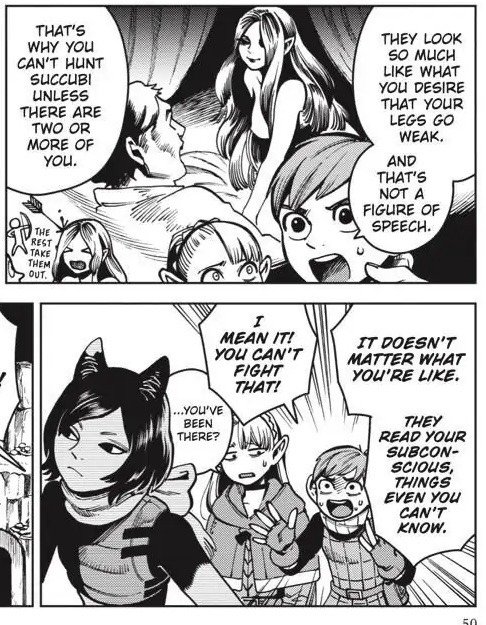
If this wasn’t the "reads your heart so deeply that it freezes you to the spot" monster, Chilchuck WOULDN’T be doing anything with these women. He’s been devoted to his wife even 4 years after separation on bad terms, you think he’d ever cheat on her? If this was a decision he were to make, instead of just freezing, he would reject it. In that similar way, Marcille’s succubus might not be what she’d rationally go for. You think if this was what Marcille had to choose, the person she wants most to see and at her side, her most alluring form wouldn't be Falin, alive and well? You think that wouldn't be the thing Laios truly wants most as well? And before people say that canon proved that the latter wasn't with the curse the winged lion put on him, THAT'S THE POINT!!!! You can irrationally desire things, you can desire things to degrees so deep you can’t change it even if you wish you could, but if it was truly a choice up to you, you'd choose otherwise. Laios decided to become king, even if that's a lifestyle so far from what he truly wanted, even if it is duty more than fun for him. Like how Chilchuck would choose faithfulness despite for sure having come into contact with many beauties through his four years of separation.
Ideals vs reality are a big Dunmeshi theme in general, same as wants vs needs, and you can see Marcille’s daydreams and novel themes make it an especially relevant throughline and theme for her. Not unlike how in my opinion General Hareus and Mithrun intentionally look very alike to contrast reality vs fantasy!
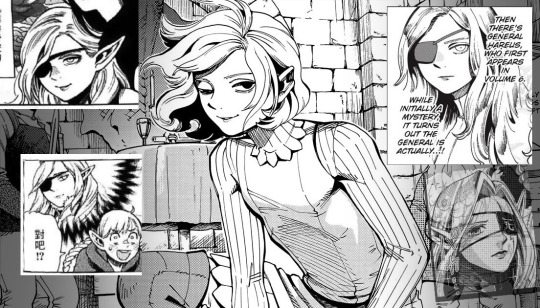
Marcille never reacts any particular way to Mithrun’s appearance despite the blatant resemblance, so that makes me think the point/joke is meta rather than character focused. The romanticization of elves and their societal drama in their fiction contrasting heavily with a very real and imperfect product of their military system. The canaries certainly aren’t glamorous next to whatever military Hareus is the general of. There’s even the fun little details like Hagreus’ lips being drawn with extra details because they’re full and pretty while Mithrun’s lips are drawn with extra details because they’re chapped and dehydrated. Hence the fantasy vs reality theme, both in that fantasies can be very disappointing when realized and in that they may not be what you actually want past your mind palace. Marcille doesn't even react to him- which we could almost directly parallel to how pretty young blondes is Chilchuck's type but he never seems to make a big deal of Marcille- he still wants his wife.
So yes, themes of what you actually want vs irrational cravings. Base desires vs actual wants. Needs are also separate, but not relevant for this discussion. To get to the specific definitions I’m using for the words in this section’s header, ideals vs wants vs desires: ideals are your ideal of something, the best degree to which a thing could be tailored to you, and it can be derived from both wants and desires, usually a mix of the two, but for example: I’d say the succubus is a type of ideal (the platonic ideal of allure to the victim) derived solely from desires, because a want is active rather than passive, acted upon rather than suffered, because a want unlike a desire involves thinking things through. So a want: something you want, you take actions towards getting or achieving it, it can be a very strong feeling but it’s something you pursue or wish to pursue. Finding a cure to death is a want, not wanting to be alone is a desire, see, I’m assigning desire this more primal or unchanging subconscious nature to it. On the flipside with Chilchuck, sex without ties, easy pleasure, is a desire, but the want is not having to think about his marriage situation because it’s painful, not wanting an emorional connection because it’s all the easier to be hurt with, just wanting to take his mind off of everything for a while.
Thus the succubus targets Marcille’s wish for a perfect knight who could cherish her forevermore, someone safe and known and fantastical, just hers in a way, free to see and construct however she wants because he’s a character to interpret, and it targets Chilchuck’s wish for pleasure that’ll whisk him away from the stress and pressure and reality of his life, something that’ll make him feel both good and desirable and emotionally uncompromised, not unlike what alcohol does, as he says he likes having his fine senses dulled in the changeling chapter. Idealization is twisting the image of something in your mind to be closer to what you want, but usually mostly desire on a more subconscious level, to be true, almost a wish, sometimes but not always hand in hand with idolization which is to put something on a pedestral. Idealizing things that are easier to reconcile with mostly, in Marcille’s case: it’s easier to believe that Chilchuck is very young and it’s easier to stomach that Falin hasn’t aged much, it's easier to believe Falin is an angel who can do no wrong and if she left with Laios it's not that she chose to leave Marcille, and it's easier to believe Chilchuck is just a moody closed off youngster than an embittered old man. It can be done to people as much as concepts, like the idea/plan to give everyone a 1000 years lifespan, surely that'd do really well and everyone would love it. Wants and desires are both very often about changing reality after all, wether it be your situation or an event in your past or a law of the world like death, but wants are mostly through actions and since desires are more subconscious it can lead to self-delusion easily. Like with succubi, wants engage with your rationality so they target desires instead. The demon's strategy isn't too far off, either, feeding into both and using underlying desires to manipulate its victims. Dungeon Meshi is in part yes about resisting desires, the irrational cravings, mostly through the character of the demon. I mentioned needs earlier, and to ideals vs wants we also add vs needs, both emotional and physical, and needs alongside wants are what Dungeon Meshi wishes to promote for a healthier person, Dungeon Meshi which illustrates very well with the dungeon lords that you can be a slave to your desires.
The parallel between succubi and demons is intentional. The demon is in fact the origin of the succubus myth in-world. No wonder they operate similarly in many ways- the succubi are in a way a more simple straightforward version of the demon, with less convoluted strategies and less intricate manipulation.
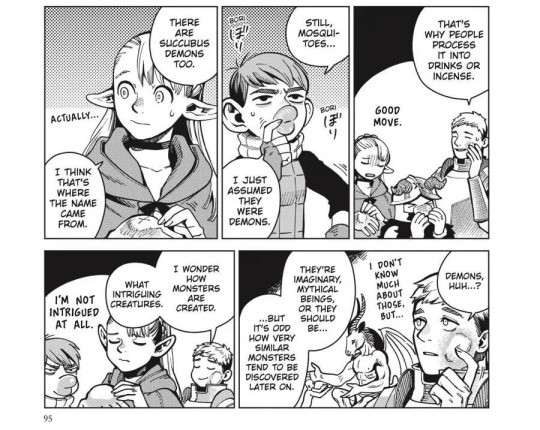
Of course the succubus each character sees does say something about their characters, but what I’m saying is we shouldn’t assign choice or morality to it as if it wasn’t an ethereal monster whose whole biology is focused on being able to freeze people through appealing to desires, much like how we can’t fault people for falling for demons’ manipulations. Like that’s their WHOLE thing and they use mind control through enticement shenanigans. I know people sometimes fault Chil for his succubi and if you want here’s my stance.
Point of this whole thing is, people can rationally choose things that are different from their deeper desires, like in truth Falin’s safety being more important to Laios than becoming a monster. Like how Marcille stayed with Chilchuck to strategize instead of wanting to give good faith to Kabru. Yes, this is the main point I'm coming at with this section lol. Marcille idealizes and idolizes the figure of a perfect prince charming, undoubtedly! But when it comes to what she actually wants, not in some ideal fantay world but in reality, she knows Chilchuck and her imperfect friends are some of the best she could ask for. She's content with them as they are. She would choose a flawed reality over a perfect fantasy.
That's a big part of what her dungeon lord arc is about too, all her tendencies to ignore what others want for what she thinks is best for them or thinks is a perfect course of action: accepting that people are complex with different wants, and that something that's a no-brainer to her like wanting to live for a long long time is a solid no for many. And Laios and the party confront her about it, and Marcille, even under the influence of a demon, chooses to accept reality. Chooses to accept that there are some things that, even were she to be able to, she shouldn’t change after all (even for stuff that’s not forcing everyone to live for a millenium, like bringing Falin back from the dead is something that the party and Marcille had to come to terms with maybe not working and the way they went about it was self-centered). She chooses to come back to herself and the party, to accept the world as it is even if flawed and sometimes hurtful.
And hm, I wonder if Chilchuck had any role in the lead up to that particular decision... I wonder if Chilchuck was a major influence in teaching Marcille that the world isn't perfect and her internalizing things that were outside of her bubble!! I wonder if Chilchuck was directly what made Macille turn towards her party and thus start thinking of giving up on being dungeon lord!! Joking, joking, of course it does. To be continued, see you in the princess imagery section at the end of this essay.
Essentially, this section is to show that: 1) despite what her succubus may suggest, she has indeed grown by that point in the manga compared to pre-canon and her overly idealistic simple black and white vision of things, and it doesn't prove the ‘choosing her friends over a prince thing’ wrong, and 2) despite how deeply ingrained romanticism is in her and how it calls out to her, she still has chosen and continues to choose reality and her friends over it. How fantasy is important to her and how much she loves it, and her having the will not to mindlessly succumb to it coexist and it's that resistance against fantastical ideals that speaks of her as a character so much.
And what does that mean, for Chilchuck? For him and Marcille?
Deconstructing realistic romance AKA compromising between romanticism and reality AKA Chilchuck Tims vs Prince Charming part 2
So what we’ve covered so far is that 1: idealization is something that Marcille does a lot, including concerning Chilchuck, 2: the prince/knight figure is meaningful & important to her, 3: Marcille isn’t a lost cause on it, and for instance, much like how she stops harping on Namari after Chilchuck explains to her how professional reputations and networking work, he can change her mind on things.
Let’s get back to their prejudices of each other for a bit. You might have to zoom in for this one.

Her shapeshifters of both Chil and Laios are influenced a lot by looks and impressions. She’s very adamant about Laios and Falin not looking alike at all, for one. Marcille’s view of Chilchuck’s lockpicks are surprisingly accurate. Meanwhile, despite their first big relationship moment during canon being about how he’s glad to have her and her skills for the dungeon dive, he still ridiculizes her magic somewhat with the crude spellbook. She’s still silly and tease-worthy to him, even while he praises her like in the good medicine chapter with Leed he says it himself in the same breath. Silly, or "ridiculous" depending on the translation, is somewhat ambiguous, but I assign it the meaning of 'thoughtlessly reckless', like how again in the good medicine chapter when he's saying this he's referring to Marcille's future job prospects, because law and career are important to conform to for him. Despite this, their shapeshifters’ behaviors are accurate, although Marcille’s Chilchuck is nicer and less bitterly reclusive. Note how it's Marcille's chilchuck that makes it furthest and how why she thinks hers is the true one is that her Chilchuck "looks less mean"- this is what I mean when I say she idealizes him and sees him as a little angel, along with his fluffier hair it gives us the perspective of why she'd find him so hair-ruffable and why she likes sticking to him so much, I suppose.
Marcille's arc of not seeing Chilchuck for what he is has steps, it's not like Senshi who does an 180 seeing his changeling. There are a couple of important moments for it that tell us her progress and changes her perspective: Him telling his age -> the shapeshifters (our best look into an objective assessment of her perspective) -> reveal that he has a wife and kid(s) (fully shattering her denial) -> seeing him as a changeling (true reckoning. Putting the nail in the coffin of what reality is) -> bicorn chapter (acceptance. Internalization)
You might notice that the explanation for Marcille’s Chilchuck is "Even though she’s been told he’s an adult, deep in her heart she still doesn’t get it", and a fantranslation translates it as "Understands he’s supposed to be an adult, but hasn’t quite come to grips with the fact internally". This definitely implies her arc of growing to see him as an adult had already started by then. Especially if we compare it to Senshi’s more intense babyfied Chilchuck. This goes back to what I was saying about Marcille watering down people for the sake of aesthetics, some rational part of her knows he’s an adult, but it’s emotionally that she struggles to reconcile the fact with her perspective. It’s actually pretty ambiguous when she first starts considering he might be an adult. If by this point she was already digesting it, then I think it must’ve been when he told the party his age. It’s not unsimilar to rationally knowing Falin is an adult at 23 even if it doesn’t feel like it to her, or post-canon calling the Touden parents kids even though obviously she’d know they aren’t actually, it’s classic longlived race patronization. He’s older than Falin, by 6 whole years, and even Marcille isn’t that blind to what that'd mean. Wouldn't marcille also have a problem with child labor otherwise? There's also how Marcille pre-canon shortly speculated Chilchuck was in love with Namari in her Adventurer's Bible extra. She for sure has witnessed a lot of half-foots walking around, probably even drinking at taverns. She knows, on some level. Chilchuck even does a whole rant after they react going on "this is why long lived races are condescending assholes". So that’s my bet, "Is he an adult?" "Well yes but actually no" (Chilchuck), "I’m an adult now I’ve grown" "Awww you’ll always be like a kid to me!" (Falin) Depending on the dub and interpretation, I know for example that when I made my family watch the anime they thought Marcille "See? You're just a kid!" after he said he was 29 they saw it as teasing and playful, unserious, or even disappointed, implying she'd have thought he was older than 29. It's actually ironic how someone as developmentally atypical as Marcille, whose physical and mental growth was unpredictable, unsynchronized and messy, would judge others by appearance and age so much. But well imo appearances are important to her so in that way, she especially judges those because she had to live through being judged by those standards as well. She puts elven standards on everyone the same way she does with beauty standards, so age is included in that.
Marcille here is struggling with dissonance, it's why she "hasn't come to grips with the fact internally". And this all makes sense for the arc that sharing things about himself is what opened the gates of being understood better. Point is, her vision is influenced by her own feelings of how things should be like, veiling herself to the reality of things.
And notice the point that the problem her lack of rationale when it comes people- Chilchuck regularly makes her prioritize rationality over feelings, and well that’s somewhat his whole schtick when it comes to debating philosophy. With Namari and how her leaving the party and not returning is reasonable even if it feels wrong, just like the "don’t trust someone just because they seem well-meaning and generous, strategize instead of swooning", and ironically also the "it's important to take in mind how things like touch when healing can affect parties and create love triangles" lol, "don't be emotional, and also remember people being emotional will stirr up shit". Since she’s someone pretty swayed by feelings, it balances her out. Ultimately, if we consider the Dungeon Lord arc her culmination, it’s Chilchuck who ends her arc by meeting her halfway through appealing out to her feelings, but that’s the flipside of the coin of their arc, and it’s her willpower to face reality that saves them so I don’t think that contradicts that Marcille had to do her half of the journey & comprise.
I would argue there are many hints of Marcille knowing on some level he's an adult throughout early canon. Not just seriously calling him the most mature of the group, but her behavior at the Golden Kingdom's too for example. Would you act all shy asking a kid to sleep in his bed, especially one she's always felt so comfortable trampling the boundaries of and touching casually? Idk that's weird. She's asking to sleep in his bed because by her own admition it'd make her feel more comfortable. Chilchuck is safe to her and she feels shy implying it and asking for a favor like that. Shy that he'd find her silly for it, and/or shy that this might be inappropriate according to etiquette and in other contexts. To me this feels much closer to two peers, like how in the mandrake chapter she wanted validation from him too, and yes she still infantilizes him and emasculates him into someone who's harmless in her mind- not just someone who wouldn't hurt or take advantage of her, because she knows that, because Chilchuck does protect her (more on that later!!).
He's not heroic, but he's brave, when it matters. He's mean and rude, but also caring. He's responsible, even when it means going the unpleasant route. The aesthetic doesn’t fit the role, but the actions do.
He keeps claiming he’s a selfish coward who’ll be the first to dip in a fight, and yet he’s always, consistently pulling her out of danger, or specifically calling out to Marcille when danger strikes. And I think it’s because of the nugget of info we get in the adventurer’s bible that her stamina and athletics are bad, in canon he does call her clumsyhead like once but it never felt enough for me to deduce that on its own personally. So then the reason why he’s always targeting her, beyond the reasoning that she’s the healer thus the most important to keep alive (which he brings up in the rabbits chapter), he takes it upon himself to help her, save her and pull her away from danger because she’s clumsy. She’s not defenseless, she’s known to use explosions, and still he feels the need to save her and through the manga he’s even died trying to pull her to safety one and a half times: dungeon rabbits + the drowning- they didn’t die in the latter though it’d have gone that way if it weren’t for the water bursting out just after, and that situation was especially hopeless regarding Chikchuck being able to do anything to save her at all, yet he still tried.

A little knight in shining armor, a little noble hero, a little prince charming innit?
Chilchuck IS all show and no talk- and she knows the value of that!!! It's why despite all his sour demeanor she respects him both professionally and as a smart guy she can trust, why she feels safe with him and wants him by her side when strategizing or even sleeping. The aesthetic doesn’t fit the role, but the actions do. Fantasy vs reality!!! He teaches her how to face reality both with his words and actions, through the contradictions of him, his caring behavior and bitter words, his old manners and young looks!
And actually let's TALK about that drowning scene hello. There, in the collage above, in the bottom left. The context of that is: This is after the demon leaves when the dungeon collapses, the dungeon gets flooded by water and they go under, with no sense of where or how there could be an exit to this. 1: Since the dungeon is collapsing and reviving someone only works in dungeons, there is no guarantee that Marcille or anyone would be able to revive someone during or after this, NONE. 2: He is risking his life for her, he is STRAIGHT UP playing his life on this choice, action hits and shit gets more serious than it ever has, and he yet does it anyways. Perhaps it's the gravity of it that pushes him to make this choice, that this time if someone dies it's for real and he can't accept that, but either way his choice is made in a split second, he prefers dying trying to save her than living without saving her. He is fighting for scraps of hope, seconds more of holding onto life. Which, 3: This situation is HOPELESS. In the end yes they end up being spat out by some exit out the dungeon with the strenght of the flood, but there was no way to know this would happen, and like we see in the third panel Chilchuck and the others actually lose consciousness. That's for "a way out of this", but even moreso, what is he hoping to accomplish? He's small and weak like he always reminded the party in fights, he CANNOT PULL HER UP TO SAFETY, HE CANNOT PULL HER AT ALL, WE SEE HIM STRUGGLE TO AND FAIL. HE CAN'T DO ANYTHING BUT HE STILL TRIES DESPITE THE RISK. You might also say- haha!! You might also say that this is a show of optimism from him!! You could say that after Marcille changed him, pushed him to have more hope in him, he now has the strenght and will to hope that this might do anything, that this might save her! A little similar to the situation with his wife actually, the point is that the chance is worth taking even if it might not turn out like hoped for- the point is that it's always worth trying and keeping hope to fight on, there is risk in being vulnerable and reaching out to his wife yes, there is risk, as with jobs, as with finances, as with anything- It's not that you'll never fail, but you have to not give up when you do- there's a risk but you can't just shut yourself off to the world and to relationships, you can't suddenly care about nothing! That's Chilchuck's arc! And maybe it's because his arc of becoming more hopeful and open yourself to caring centers her that it's her he latches onto here and not Senshi and Izutsumi who are equally in trouble here, maybe it's because he knew her longest or because he still feels this sense he has to look out for her like always, or because he trusts her to breathe underwater least, I don't know, but it's what happens! And listen, by all intent and purposes it was a hopeless situation, they were on the verge of drowning but he still fights to save her, and everything looks lost for a sec, but then the water current miracurously spits them out of the crumbling dungeon. He gets up and he runs to marcille fearing she's hurt but no, they're saved, she's fine, they're all alive and out of danger. It worked out. Having hope was right.
They make me ill I tell you. Like what the HELL, am I supposed to NOT go crazy when this happens??! What if they were the meaning of life what if their arc was about cracking the balance of living and loving healthily and cracking the code of life. Okay. Okay okay okay so anyways so
He can be quite self-sacrificial and noble! Always looking out for others, and giving Marcille particular attention in that regard, likely in part due to her being clumsy in his eyes and her being the healer aka their token of safety.
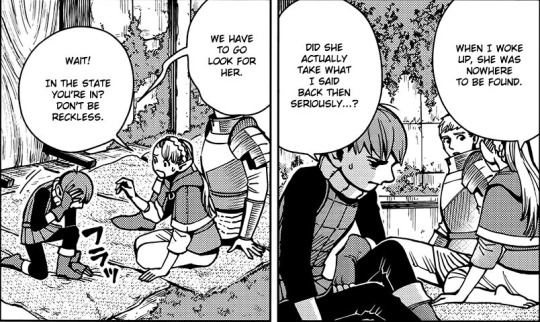
Sit your ass back DOWN you are in no state sir. Despite her biases Marcille is still observant, she still loves dissecting people like in that pre-canon party relationships chart in her extra, she's still the one to say "Chilchuck is the most mature here". Marcille still notices things! She has an interest in people and Chilchuck is someone she especially likes to "study". She read him like a book in the bicorn chapter, and if she was able to it’s that she looked, she remembered, she saw. The way he doesn’t like waiting on people, that he’s very reserved with feelings, the way he often doesn't pick up on others' and even his own- It all comes through in her quote unquote analysis of him, what married life with him would be like and how he reacted to his wife leaving.
Point is, Chilchuck is very harsh on himself, but there are gems inside of him, there is gold hidden away if you dig at his heart. And point is, Marcille is good at highlighting those. And besides, isn’t humility a mark of heroes?
Okay. Sooo there's not that much to say about the changeling scene actually, for both Senshi and Marcille, the chapter just previous where Chilchuck reveals he has a wife and kid is what fully reckons them with how Chilchuck is a fully fledged adult, and for both of them seeing Chilchuck as a tallman is the final nail in the coffin. With Senshi it's a rather fast 180, and he mourns the sweet kid image he had of him where he poked his cheek and ruffled his hair, but for Marcille it's just an extra "he's really really REALLY really not a kid. Really". It has a bit of a reversal of Marcille and Chilchuck's dynamic, since now he can manhandle her instead of her manhandling him. This is a rather pleasant experience for him from what we can tell, whereas Marcille is struggling to keep the party's walking pace and complains about the heat implying half-foots are more sensitive to temperatures, Chilchuck finds having his senses dulled relaxing, has no problem of the sort Marcille is having AND! And! He can pull her around. The fight with gargoyles happen and he's pulling her arms, picking her up, he even throws her both before it and during the fight, he has the physical power to push her away if he wants to and also to pull her out of danger- the way he later tries to in the rabbit chapters and with drowning, but also when the Faligon reveal happens. He still doesn't look like a knight in shining armor, and he still doesn't have the demeanor of one, but he has the most power to protect her than he ever has. Anyways so yes, further "oh Chilchuck is an adult. And he's kinda knightly and can protect me wow. And also ugly not at all like elven beauty ewwwwww. I won't be able to unsee it now if I try to ruffle his hair after this".
It’s always a question of seeing more facets to someone and slowly digesting them and internalizing them, like Kui puts it herself in the shapeshifter explanation for Marcille's Chilchuck. And this illustrates a bit what I was saying in the section about Dalclan and tropes and people being "digestible" to her. She has to get used to the idea first and it's a slow process.
And during the succubus chapter as well, right after the bicorn chapter where she fully accepted Chilchuck as an adult, Marcille doesn’t falter when she’s confronted with seeing Chilchuck as, for a lack of a better term, a sexual being. She even cracks a (albeit sfw) playful quip about it, about them being all blondes. I suppose with the crass jokes he made like during the frog comic that might have prepped her for it lol.
And on that topic... We're here guys. The holy grail of Marcille and Chilchuck.
🔥The bicorn chapter🔥
The chapter finishes both Marcille and Chilchuck's arcs about harmful idealization vs not being a doomer, so to speak. It's the culmination, the ultimate balance found, the moment where the lesson gets fully internalized on both sides at the same time. It is a MASTERCLASS in how to do relationships arcs and character studies.
Chilchuck starts the chapter being dismissive of Marcille and her interests again, it opens with a narrated bit about his bad experiences with romance in past parties and he admits he has contempt for people who find the topic of love fun. He sees her still a bit as both a fly circling around him and a venus fly trap waiting for the opportunity to pounce on him and not let go until he spills everything. He ends it though, willingly giving up information on him in conversation with her, opening up, and appreciating her perspective on his romantic troubles.
Marcille starts the chapter having mostly processed that he's an adult, asking him about his wife, but she's still Weird about him and his personal life- and okay, that doesn't quite change, but something does change- everything changes for a moment, in fact.
And what's the catalyst? The cataclysm, even? Chilchuck lies and says he cheated on his wife.
[Okay guys I am officially out of pic space, sorry but I'll have to start recurringly linking to images instead: page]
We get to see live Marcille's esteem for Chilchuck plummet and freefall to the ground. And Chilchuck often acts like hassling and teasing between them is onesided, that she's always the one harassing him, but since early manga Chilchuck has always liked to tease her every opportunity he gets, often initiating interaction just for it... During half of this chapter Marcille is giving him the cold shoulder and we get to see that he misses her, we get to see her fully shut down the (racist) joke he throws at her and see him be SHAKEN over it. He wasn't expecting his lie to tank his reputation and relationship with the party members this much, maybe because before whenever he called himself selfish and cowardly no one seemed to think less of him for it, and he's at a loss for what to do like we see here. He misses their friendship. He's always said he didn't care for having a friendship with them all and whatnot, but here we see him grapple of the aftermath, of knowing what it would be like without them as friends, without them at all.
[page 1, page 2.]
And like with his wife, he has a choice to make. Be passive and spiteful and do nothing, or be vulnerable and communicate to win them back over. And this time, after a manga's length of learning little by little to be more open (and literal coercive torture) he chooses to do it, to try and clear up the misunderstanding.
And listen, on Marcille's end this was NEEDED. He DROPS in her eyes to deserving no respect- but even in these times we see her be jealous of Chilchuck opening up to Senshi, implicitly still caring about what he thinks of her, and most importantly that she does still care about him himself when the bicorn breaks his arm and she runs to his side to heal him, worried. Why was this needed? Because Marcille was forced to have her full, complete vision of Chilchuck shattered. Not only is Chilchuck not little in her eyes anymore, but he's also no angel. He can MASSIVELY- borderline unforgivably- mess up. He is an adult who can royally fuck up, even be immoral. She calls him a depraved adult man.
It sounds negative, but what this does is actually strip him from any idealization and infantilization in her eyes. Is there something more adult than adultery? Is there something less honorable, less wholesome? In this chapter Marcille is forced to reconcile the Chilchuck she knows with this man who did something vile to his wife, even the mother of his child.
And then Chilchuck clears things up, he takes the risk of an argument and actual rejection and sacrifices the secrecy around his family situation to make up with her. And it works. Instantly.
And so he goes "Okay so one day she left me and I have no idea why, probably for no reason. The end. What a petty thing to do am I right. We'll probably never talk again." and she's like "Bet? Actually I have several ideas as to what could have happened and you WILL listen."
(For a Chil & Chilwife analysis go over here instead btw.)
She was always perceptive, but she always had a bias that made her vision of others flawed. Her lens of novel worlds and narratives. Remove, or at least shift that bias in a productive direction, and you get a strength rather than an hindrance. The skill of self-inserting (literally. The half-foot depicted as his wife is even literally Marcille a a half-foot, and his child looks just like him, to show just how good her imagination is lmaoo) Marcille is such the "If I wanna hit the ball… I must become the ball" type. As proven by how she controlled her familiars in the hypogriff chapter. "If I were your wife I’d be overjoyed to go out with you and would get myself prettied up while you complain about me taking a long time, your friends would tell me that I’m cute and nice and that’d make me happy, but I’d also be sad because you wouldn’t tell me that you love me enough. Then I'd leave to test your love, and you're failing that test rn but if you came back to me even after a long time I'd take you back for sure." And see these! See Chilchuck frowning there in how she thinks of him, how he gets peeved when she takes time to get ready.
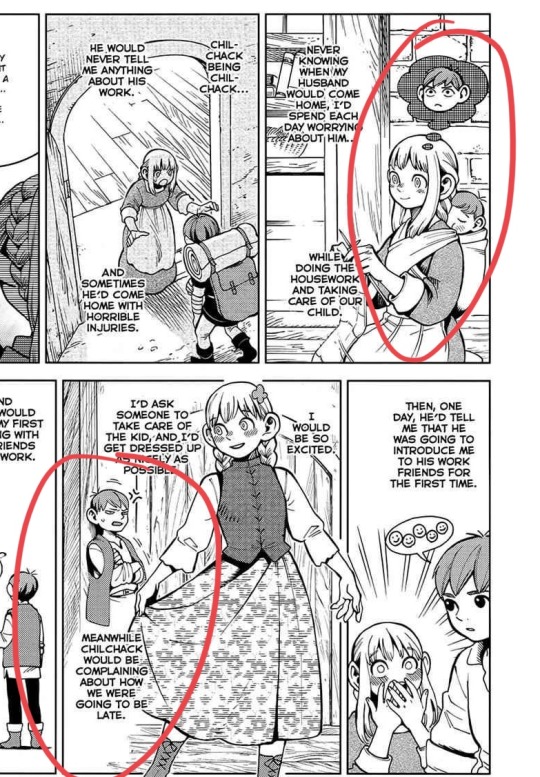
No because, this means everything. Marcille started out the manga thinking he was just a kid with a party pooper attitude and even in the shapeshifter chapter where she’s more coming to terms with her having been wrong about him, her shapeshifter of him is sweet and cute and nicer like "No the REAL Chilchuck is much less nasty! ☺️". But in the bicorn chapter it all comes to a head!! Learning that "Chilchuck cheated on his wife" made her esteem of him tank to rock bottom almost, finally acknowledging that Chilchuck can both make adult mistakes and be significantly flawed. But then! The chapter ends by him opening up which in turn make her esteem of him comes back up, but things have changed, still. What she does with her "virtuous husband" bit might seem like idealization again, and she is being optimistic about the wife'smotives, but she’s not making him into something he’s not! She recognizes his flaws (embraces them even.) Like how as the wife she thinks of an angry/frowning chilchuck, how he complains about waiting on her, which he's also done to Marcille before...
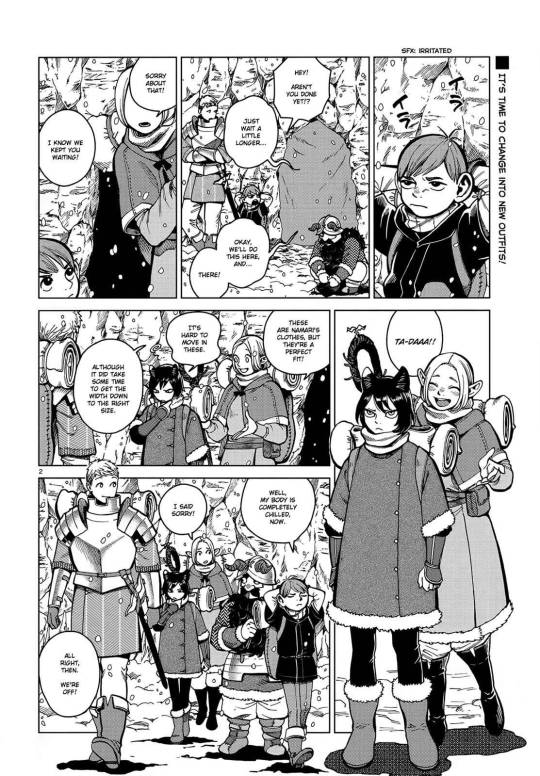
Even the way she says "he wouldn't say that he loves me enough" IS DIRECTLY SOMETHING FROM HER OWN EXPERIENCE FROM THE MANDRAKE CHAPTER. Because then she wanted to hear from his mouth with his words that he does value her, that he does appreciate her, that she's not a burden to them! She knows how it can feel like he doesn't appreciate you even when he does, and how insecure it can make someone! Now when she flavors things, she takes the embellishments from her own experiences instead of from novels! Reality, too, can be romanticized without becoming pure fantasy. Fantasy doesn't have to be dry and bitter, it can be beautiful and fun, too. Her "if I was your wife, life would be something like this and I'd feel like this" is truly based on her own perspective and feelings- her empathy and interest in others is not a weakness like Chilchuck thought, it's borderline a superpower.
She doesn't just keep his flaws in mind, she also hypes up his qualities!! He is virtuous, bicorn approved, devoted even after separation!! And that hyping up, and optimism that things wouldn’t necessarily go bad if he tried to mend things with his wife, really gave him hope, and also finished up his arc about optimism not always being bad, sometimes even being necessary.
She inspires him to think that things can work out, that he can still be pleasantly surprised even with all his bitterness. After all, he opened up to Marcille and they talked just now, and she forgave him and they made up, didn't they?
And he must have never quite let go of all hope, must stil lhave some left in him hidden somewhere, because in all those four years of separation never has he stopped calling her his wife in present tense, because even after all of them he has stayed faithful and never moved on.
And all of this with the chapter ending with Chilchuck eating a sweet and savory sandwich, which he thought would be bad and inspired disgust in him at first, and being like "Huh, the sweetness actually complements the bitterness pretty well."

THE SANDWICH IS THEM. "Syrup in a sandwich? Sweetness has nothing to do in a meal." IT'S OPTIMISM AND PESSIMISM COEXISTING. IT'S SWEETNESS AND BITTERNESS BOTH HAVING THEIR PLACE IN A DISH. IT'S MARCILLE AND CHILCHUCK COMING TOGETHER TO HAVE THE RIGHT BALANCE FOR HIM TO BE ABLE TO SAY "It might not go well like in stories, but I'll still try".
Remember what i said about compromises earlier, balance of optimism and pessimism? He tries it, and it works out despite having no faith that it’ll be good, and he’s pleasantly surprised. SURPRISES CAN BE PLEASANT! They're not just life-shattering, not just dangerous, it is possible to be pleasantly surprised! And this is why Kui is a goddess of telling stories through food.
He’s opening up to her, as he takes that last bite of the sandwich, he willingly and easily gives up an information about his family for the first time <3

And this isn't only chilchuck adopting her perspective either, it's him completing it. Marcille still simplified the conflict between him and his wife, still couldn't have the whole picture, still put a positive and hopeful and romantic twist on it all, but she did have a point. Chilchuck reaches her halfway, is inspired by her, but he also complements her, says okay, but also this, also it might not go as well as that, not going against it but building on top of it, not trying to replace it but instead this optimism and cynicism coexisting, joining together. Marcille brings him back to the reality that he doesn't suck as much as he thinks and things aren't doomed, but he also brings her back to the reality that that may not be enough, and in that uncertainty called life they're learning to be okay with it, to smile about it, to want to be part of it, hearts open.
Notice how she defends his virtues directly taking from Daltian Clan for her reasoning, as well! Comparing chilchuck to her novel characters to explain him, rather than overwrite him.
She’s such a wingwoman. Such a cheerleader. Couple therapist. Emotional support friend. 10/10.
Marcille: "he has a shitty personality sometimes but if he was my husband I’d still cherish him" Chilchuck: "damn I needed that" /hj
So this neatly ties the last bits of Chilchuck's reluctance to care about others and being cared about in turn, yes yes Marcille reads him like a book so well that he's left shaking, and this is it, really, their arc is about the balance in loving too much and loving too little, in stifling others with that love and care and interest the way Marcille does vs showing it so little that others don't even know if he cares at all, à la “if we want the rewards of being loved, we have to submit to the mortifying ordeal of being known.”
Marcille has a whole theme with the prince charming trope, with her idealization and storybook motif and this is sort of the "Well someone perfect like that isn’t very realistic and romance is usually more complex- and that’s ok and good, and flawed people can still be ✨virtuous✨" conclusion. Again, fantasy doesn't have to be perfect to be worth it, to be valuable and lovable and great and precious.
He’s the devoted virtuous man that she wants not the storybook prince that’s unrealistic and could crumble like a script at any time. He’s the perfect example of a flawed realistic but virtuous and devoted and loving family man. Far, far from a prince charming, but not fully detached from it either. Something worth fighting for despite the flawed cracks.
Marcille has this grand fantasy, this ideal of prince charming, a chivalrous gentleman knight, but through canon especially with Chilchuck she learns to not idealize people so much. That acts are more important than aesthetics. The bicorn chapter is all about Chilchuck’s romance being realistic: flawed. And it’s no coincidence that this is what ties their interwoven arc closed, because they learn to compromise, his pessimism and her optimism. Marcille sees and recognizes a romance that is both flawed and beautiful and is able to balance the two decently, meanwhile she convinces Chilchuck that yes it is worth fighting for and having hope for. Repeating myself but it’s easy to think she’s still idealizing Chilchuck during the bicorn chapter, BUT it’s important to notice the differences with the shapeshifter chapter, where her shapeshifter of him was "cute/sweet" "not nasty", an angel who could do no wrong. In the bicorn chapter, not only does he fall from her esteem a lot because she believes he cheated for a good part of it, thus acknowledging that he can be flawed and adult enough to commit adultery, but also! When she roleplays as his wife, she doesn’t erase his flaws!! She knows he has a short fuse and isn’t always pleasant, but believes that he’s worth loving anyways…
And see this is the point!! She romanticizes his life, not idealizes it. The difference may be subtle, but it's there. In romanticization there's how Ghibli depicts mundane scenes of daily life, portrays doing chores like cleaning clothes as something that feels good, something worth doing that doesn't have to be miserable. In Chilchuck's life, in his flawed relationship with his wife, she sees the beauty and light and love to highlight so even if the lifestyle is humble and even if the relationship is tense it seems nice, it seems worth fighting for. She's using aesthetics again, but to inspire instead of stifle, the way she uses them to hype herself up sometimes too.
This is it this is the thing! Her worshipping and idealizing the image of perfect prince charming that will whisk you away on an ethereal romance becomes her romanticizing a realistic flawed middle aged dad with personality issues and a failing marriage, that he still is worthy of love and having his cute grand romance story and his happy ending!!
Marcille has a very hard time conceptualizing a point where love can’t conquer all, right. She’s optimistic and if there’s a will there’s a way etc etc etc. Notably when Marcille speculated about Chil’s wife, she centered around the theory that his wife wanted to "test" him by leaving, that she didn’t feel loved and left to see if he’d chase after her. She believes that his wife would be ecstatic to see him again and reaching out would make them reconcile and happily get back together, no problem. Chilchuck and his wife have been separated for 4 years. When Falin left the academy she and Marcille were separated for 4 years. Marcille has to believe Chil’s wife is waiting for him, that she hasn’t moved on, that she wants to be found. There's a different perspective on time, but there's also... Just parallels. Parallels everywhere. Miss coping, meet coping in an opposite way! And so she teaches Chilchuck to not assume everything is lost before having even tried, and so he teaches Marcille to let go when it's needed.
And please notice how she doesn't even really think his wife may have just wanted to leave him, no the goal was for them to be reunited with their love strenghtened- Combined with her glazing Chilchuck, the underlying energy is that to her someone not wanting to be with Chilchuck, wanting to break off things with him and leave, is unthinkable. For sure she'll be overjoyed to see you, for sure she's just waiting for you to come back to her! Is there a sign of higher faith in him, of higher fondness? There's respect and like and loyalty there. She truly values Chilchuck, always has but it keeps only getting more and more cemented, more and more real the more he opens up and she gets to know him. It's embarrassing for people to know your wife left you? Think again! You've just gained 50 friendship points with your trendiest friend and she has categorized you as a catch!
She specifically loves characters who think they can’t be loved and pessimistic and dramatic… And story-fying him is literally what she does when she engages with the story of his breakup with his wife like it’s a story to decode, reinforcing the whole narrative about tropes and princes and how he comes to shape her view on them.
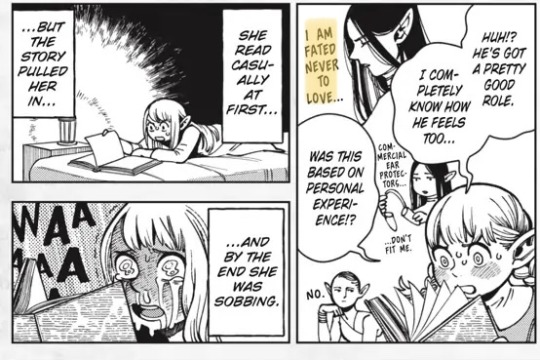
Even if the context here is explicitly that she relates! Which, she finds being able to relate to them comforting and a positive point so it being a "type" thing isn’t fully off- but this is what I mean when I say she always keeps a film of emotional distance from people, she wants to love and be loved and know people on the deepest level possible so bad but it’s something that scares her too so she prefers to chase after the safe: the unreachable- the fictional. Like Chilchuck. Bit of tangential speculation, but she wants to crack his shell and make him open up- but it’s also easier because he pulls away instead of pulling in/closer so the relationship is fully in her control in that way, if it weren’t for the teasing… Making her into someone silly in his mind is how he keeps himself from putting weight into her words, how he gets himself to automatically dismiss the wise lessons she tries to instill to him, nope sir he doesn't have anything left to learn, he's an old crouton who understands everything there is to know about this cruel cruel life yes sir. Because trying and being rejected hurts! Because if it wasn't fated to turn out wrong, then it means there was luck or choice, and that makes failures almost more painful! But people leave!! People leave and people come back and new meetings happen and choices are good, choices shouldn't be taken away! Not like how Marcille tries to forcefeed immortality to humanity, as a dungeon lord...
The chapter ends with a panel of Marcille and Chilchuck bantering again, with everyone else going about their business seeming nonplussed while the two are being very loud as if to say, ah, classic them. Return to normalcy, return to their usual closeness and shenanigans. All is well.
The Princess imagery
And now we’re falling into the rabbithole. Imagery doesn’t have to be anything more than imagery, but I discuss romantic connotations in this section (amongst the platonic reality of things ofc), you can skip to the conclusion if you’d rather but you will miss important analysis of the dungeon lord balcony scene, a big piece of the puzzle in wrapping it all up. I found the meaning of life & the world in marchil but it’s ok I get it if you wouldn’t... We're all built different ig. The character with princely chilvalrous knight parallels in the manga is moreso Laios, but Laios too breaks the trope a lot. Chilchuck gets prince and knight parallels but by contrast instead, in subtext more than any explicitly drawn. There's a lot to Marcille's princess imagery and though I've never fully covered it I try to somewhat tackle it here.
For as much as the bicorn chapter is what ends their arc about balancing pessimism and optimism and finding healthy compromises, the arc of their RELATIONSHIP is in the dungeon lord chapter where he fully opens up to her, inviting her to meet his family and all. AND MY GOD, the princess imagery!!
Listen I am trying so hard to keep this unromantic, and to be clear subtext is subtext for a reason, it doesn’t have to be concreticized or "acted upon" perse, but… I think it’s there in this scene, at least a bit. I’ve spent a long time trying to pin down what was so charged in it, besides both of them blushing, despite him offering for her to meet his family, despite it calling out to a genuine deep instilled desire in her heart enough for it to work- for it to make her turn towards them, despite the first thing she does after is shower him in romantic gifts, and it eventually struck me… It’s the parallels with other media, with tropes!! This is HIGHKEY Romeo and Juliet type shit!!! The stuff you see in every couple new kinda trashy romance kids movies! A lady, stashed away in a high tower by her lonesome, waiting for someone to call out to her from below… Romeo courting type shit with a heartfelt spiel implicit confession from underneath her balcony, offering him flowers because he succeeded in calling out to her heart…….. And they have to CLIMB to her.
Remember her succubus' words? "Oh, princess... I can't believe you slipped away from the castle yet again... Honestly, what in the world shall we do with you...? Come, let us return." Again like with her succubus, she’s living through a storybook trope but with Chilchuck’s twist, more nuanced and realistic yet just as meaningful, even if it isn’t strictly OR at all romantic and if it’s more complicated and less glamorous. She’d have to peel the layers to get to the vulnerable truth of it, like anything else. I'm just gonna drop this here...

Doesn’t it sound like a proposal. One that’s both so storybook-like, and contrasted with such real yet unromantic and grounded words, all about the implications rather than in your face grand gestures "Don’t you want to meet my family?". They literally have an arc about the topic of romance and this is the climax/pinnacle of it like god?? I’m not saying this was all intentionally crafted to be romantic but it nonetheless exists in the subtext, ripe for analysis. Of course they talk about planning together his reconciliation wit hhis wife, but the same thing happens regardless, he fully lets her into his life.
And again there’s something to be said about how that is what makes her finally turn around! This is extremely meaningful not only to Chil but to Marcille, the enticing thing that finally hooks her, gets her to finally look down at them. An offer to meet a flawed man’s flawed family, to help him mend it and its issues. It isn’t through the filter of a book, or mere gossip to her, she knows this man and she wants to be involved in his life, to know him and his family herself, ready to meet them and form connections. The clumsy, imperfect reality of a friend telling her he’ll let her into the other spheres of his life even if that means she witnesses the embarrassing and the ugly. It’s vulnerability on both their ends, offered and received, a gambit that was worth taking, both in the moment to talk Marcille out of being dunlord and long term of letting her in to see the deeper sides of him, there are take backsies once someone knows something about you after all. SHE STOPS BEING A DUNGEON LORD IN GOOD PART BECAUSE HE TOLD HER HE'D LET HER INTO HIS LIFE. SAY IT WITH ME, A FLAWED REALITY IS WORTH IT MORE THAN STAYING IN FANTASY!!!! In denial of reality, both that Falin hasn't grown older, that everything can turn out perfectly, and that everything is lost and there's nothing Chilchuck can do to make his wife love him again or even make his party listen to him.
Chilchuck says this after he sees her materialize her parents as doppelgangers. And so he goes on to say- hey your family will never go back to how it was when you were young, my family will never be what it once was either, but we can both move on and make the best of what we have anyways, isn’t that what you taught me, there are more out there! I’m opening up myself to new relationships and friendships because of your pushes, and now I want you to do the same! Life goes on and there’s always more joy and connections to be had! Stop isolating yourself, dammit!
And the thing too with Marcille’s arc is that she can’t get what she wants. She can’t. She can’t get everyone to live forever if she doesn’t take others’ free will away, if she doesn’t make the world stop for her as she plays god with the laws of nature and the cycle of life. And everyone’s important to that arc obviously, Falin during the story is the main object of that fear, and it’s moreso her death that pushes her arc along but it’s still extremely influential, Laios is the main one who sees her insecurities and talks her down, Senshi’s always harping on ecosystems and laws of nature and how resurrections aren’t natural and is there to offer comfort and support, Izutsumi’s someone new Marcille gets to take care of and her farewell talk with her reveals a lot about how she’s grown, but seeing this it’s easy to see why Chilchuck is paired off so much with her on their respective arcs, right? The one who tells it harshly how it is even when the reality is unpleasant, who gives up quickly when it's about things turning good for him but who always pushes and fights on when it matters with the party, who challenges a rose tinted glasses perspective head on.
He looks nothing like a knight but he still acts like one. He’s nothing like a prince or a dashing romantic courting lover but still he gives her a novel worthy balcony heart to heart scene. He’s painfully real and raw but she does bring that twinkle of hope and romantization that makes the world feel more wonderful to him, but like she tells him, he’s virtuous and he should give things a shot because people see good in him too and not only the bad he always shittalks himself for, she’s not making it up, he always had that sparkle of knight and prince in him.
Like, giving someone a handkerchief is literally a romance trope associated with nobles and princes. And Chilchuck has offered Marcille his handkerchief at least twice! The second time in the cockatrice chapter as a bandage. He keeps it in his pouch, with his tools, like the most must-have to offer it Marcille at any moment, ha /j. Prince behavior <3 The neckband like a knight’s favour, a token from a loved one he cherishes above all and keeps on himself at all times... Which I'll remind in her Chilwife roleplay she directly theorizes she was the one to knit it for him! Beautiful story tropes shit.
He IS a prince figure instead that now it’s not about idealizing the grand and overt it’s about romanticizing the small things in real life!! About finding joy and beauty in things that seem normal or mundane and uplifting them to make the world feel kinder!!!!
And man this whole angle makes the "Don’t you want to meet my family?" "-gasp- I really do want to! -turns away from eldritch power and living in her demon-made dreamscape that can allow her to live in fantasy to instead go back to flawed reality with her friends-" all that more meaningful and striking. A fitting end to her arc, a fitting hook to get her to turn back towards her and tempt her to give up on being dungeon lord. It’s always been just asking things and anecdotes about him and his family, never talking about meeting them, but by having someone so "fated with doomed love" open up and reach out to her "fated to never love", she opens up too, is willing to take the risk that any relationship entails, the same one that he took by offering it, the same risk they’re both averse to and scared of, loss and rejection. By actually meeting his family she involves herself in the stories she creates. It makes them real. She’s finally involving herself intimately with others, despite the real threat of loss that she will have to experience, wether through time and death or rejection.
Marcille and Chil’s arc, man…….. See, this is why I’ve been tilling the fields of that analysis for months this is why I’m insane about them, not only is there so much to say but her relationship with Chil straight up deconstructs her perspective on the world as idealized and influenced by fiction and fantasy and optimism. Like, he’s at the core of that part of her arc and man!! Man.
And the way that this is the culmination of their arc together… Like the ‘Chil calling out to dunlord Marcille on the balcony has Romeo and Juliette romance novels imagery’ take is one thing but the ‘their arc is about growing to see beauty even in the non-idealized, in the flawed and in the real’... It makes it so so perfect if she were to lower her ideal from a perfect elven prince to a virtuous halfling man (which she does romanticize).
So she doesn’t want a prince, she doesn’t want a general, she just wants this guy she knows, this friend she trusts as reliable, who has good intentions even if wrapped in unpleasant demeanor, that’s all she needs to be content and well and feel safe. By the end, he might even have become something of a prince charming to her, won over with heroic acts and virtues.
After all- Remember when I said she wouldn't be able to be as touchy so lightheartedly as before with him? Well wrong, apparently! This parallel from chapter 23 just before the red dragon fight vs chapter 96 at the final feast confirms that her like of him and behavior with him was unconditional of him being a kid or an adult. Marcille is just Like That and that she just likes him. A good part of what reads as infantilization truly is just how she cares for people in general.

Conclusion
She’s afraid of change, so it's only fair that he would be perfect to teach her a thing or two. She had fantasies but he had experiences, both had bias. Their arc is about how bitterness isn't an efficient solution to hardships, about how assuming the worst from everything is a trap that doesn't reflect reality either, a trap people fall into just as much as rose tinted glasses.
Their arc is about how relationships need work and how it's worth the effort! You can overwater a plant but you can also neglect it, to find a balance between each's needs can be hard but is always important. Friendships just like romances shouldn't be taken for granted, and doing the extra steps of deepening your understanding of others and opening to them is rewarding.
Their arc says that love is a beautiful thing regardless of loss. Something both of them needed to remember. Life isn't like a novel. Sometimes an ending ISN'T satisfying, you don't get closure and it might not even be happy, but that doesn't mean nothing can end well, doesn't mean every farewell is bitter. Peace is worth both fighting for and making for yourself. You can't shut yourself off from the world because things sometimes hurt, there's more of life to live- won't you come meet my family? Won't you meet new people, won't I try to mend relationships that are dear to me? My family is flawed, but it's still worth meeting, still worth loving, still worth fighting for and keeping even with all its flaws, no? Elven storybooks don't feature half-foots, but they're worth spinning grand poetic and romantic tales for all the same. Life is bittersweet, and that's an acquired taste to have, but one good to be able to stomach as a whole.
There’s a lot of reasons why someone would love fictional characters but be afraid of love in reality, not unlike with Laios' and Chilchuck's own experiences love has a layer of danger and fear because it can hurt to love and it can hurt to be loved. People can leave you, and in Marcille that fear's mainly through death but for Chilchuck that’s through just… Leaving. Through giving Chilchuck optimism and hope, drive to keep going despite these realities, she’s also growing to be more comfortable with the thought of relationships ending and moving forward regardless. And I do think that was part of her arc of growing to accept that Falin might be dead dead, I think Chilchuck was a big part in that. Falin is the passive object of the arc but Chilchuck is the active actor pushing it along, in a way.
Because people can always leave, Falin will leave to travel the world, but she might come back- and that's okay. And that’s exactly the thing that the story wants Marcille to make peace with! Falin wants and needs to leave and Marcille needs to be content just taking what she can get, wether it be time with people or the boundaries they set with her. THE BOUNDARIES! THE BALANCING OF OPTIMISM AND PESSIMISM! IT'S CHILCHUCK'S DOING!! "The world isn’t all good, but you should be able to see the bright side of what you do get" is what she and Chilchuck learn. To learn that she can still enjoy when she is there, and still reach out to her and keep in touch through letters- to do what you can and to get what you can and to accept that as enough, for it to bring you the joy and peace it can. Don't push your expectations onto others, wether that's being overly intimate or overly judgemental, don't be too pushy but also don't be too afraid and not do anything at all.
In many ways even before, even on the regular Marcille was his gateway into being more lighthearted, always exchanging playful jabs, laughing at her. Teasing her because she teases him, lowering himself to her level until he looks back and realizes he’s having fun with it instead of just throwing jabs bc he’s the master of sarcasm TM.
Chilchuck smiling casually and softly, genuinely, when saying that things don’t work out sometimes, is just so powerful. From the man who always assumed the worst of everything, who always spoke of life and the world bitterly... By the end, while saying these things he’s smiling openly rather than smirking smugly. Carrying on with his go getter attitude with a touch more optimism in his heart. Now he's made his peace with life and sees the good in it, still.
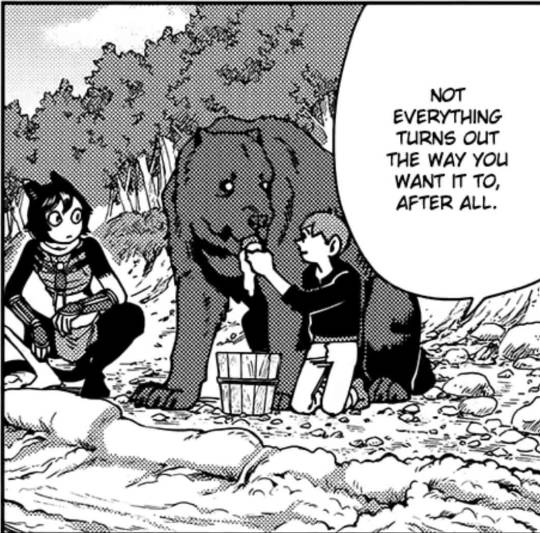
It's all about... How flawed relationships with flawed people can still be made into somehing good and healthy that make the world brighter… How flawed relationships are still worth remembering and cherishing. Except the winged lion, there to represent abusive relationships you need to fucking DITCH.
Marcille and Chilchuck’s arc is about how in life sometimes books do close and end, but other ones can open and start, and to never give up on that. People’s lives, relationships, these things are temporary and inevitably end, but there’s meaning and joy in having been there for them, and focusing on the end and the pain and being pessimistic in it doesn’t keep anyone safe, not meaningfully. "It’s not all nice like in the stories. Sometimes, a book just ends." "And another opens."
Dungeon meshi promotes the important of balance for both a healthy body and a healthy mind, and optimism vs pessimism is one such case <3
MAYBE IT'S ALL COMPROMISES MAYBE IT'S ALL SWEET INBETWEENS. Maybe we'll take our vision of what we thought we could be and make something new together! DRINK IN MODERATION!!!!!! SEE LIFE LIKE FAIRYTALES IN MODERATION!!!!!!! THE RIGHT ATTITUDE LIES BETWEEN IDEALIZATION AND PESSIMISM
Disclaimer:
This was pretty messy but thank you so much for reading!!
Thank you to @/lyril for making the more complex collages!! Check out her blog!
To be clear! Does this arc exist in the text, the whole tropes and idealism vs pessimism thing, do they have tangible impact on each other as both characters and narrative devices? Yes. Is Marcille and Chilchuck the central piece of the story? No. Is Dungeon Meshi about this and how it all culminated into a cool Romeo and Juliette scene? Lol no. Chilchuck isn't the most important person to Marcille and her story nor is Marcille the one most important to Chilchuck. Just like the other major characters in the story, their dynamic and progressing relationship is a plotline/subplot amongst others, and the level of layers and subtext it possibly has doesn't erase any other part or subtext of the story. Arcs can coexist. Multi-layered relationships can coexist. Just a reminder that this is my own analysis and interpretation of canon.
Dungeon Meshi is about food and how it ties us to a life that’s worth living, about unity and trying to understand that which you do not, to not demonize that which is different or unknown, to connect with others even if it’s hard, even if it’s in unusual or undescribable unlabelable ways, and Marcille and Chilchuck’s relationship is certainly a pawn in these themes like every other relationship.
I’m having fun, but I don’t want anyone getting lost in the sauce. It's unfortunate that to many, acknowledging there's any merit to analyzing this subtext is equal to supporting a ship they dislike, but this isn't ship propaganda, this is analysis of canon text where I happen to see a more niche angle. You can disagree with an interpretation without saying that it's nonsensical.
Like I don’t wanna say I’m a marchil truther but if you define it as believing canon does have genuine and credible basis for it then yeah I guess I am. I feel insane everyone acts like they have no chemistry and no material and??? We exist on different planets I think Like I know I implied some romantic undertone but in canon it totally can start and end at two coworkers bonding and getting to know each other better and see each other’s perspective and it influencing them both for the better. No buts, you can totally do that. Although this plus the crumbs it drives me up a wall when people say they have no chemistry or ‘how come people see anything in this pairing?’ They’re literally a comedic duo? A comedic duo that interacts so so much that gets paired off in scenes, a thematic duo which is even acknowledged and reflected in the anime’s opening. He teases her 24/7 canonically because he finds her reactions fun/cute, the only person he teases on the regular, and she’s obsessed with knowing more about him and loves being touchy on top of it, plus reads him like a book because she files away every little thing about him in her memory, like if that isn’t a strong basis for a ship I think the bar has gone too high. I’m derailing but yeah just. Do you see all of this? They drive me insane, I feel like I’m reading the necronomicon when analyzing them, picking up on subliminal messages, I keep always seeing new threads. And it’s been my otp for like 2 years now, idk when they’ll stop having a grip on me but????? There’s just so much to dig into with them. There will never be another pair like them. Do you hear me there’ll never be another duo that hits all of these like this, do you see this insanity? They are my lifeblood and if i’m eating up anything them-related it’s because they’ve earned it so hard tbh. So yeah if I’m ever dramatic about marchil it’s because I have this 100k words novel narrative in my head and marchil is the meaning of life to me hope this clears it up
Which on that note idk what or when my next Marcille & Chilchuck analysis will be. I might very well make a bite sized, summarized version of this analysis because asking people to read all of this is kind of insane of me... And full disclosure I’m also very likely to edit points in or tweak bits every so often in this analysis because idk if I’ll ever stop thinking about it, and phrasing can improved. This has been in my drafts and outlined more than a year and I’m literally still adding extra points save me. I might also do a different angle on their arc because here yeah I mostly just dug at the prince trope angle, at ONE of many angles... Like one interesting thread in the manga is Marcille emotionally maturing and becoming more like her mother, on top of her regularly being a mom type friend the way she looks after Izutsumi and Falin, which could be interesting to pair with the fatherhood of Chil. Hmm. Anyways
And obviously do whatever you want, but this analysis and all is why I personally can’t stand the fanon that Chilchuck and Marcille have a father-daughter undertone. It goes against their arc together, which is explicitly, literally about her acknowledging him as a man, an adult, about coming to see each other truly as peers and her coming to validate him as an adult, then a father and husband from an outside perspective and a friend, and inversely him coming to not belittle her profession and philosophy. Their whole arc is about learning to see each other as an equal and equally value each other’s perspective and opinion. You could argue it’s also the arc that happens with Izutsumi, but honestly with her it’s a lot about Izutsumi learning to compromise and others instilling lessons to her onesidedly while learning to respect her perspective and boundaries, it’s not nearly as much of a reciprocal thing. Izutsumi needs to be heard, but she also needs people teaching her and guiding her. Imo it cheapens the arc, the whole point is that they’re just two people who grow to see each other as equals, that the Laios party is coworkers turned friends. Marcille doesn't need a new parental figure, she needs friends who'll keep her in check the same way she does them.
I do love the way that the manga avoids romance. For every romantic undertone there’s a platonic explanation that is just as compelling and especially to this degree it’s both rare and wonderful. I think that a lot of people need to learn that sometimes ambiguity is the point instead of something that needs to have a specific objective answer. Sometimes the intent is for something to be able to be read in different ways in itself, or that the complexity of the relationship is canonically something that cannot be put into a neat box. Which! Next analysis I'm very intent on making is gonna be about unlabeled relationships in Dunmeshi and queerness, see you there!
Fast and dirty TLDR
Marcille’s personality is very serious and direct. Due to this, she frequently gets into arguments with the master of sarcasm, Chilchuck. Chilchuck views Marcille as “the friend who cannot shut up”. He is often the practical foil to her more imaginative or idealistic views.
She actually thinks very highly of him! "He’s usually the most mature one of us" "he’s dependable, we’re counting on him" "No chilchuck is definitely virtuous", and at first it’s also through this twisted lense that he’s a kid, like she has to put people into boxes so they’re more digestible, tropes, in line with aesthetic, and at this stage it’s hard for her to see Chilchuck as being even able of wrongdoing really. And gradually that gets challenged when she sees that yeah, he’s an adult, and then BAM bicorn chapter- Because by then ok fine he’s an adult, but it hasn’t quite fully settled yet as we see in the shapeshifter chapter and she still has a warped view of him a bit, she has an accurate grasp on his behavior yet still sees him as a little angel. And then she "learns" he committed adultery. Her esteem for him hits rock bottom and she spends the chapter cold to him, she still cares and comes running when he’s hurt, but she’s set on mean mugging him, until it’s revealed that- He didn’t actually. Oh, actually he just has family angst. And she starts roleplaying and having her novel vision again BUT THIS TIME HER MIND VISION OF CHILCHUCK IS OVERTLY FLAWED. He’s angry and his wife left him, he’s *flawed*, but he’s still worth hyping up, still worth having his own romance story, still has a shot of winning back his beloved. She sees him for what he is, human and real and not a carefully scripted character that fits an aesthetic, and she thinks it’s still worthy of love and admiration, worth fighting for.
The prince charming figure has importance in Marcille and Chilchuck’s arc, where she romanticizes things to a sometimes worrying degree or idealize people into something more poetic, easy and digestible (like Chil being a kid, and then him being a virtuous ✨✨✨husband), and where she needs to learn to value aesthetics less and actual acts and facts more, be more grounded (like seeing people for what they are flaws and all, but seeing their virtues too, like accepting that people need money and not pulling through on principles of honor or unity shouldn’t get Namari shamed) and a part of that is accepting that Chilchuck is BOTH flawed and virtuous, a loving husband that still has shitty moods and fumbled his marriage so bad etc etc. So it’s like, her image of perfect prince charming that will whisk you away on an ethereal romance -> realistic flawed middle aged dad with personality issues and a failing marriage but who still is worthy of love and having his cute grand romance story and his happy ending.
Their arc together is literally learning to 1) see each other for how they are and not undermining their qualities and capacities etc etc while still not leaving flaws unchecked either and 2) opening up to people. Marcille LITERALLY makes Chil open his heart up to hope like idk man. What do you want from me. He’s literally the guy helping her through deconstructing novels and fantasy and rose tinted glasses and like. Deconstructing the prince charming figure into something more real but still a virtuous husband like KUI KUI STOOOOP STOP I’M ALREADY HOOKED I’M ALREADY-
#Dungeon meshi#delicious in dungeon#analysis#character analysis#Meta#Marcille donato#chilchuck tims#dungeon meshi manga spoilers#spoilers#The day has finally come#Initially I just wanted to share the kabru bit but then I realized that you need so many building blocks to see my vision oogh#Marchil#Marchil bc the analysis is about their relationship in canon not bc this is a truthism post to be clear. Pls give this a chance#if i've ever managed to amass good faith with you and the topic interests you even just a bit please read this... Please maybe perhaps...#Y’all know me i analyze every second of chil’s life. Would I stab you in the back. Trust meeee#I’m here for a fun time pls pls no sending me hate just take the hot take or don’t#If you wanna know why i’m most brainrotted about marcille n chil in dunmeshi this is why!!! This!!#'what do marchilers see with their special eyes' GESTURES TO THIS!!! Welcome to the marchil necronomicon#started this analysis in january of 2024 send help#Flexing my literature analysis diploma… Insane overthinking shit layers deep like we did in college.#Dragging the subtext into the light-kicking screaming#this is so long and wordy sorry i'm attempting to communicate why their arc is so magical to me. Also I don't want my post to be misconstru#Fumi going deranged simulator descending into madness. This makes me ILL and TINFOIL HAT whenever I work on it like oh my god#RATTLING THE BARS OF MY CAGEEEE#it's all connected it's all So Much they make me want to BARF so much my mind expands. help#They were literally (narratively) made to complement each other and change each other for the better I'm so okay#fumi rambles#Man Marcille’s “from idealizing him to liking him even for all his flaws bc his personality is often kinda shitty” arc#and Chilchuck’s “prejudice against elves and mages into respect and trust” arc are everything to me#“Come back this instant *princess*!!! Smh smh what are we going to do with you” reenactment of the dunlord scene in spirit <3
155 notes
·
View notes
Text
The Heart Killers EP4: Is Bison Playing Dumb?
Before the series aired, I did wonder if we were going to get a Mr and Mrs Smith type scenario at some point. The 'I know that you know that I know' type mind game which goes both ways, where both parties are pretending to be none the wiser until the time is right.

Up until Episode 4, Bison had some reservations but there was some ambiguity in regards to how much he bought into Kant's attentions and believed his own words in Kant's defence. Since being poisoned, Bison's gut instinct is louder than ever before. Paired with Fadel's reproachful reasoning and the evidence against Kant is mounting up so fast that Bison's excuses cannot deter the warning signs anymore.
So when Bison goes to 'confront' Kant with a pocketknife in hand, he's on a mission of his own. Despite what this implies, he not going on the immediate offence. He plans to put Kant on trial. He's going to do this his way, not how Fadel expects him to.

Now Kant is a pretty terrible liar as far as liars go. When Bison closely scrutinises his every move under an accusatory gaze rather than one of just slight suspicion, Kant visibly buckles under the pressure. It requires him to lie in a much more overt, blatant and upfront manner, which he stumbles through under Bison's unrelenting spotlight. Later on Bison directly asks him, "You're not hiding anything else from me, are you?" You could read this as Bison re-assessing whether he can afford to give Kant another chance, but to me it felt like Bison was almost tempting Kant to lie to his face. He already knows Kant has not been completely truthful. What he may be re-affirming is the extent to which Kant is choosing to continue lying to him. 'You must know that I'm onto you, why are you still keeping up the pretence?'


Every time he questions Kant, it's an invitation to come clean; to drop the act, to fess up or slip up. When he presses, he's testing to see if Kant will forfeit the information himself, but he continues to dodge, swerve and deflect. And actually, it's no coincidence that their first ever interaction plays out on very similar footing. Kant initially flirts with Bison under a guise of bravado. When Bison doesn't buy into it because he dislikes the façade, Kant changes tack and goes for a candid approach. That's when Bison gives him a chance, and his smile says 'See, why didn't you just start with that to begin with?'

Unsurprisingly, it's when Kant 'drops the act' that Bison wavers because he detects genuine sincerity. Even if Bison is harbouring anger, he's also acknowledging that Kant hasn't lied about absolutely everything. And that's enough to maintain a small concession. Based on next week's preview, I wonder if Bison intends to play into Kant's guilt to see whether that prompts him to redeem himself.
After all, Kant is also a prisoner of his circumstances (though Bison doesn't yet know the full context). "I saw it with my own eyes. Kant was just trying to get away from his bad past." On an unconscious level, he feels a kinship with such a predicament, which is why he's biding his time. He's decided to continue the charade and call Kant's bluff by agreeing to be his boyfriend, to see just how far Kant plans to take this by giving him what he wants. A 'keep your friends close and your enemies closer' strategy, mirroring how Kant is equally digging for intel on him by getting up close. Why are you doing this? What's in it for you? What exactly is your motive? Where do the lies start and end? How much of what you feel for me is true, if any of it?

Bison's undecided. He's human after all and not immune to Kant's charms (which funnily enough is the same problem Fadel's currently having with Style). Every time Kant refers to him as his boyfriend, you can see Bison's heart flutter. The attraction between the two is undeniably there and that will still colour his judgement.
In the meantime, Bison appears to be mentally cataloguing every transgression and forming his judgement slowly on whether Kant will deserve punishment or vindication.
You can keep tabs on bird-inacage’s BL meta directory for my other long-form posts around The Heart Killers, which I’ll be updating in real time as the show airs.
#the heart killers#the heart killers the series#THK#THK meta#kantbison#firstkhao#first kanaphan#khaotung thanawat#but the fact that kant is a terrible liar is a type of honesty in itself#(sorta)#god this episode is only stacking up the layers of tension#we've got a resentful ex in the mix now as well#god help you kant#it's all going to come tumbling down eventually#khao's been playing this masterfully which is great for keeping us on our toes - i've definitely been back on forth on this a heck of a lot
136 notes
·
View notes
Text
severing the connection of the titans to themselves, each other and their children, to the world, and with it severing the connection of the dwarves to their true nature, the basic state of love and belonging that should be their birthright. ("our children, orphaned".) severing the connection between rook and the reality and true memory of varric, and thus from themselves and their own healing grief AND love. (do we spot the echo, perhaps?) severing (mostly accidentally this time, I'll give him that) the connection between the fade and the real world, dream and reality.
the scale we're operating on varies from the mythic, the cosmic and existential, to the individual and deeply, nauseatingly intimately personal, but it's the same pattern every time. solas keeps committing the same act of enforced dissociation, of creating orphaned pain that cannot even know itself, estranged from its own history, origins and coherence, unhealable in being impossible to recognize for what it is and thus unreachable. (hello lucanis in the minrathous saved route btw. this theme echoes everywhere when you look for it. I do love this game.) making others strangers to themselves for his own purposes and being surprised when it blows up in his face horrifically once more even when it's his same indelible original sin repeated, again and again and again. dissociation is a natural process the mind uses to protect itself from unbearable pain, but to knowingly cause that in someone, to play around with their connection to themselves and reality so fundamentally, to further your own cause... yeah, I'm not surprised the fabric of the world keeps tearing apart in protest in response to that, there's something so unspeakably insidiously wrong about it. forget snacking down on apples and knowing yourself to be naked or whatever, that sounds like a perfectly blameless if presumably slightly chilly afternoon to me -- force-feeding someone else their own fragmentation for your own gain, however ostensibly worthy your final goal, feels much closer to what real sin would be to me. and even worse because *buries face in hands* he just keeps doing it!!! he should know better, but he keeps doing it!!!!!!
I know I keep joking that solas only has the like three basic moves he keeps rearranging to invent new and spectacular ways of doubling down on making the same mistake yet again, but looking at it like this it's almost not even funny anymore haha. (almost. there is a hysterical amusement and affection that rises within me every time I see his smug little face, we cannot choose who we love only what we do about it.) and the worst thing is that I think he could learn! I do believe he has the capacity, the depth of empathy and soul and intellect, to learn from this, had he chosen to do so, had he let himself pause and truly listen at any point. but at the end of the day, even all these thousands of years later and with the mountains of guilt he lugs around, he chooses not to. and I suspect it's because he fundamentally does not actually understand what he did wrong. on his way to, ostensibly, fix one of these splits he caused, that of the veil, he basically goes and does to rook's mind what he did to the titans, and without the hand of mythal guiding it or anyone else culpable in it with him this time, as if to underline twice that in all these thousands of years he has learned absolutely nothing! almost to an impressive degree! does he even recognize that it's the same thing he's doing? does he even actually afford rook and their internal world that much thought to begin with, aside from what purpose they can serve for him? I'm not so sure. and to do it all with varric's face, with the person he took from them, making them feel complicit in it when they find out, the same way the dwarves will have to grapple with the fact that their whole economy is based in unwittingly selling the blood of like. god. their parents. themselves. solas. babe. what the fUCK. what the fuck. what the fuck.
perhaps part of the blind spot comes down to the way it's the inverse of his own trauma. solas knows exactly what happened to him because it's the endless ache at the center of his existence, the thing -- the first mistake -- he can't escape or undo or forget, nor bring himself to accept: he became real, one coherent set self, with no way back to what and who he was. and what he does with that pain, his one move, is to make others not-real. to himself, and more alarming still to themselves. he makes them forget, as he cannot forget. does he think it's mercy, in some way? does he realize how and why that makes it all so much worse??? and... not quite the same thing, but when mythal dies the structure of his own inner world falls apart catastrophically, and in his vengeance for that, even unintentionally, he imposes that same unravelling on the world. we've all heard the lines about spirits mirroring the real world and what you bring into your relationship with them being what you get in return, but how about the tragedy of the inverse -- the world being brought to mirror you, despite what your intentions might have been going in. no one should have that power, but you claimed that power yourself to do something else and now you have to look into that mirror forever. no such mercy as forgetting yourself for you. you are everywhere now, this broken mirror of a world will reflect yourself back to you no matter where you look. perhaps it would feel easier to simply close your eyes and walk on willfully blindly. AGH it's all so delicious and fucked up and makes me feel absolutely nuts
dissociation is something that's also central in iron bull's character and internal conflict, so presumably this is simply a deep theme trick weekes keeps returning to/is interested in exploring in their writing! and the elegance with which it's done and how inextricably yet subtly embedded in the narrative it is both with bull and overall in veilguard means it's not always engaged with or recognized as I feel it deserves, but to me personally it is Everything and gets at it in ways that feel weirdly real and authentic.
#dragon age#dragon age: the veilguard#dragon age: the veilguard spoilers#dragon age spoilers#dragon age meta#solas#honestly the Layers of stuff going on between solas and dwarf rook specifically are unspeakable.#I kind of love him but I think dwarf rook should get to eat his heart raw in the market place before all the world#and as a warning to whatever god needs a reminder to mind their own fucking business next time#(is continuing the cycle of violence necessarily the answer here. of course not. but it does bring some catharsis of rage from time to time#long post#I am. exhausted and feel slightly feverish. I have no idea if this makes sense but it sure wanted to be written and be written RIGHT NOW#just my brain things :') I... should make dinner
107 notes
·
View notes
Text
Figured I might try rambling about how wonderful the DW s3 finale trilogy is, all with some screencaps that get it best
All screencaps from QuiteUnlikely.net
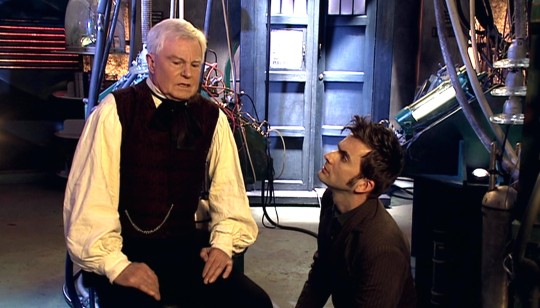
I've rambled about this before, but this shot is some ancient philosopher with his twink boytoy arrangement (think Socrates with Alchibiades or Aristotle with Alexander). Just. Obsessed with the Doctor being in supplicant/trainee position here.
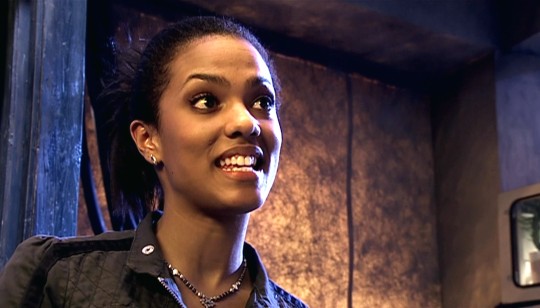
Much binary code has been spilled about how Martha and Jack should be absolutely pissed about the Doctor wanting to "care for" the Master, and rightly so, but the moment Martha realises professor Yana might be a Time Lord is freaking everything. Just look at her. She's forcefully keeping herself from exploding with joy at the idea the Doctor might not be alone anymore, keeping in mind how she actually sat there and listened to him waxing about Gallifrey. It's the same energy she gives when she finds out the Doctor found Rose. I understand the pleasures of vindicativeness but my girl Martha Jones has the emotional capacity of the Pacific. Same goes for Jack. That guy went through everything the Master put him through over the YTNW and still decided his dying words should be letting the Doctor know his husband is out there. Struggling through radiation poisoning to get him a date was the least the Doctor could do in return.
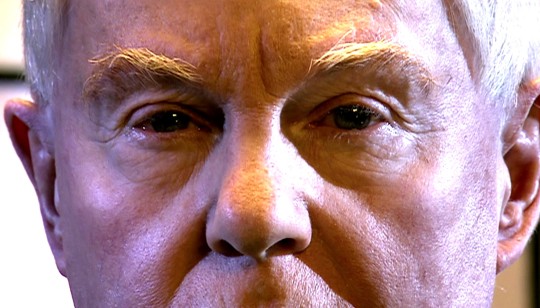
Just sir Derek Jacobi acting porn.
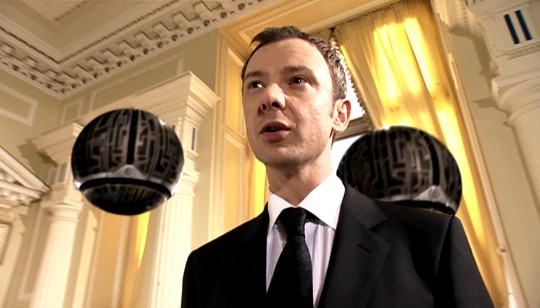
There is a repeating choice in camerawork where the Master is shot from below and the camera turns around him, especially when he's surrounded by the Toclafane. Gives the viewer an excellent sense of vertigo that makes you feel you're inside his crazy pretty head.
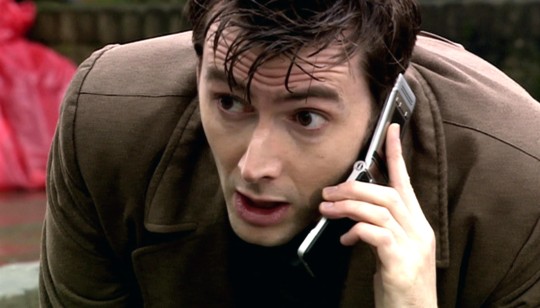
I am absolutely obsessed with visual choices in the TenSimm phonesex scene. Just, the sudden sense of intimacy between them, underlined by the Master taking out his private phone? The Doctor stepping away from Martha and Jack for the talk? The way he conspiratorialy lowers his head for asking the Master out for a date talking about how they might just be together in whatever way, fighting across the galaxies if that's what he wants? Amazing.
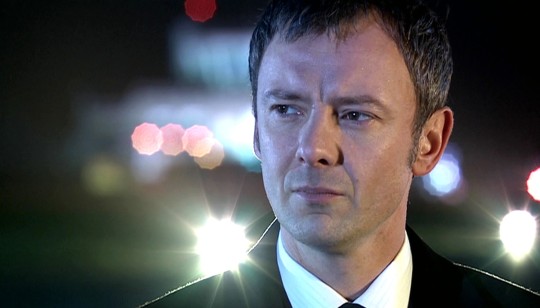
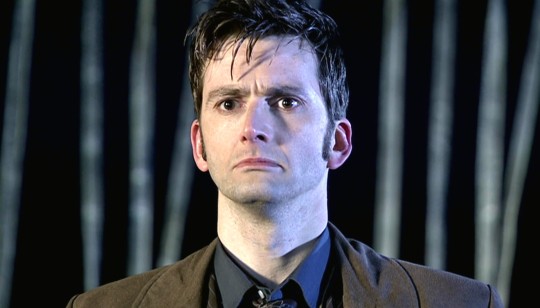
This moment is amazing and not discussed enough probably because the fandom is too busy finding hidden meanings of winning and losing in thoschei context to appreciate what's explicitly laid out before them. Like, you can just tell the Master knows the Doctor's there but still waiting for the proper order of moves in this fucked up game of chess they are playing (and also actually focused on his plan in which the Doctor is just one element and not the focus). Meanwhile, the Doctor's all oozing determination right before he states his claim in the game: I'm not here to kill him. I'm here to save him. That's it. He knows how difficult it will be, but he will win the game by "saving" the Master. Both from others and himself. In this very simple, very explicitly laid out context, the Master dying rather than getting "saved" by the Doctor is... well, let's call it a draw.
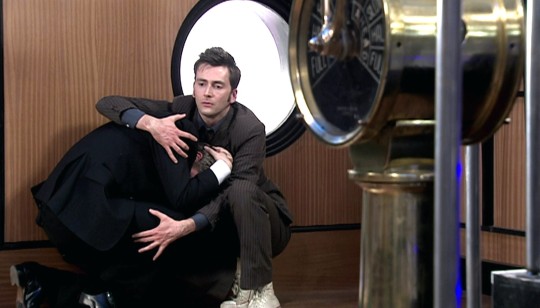
Just an apprecitation of David Tennant's acting here. You can see this does not come easy to the Doctor. You can see he feels the weight of forgiving the Master. You can tell he really did suffer for himself and others like the Christ figure he is over the year. At the same time, the arrangement of his hands on the Master's body is so overwhelmingly protective. He knows what he's about to say is horrible.
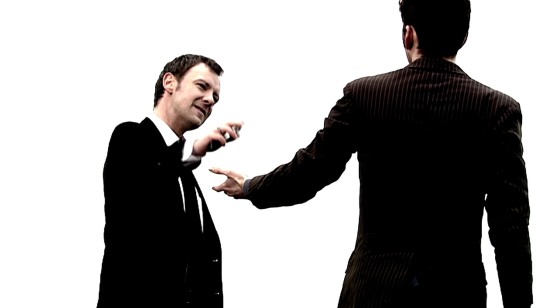
Ok, this scene was backward engineered. RTD just really wanted thoschei to hold hands under his run. There's a reason this moment keeps being giffed as them actually reconciling and that's the author wanting it to feel like this. At the same time, the little alone moment the Doctor and the Master get on the ground is wonderfully crafted. The Master going into grandiose Paul Atreides' He who can destroy a thing has the real control of it mindset while the Doctor just calmly calls his bluff and talks him down because he really does know him. A contrast to the chaos going on oboard the Valiant. Followed by what would be mistaken for aggressive sex in the wild if you got just a teensy bit drunk.
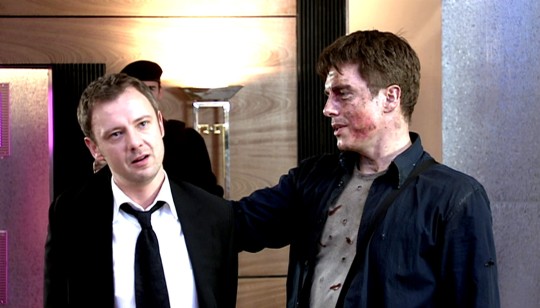
Just appreciation of Jack holding the Master by his collar like a naughty cat that won't let his nails get trimmed :3
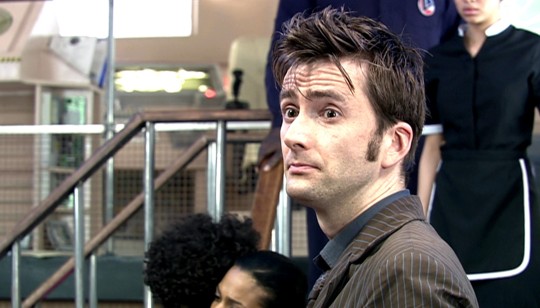
Look at him. Look at the impossible warmth in the Doctor's eyes. This bitch is so freaking hopeful. His mind in already in the space of cuddling with freaking enormous Flemish giant rabbits on Teletubby planet he and the Master are going to engage in.
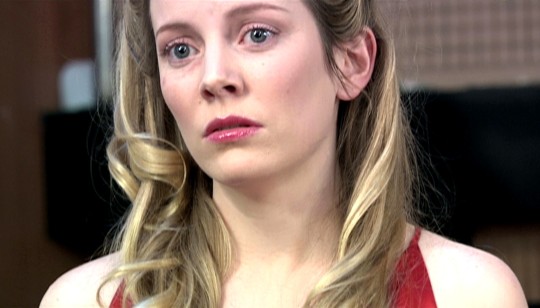
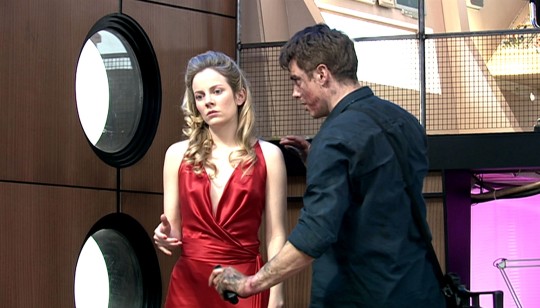
OK, this moment. This moment. Lucy seriously doesn't get due appreciation as a character. Judging from the comments on my "Lucy adopted the Master because he reminded her of her cat" staute more eternal than bronze post, a lot of people don't like the idea she was just hypnotised into working with the Master and quite right too. No, this is a woman who enjoys power, who gets all ears when she's called "the power behind the throne". This is also someone who has witnessed the last remnants of humanity cannibalising themselves into murderballs, abandoning all hope for better future. End of the day, it's all going to end and the end will not be pretty. It's also someone who suffered a year of abuse from someone she actually loved and does not have the 900 years of witnessing all sorts of horrors the Doctor has. But just look at the calmness with which she gives the gun to Jack. She just did what needed to be done. When the Doctor says the Master "corrupted" Lucy, it's... well it's not exactly that he's wrong, but it's not the case of "oh, just an innocent dainty girl who met a bad man", it's more the case of "If you take a life do you know what you'll give? Odds are you won't like what it is". Contrary to what some writers would have it, DW's stance on violence isn't "guns are baaad, m'kay", but it is "once you've ended a life, it changes you as a person", hence aside from "nooo that's mah husband :(" the Doctor stopping Francine killing the Master, while the latter goads her to it, come on, you have it in you, just as I did the first time around way. The Master gave Lucy an opportunity to kill. Now she's just going along with it. Killed by the monster of your own making, if that ain't the story of the Master's life.
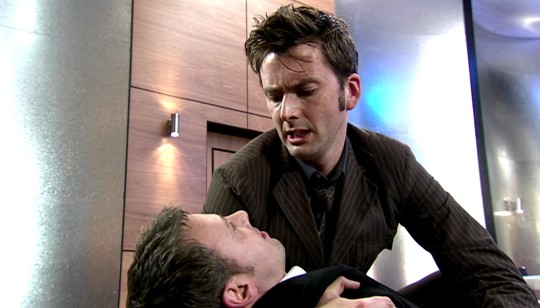
Ok, ok, ok, the pieta. Because this is the freaking pieta, with the Christ figure holding up the Satan figure. How much more blasphemous can you get? How much deeper into the essence of mercy can you get?
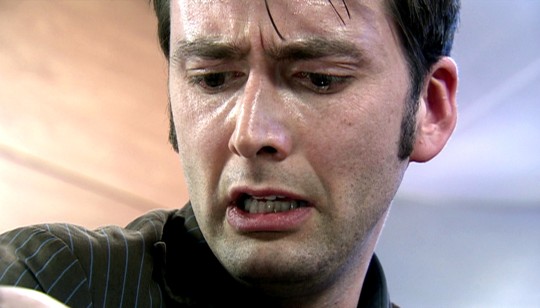
There can never be enough said about the Doctor's reaction to the Master saying he'd rather die than be imprisoned by him. Yes, there's the level at which he has a backup plan AND THAT CANNOT BE EMPHASISED ENOUGH, but from the Doctor's perspective? That's the Master denying everything he is, rather than just granting him the experience of another Time Lord - especially this Time Lord - by his side. That here, thank you mr Tennnat, is pure devastation. It's the one possibility the Doctor never took into account. The one rule of the game he never considered valid.
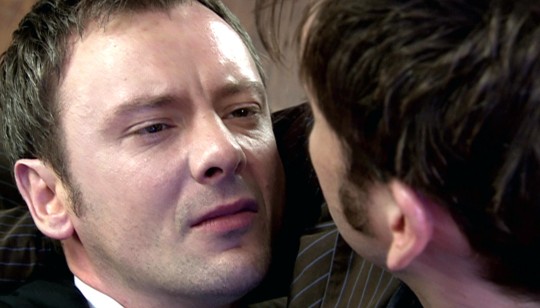
But on the other hand, this here? This here is the Master genuinely surprised and almost sympathetic of the Doctor, on the account of focusing on all the good times they had together, all the times they together achieved things they never could seperately I mean leaving aside the Axon incident being one of the meanest things the Doctor ever did to the Master, tee hee. He seriously never expected the Doctor to hold these memories fondly, to actually think of him fondly. That's the juxtaposition to him enumerating all the times the Doctor's beaten him earlier in the episode. For him, it's always only about the objective winning. For the Doctor, it's been at least partially about the relation. The way his eyes venture of the Doctor's face? That's surprise and sympathy. But of course, not strong enough to change your mind when you do have a plan B.
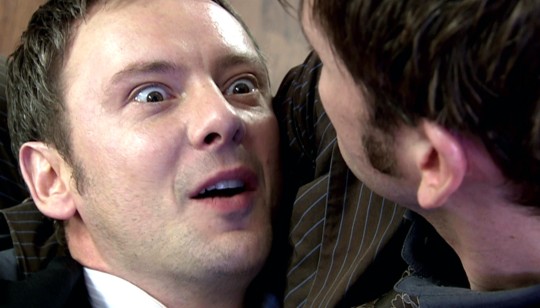
The Master's so playful. So playful when he says the "I win!" line. He knows the Doctor. He knows his stake in the game was to "save him". Dying is the only way left for him to at least not loose. But for the Doctor it became so much more, and he didn't even realise when.
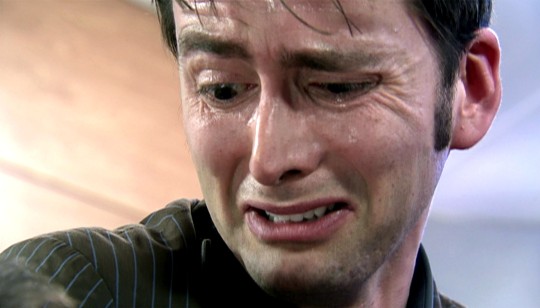
This is the face of the man who wants it to still be a game and still denying just how much real the things are getting. Look at him, he's ready to mirror the Master's playfulness the moment he gets a chance.
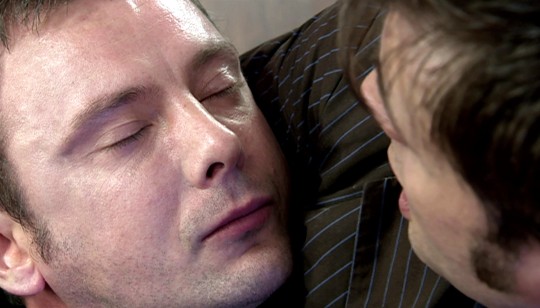
Bless you, mr Simm, for just how bloody peaceful you look here. For looking like you've just had the first peaceful sleep in centuries. You look like a freaking doll.
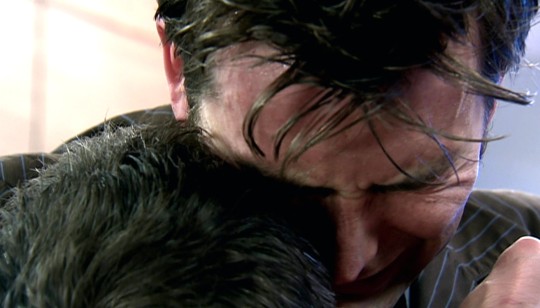
Oh yes, we will appreciate the burying your face in the other's hair here. To quote the brilliant line from a tensimm fic by @theprodigalpragmatist y'all need to read, A mourning wail. A mammal unburdened with consciousness prodding the limp form of its mate and finding no response, crying out to gods it couldn’t conceive of. A defeat.
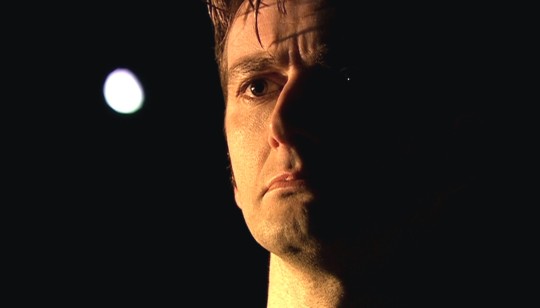
And of course, the downturned lips of mr Tennant mourning and dutifully accepting the Doctor's deepest defeat to date. This man's still thinking of the fun he'd have pressing Flemish gaints' fur to mr Simm's round face.
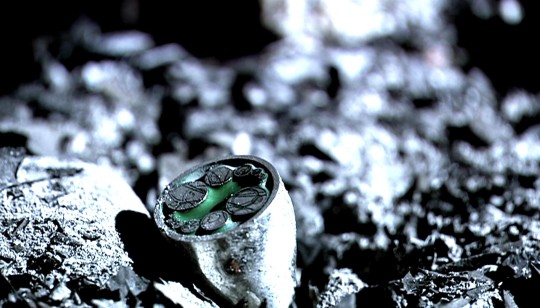
The choice to include the wink to the audience that the Master is in fact just fine right at the moment when Martha leaves and the Doctor is alone in the TARDIS is briiliant. Oh yes, just gimme that God descends to the bottom of hell's frozen lake and finds Satan to pick them up feel.
#hewwo this is roxanne still trying to get her stupid brain to start working#maybe just maybe once she gets through all the layers of 900 yo twinks making out she'll actually produce something#doctor who#doctor who meta#dw meta#utopia doctor who#sound of drums doctor who#last of the time lords doctor who#the doctor#tenth doctor#martha jones#jack harkness#the master#derek jacobi#jacobi!master#professor yana#harold saxon#lucy saxon#simm!master#thoschei#best enemies#doctor x master#tensimm
124 notes
·
View notes
Text
Been thinking about Hosea a lot as I write this analysis on Dutch and Micah.
Maybe I’ll eventually whip something up about him, but for now I’m left with thoughts about knowing that not only is Hosea just as guilty as Dutch when it comes to how their boys were brought up (and continued to be treated through adulthood and ultimately up to their deaths), but also the way the two irreparably damaged John and Arthur’s entire lives beyond even their own comprehension. FURTHERMORE, they set forth a viscous cycle of familial violence and neglect that maintained momentum into the next generation. (See: John and Jack.)
The way Hosea’s action, but more importantly his inaction had in part led to… well, [gestures vaguely to RDR1 + RDR2].
Hosea might have been gentler than Dutch on the surface, but he saw it all, and at times both implicitly and explicitly encouraged it through the meticulous timing of his decisions to remain a “silent watcher.”
Yes, refusal to mitigate the violence makes him complicit, but the matter of the fact is… Hosea can’t even feign partial innocence as a third-party bystander because of how calculated he is in nature.
Additionally, there is no “third party.” Dutch and Hosea are a single unit. They occupy the same space even as two separate individuals in John and Arthur’s lives.
The deliberate nature of Hosea’s inaction puts him in the same position as the “perpetrator” because he isn’t just a watcher, he corroborates directly with Dutch and agrees with what he is doing on principle. He reenforces it in perhaps more subtle ways, but that doesn’t make him any less responsible for the outcome.
The only difference between the two is that while they’re dealing different cards, they are playing the exact same game.
#I’ve got some horrible little headcanons rattling around tbh#Dutch and Hosea have different methods and demeanours but truly are partners in crime not only in the literal sense but also are#one another's accomplice in how they raised/treat John and Arthur.#I think that Hosea gets let off the hook a little too easy and I really enjoy thinking about the implications of his behaviour on the boys#just as much as I enjoy analyzing that of Dutch.#Also??? The way that Arthur seemed to die not realizing this adds layers to it in my head. John had all that time to mull it over and think#after all that had happened with the gang throughout his life and I'm CERTAIN he did a LOT of thinking about when exactly Dutch's#true colours started to shine through over the years... so I'd say its safe to assume that he did a lot of thinking about the pair of them.#I want to know if he is capable of thinking fondly about Hosea in spite of this because he has been dead for a long time#Or does he hold a grudge against him even post-mortem? John at least got to have a conversation with Dutch and see exactly what he's become#I wonder to what extent that perfect image he had of Dutch being tainted caused him to see things clearer than#Arthur was ever given the chance?#Arthur died not knowing but I think John might have the tendency to ruminate on it in the years that followed.#I wonder what conclusions he came to about his life up until that moment while sitting alone in the aftermath.#Was he afraid? Did he even want to unpack all that? To potentially ruin every good thing he'd ever had just because Dutch went off the rail#in the end? If so... what would he have left if it turned out that nothing was ever the way it seemed?#red dead redemption 2#the curious couple and their unruly son#dutch van der linde#hosea matthews#arthur morgan#john marston#red dead meta#paisley.txt
68 notes
·
View notes
Text
I think the reason I got really into gravity falls afterward the og series is because the 'supplementary gravity falls reading' added much more sincerity and vulnerability to gravity falls than the OG series did.
Don't get me wrong, I like the show the way it is. It's not completely cynical or meta, but it's not painfully sincere either. It fits perfectly between shows like Gumball and Steven universe. I'm glad that it fills that niche.
However, the more books came out, the less Alex Hirsch felt the need to undercut some of the most emotional moments. They're still funny, but some of the scenes in tbob hit me with full emotional force of some of the best og gravity falls scenes imo.
It's good to not take yourself too seriously, but it's also good to know when to be serious. I think Alex walked that line better as the years went on.
#funnily enough stan holds all the emotional weight of the og show and i think thats why hes such a beloved character#but the books give so much to ford fiddleford and bill and it just makes the show so much more layered#i really feel like a grew up with the show because i was a little cynical bitch of a teenager when i first watched gravity falls#and now here i am as a painfully sincere adult enjoying tbob#alex hirsch#just thinking about his comments about the last unicorn#i wonder if he still thinks that#gravity falls#meta analysis
88 notes
·
View notes